






By Rebecca Rivas
Of The St. Louis American

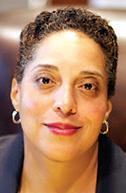
that Rodney Lincoln had brutally murdered her mother, JoAnn Tate, when she was only 7, as well as severely injured her and her younger sister. DeBoer was the only eyewitness in the trial that sentenced him to life in prison. Later, as an adult, DeBoer asked the St. Louis Circuit Attorney’s Office for pictures of the crime scene to give her a sense of closure, but she never received them. In November 2015, she finally saw these images in a television show about Lincoln’s case, and they triggered memories. DeBoer realized that she
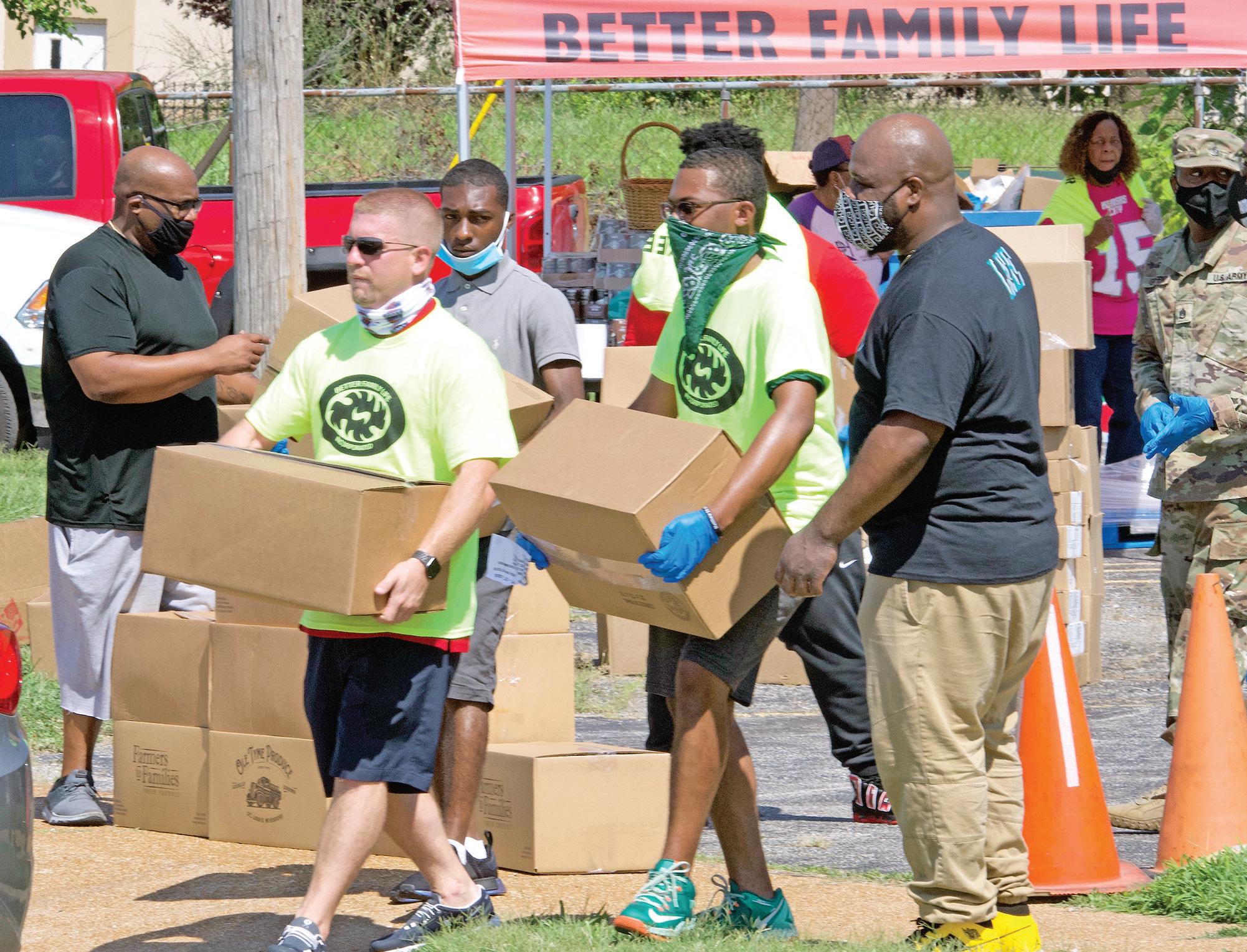
the way back to Union Boulevard.
Jennings Superintendent Art McCoy says it’s risky either way
By Sylvester Brown Jr. Of The St. Louis American
Superintendents from many area school districts have announced plans to reopen on August 24. Considering that Missouri was recently noted for its largest single-day increase of COVID-19 cases, is it wise to bring kids back to classrooms?

One thing we know for sure about COVID-19 is that we don’t know much for sure. We don’t know for sure what percentage of adults and children are asymptomatic. We don’t know exactly how the virus spreads. We don’t know for sure if infected people are immune from reinfection. We don’t know the long-term effects of severely impacted COVID-19 victims. We don’t know if we will ever implement mass testing and quarantining. Yet, with all these unknowns and more, many children are going back to school in a few weeks. Recently, Dr. Deborah Birx, a member of the White House Coronavirus Task Force, in a private phone call to city officials, warned that St. Louis,
Art McCoy See SCHOOLS, A7
Rhode, Dueker deny any wrongdoing, then or now
By Chris King Of The St. Louis American
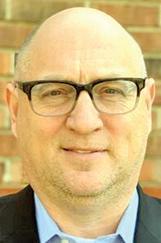

2018 about whether the leases on Northwest Plaza saved the county as much as then-County Executive Steve Stenger had claimed they saved. Ed Rhode and Jane Dueker were two Stenger consultants present at the meetings, where data appears to have been manipulat-
n Access to Medicaid would allow individuals to receive timely preventative and emergency care and not delay life-saving treatments.


Tracy Morgan and wife Megan Wollover call it quits
Actor and comedian Tracy Morgan and his wife Megan Wollover have decided to go their separate ways.
“Sadly, after nearly five years of marriage, Megan and I are filing for divorce. This is a challenging time for all involved, so I ask that you please respect our privacy,” Morgan told PEOPLE.com in statement released through his spokesperson on Wednesday.
34, Malcom, 32, and Tracy Jr., 28, whom he shares with ex-wife Sabina Morgan
Kanye West files for paperwork for presidency, apologizes to Kim
Several outlets are reporting that Kanye West has submitted the proper paperwork and or signatures to appear on 2020 election ballots in New Jersey, Oklahoma, Illinois and Missouri. Kanye missed the deadline to appear on ballots in South Carolina, North Carolina, Nevada, Florida, Michigan, Delaware, Texas, New Mexico and Indiana, putting an electoral college win out of reach.

“We can confirm that Megan filed for divorce yesterday,” a rep for Wollover said in a statement. “This is a private matter for the family. Megan’s primary focus remains the best interest of the parties’ daughter. She asks that the family’s privacy be respected during this difficult time.”
The pair was married one year after Morgan was involved in a near-fatal accident that killed Morgan’s friend, fellow comedian and comedy writer James McNair
The 30 Rock star, 51, and Wollover, 33, share one daughter: 7-year-old Maven Sonae. He is also dad to adult sons Gitrid,
In related news, a source told celebretainment.com that his wife Kim Kardashian West is “broken and absolutely devastated” following remarks Kanye made during his first campaign rally in South Carolina.
He shared private details regarding them exploring the possibility of terminating her pregnancy with daughter North West
“She’s in a bad place, barely sleeping, hardly
eating and shutting off her closest friends,” The source said. “She’s living in constant fear over what he’s going to say or do next.”
Kanye took to Twitter to apologize to his wife over the weekend, admitting he regretted “going public with something that was a private matter.”
“I would like to apologize to my wife Kim for going public with something that was a private matter. I did not cover her like she has covered me,” West said via Twitter. “To Kim I want to say I know I hurt you. Please forgive me. Thank you for always being there for me. (sic).”
Kim had previously described Kanye as a “brilliant but complicated person,” and spoke about his bi-polar disorder publicly for the first time.

‘CiaRuss’ celebrate birth of baby boy has given birth to her third child. She and husband Russell Wilson welcomed a baby boy last Thursday, who they named Win Harrison Wilson. He came in weighing eight pounds and one ounce.
“Happy Birthday WIN!!! ... Mommy & Daddy Love You! ... Win Harrison Wilson ... 7.23.2020 ... 8lbs 1 oz. (sic),” Ciara wrote as a caption of the newborn’s photo that she posted to Instagram. And Russell shared a
post with a matching caption, alongside a photograph of the two of them cradling their new baby Win. Ciara commented under the post: “Love you so much honey. We did it baby! So grateful for our baby boy ... WIN is a blessing. He looks just like you. Daddy’s baby Mommy’s maybe (sic).” Win is the second child for the couple. They have a daughter Sienna together and Ciara has a son, Future, from her previous relationship with the rap star of the same name.
Nick Cannon pledges ‘Masked Singer’ salary to Holocaust
Last week Nick Cannon apologized to the Jewish community for making antisemitic remarks on his Cannon’s Class podcast with special guest Professor Griff, formerly of Public Enemy According to a report from jewishinsider. com, Cannon visited the Wiesenthal Center’s Museum of Tolerance. Cannon reportedly promised to donate his first paycheck from season four of “The Masked Singer” to the Holocaust museum following his sit-down with Rabbi Abraham Cooper Cannon was fired by ViacomCBS for the remarks, but he retained his hosting gig on the Fox Network singing competition.
Sources: Celebretainment.com, Twitter.com, Instagram.com, People.com




































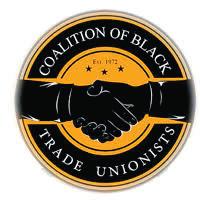

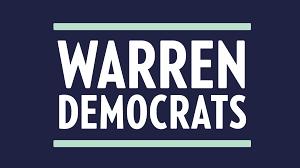








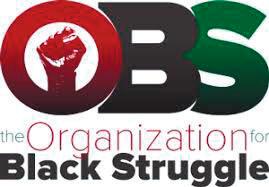
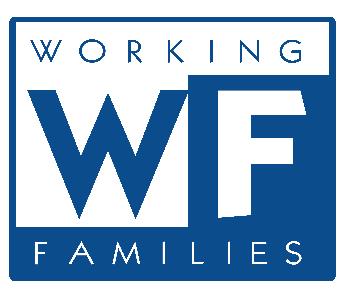
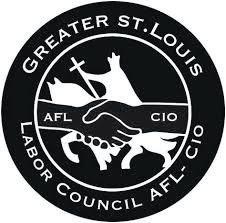
Dr. Sam Page is interim St. Louis County executive, serving a term that expires at the end of 2022. He was voted into this interim position by the County Council, which he was chairing as councilman for District 2 at the time of Steve Stenger’s resignation as county executive last April. Rather than serve out the rest of Stenger’s term, the County Charter calls for the appointed interim county executive to face the voters in the next general election. Looking at the candidate field and taking into account the county’s deepening Democratic majority, we can say with confidence that the winner of the Democratic primary for county executive on August 4 will be elected county executive on November 3 and be inaugurated at the first of the year.
That means if Page were to lose the primary, he would be a lame duck county executive for the next five months. Not only is that nearly 20% of the rest of Stenger’s unexpired term, but it also is a very crucial five months. St. Louis County is facing a surging pandemic that has crippled the economy, and now schools are finalizing plans to resume education under uncertain and perilous conditions. We believe the only reason to vote for Page to be reduced to a lame duck status for these critical five months — the only reason to vote against Page on August 4 — would be if Page’s tenure as county executive to date had been a disaster and if one of his challengers were a proven leader. Page took office from a corrupt fraud who left the county in turmoil, and he was hit by an unprecedented pandemic after less than a year in office. Under trying circumstances at best, his performance has not been perfect by any means, but it has not been a disaster. Certainly, his performance to date would not warrant voting him into lame duck status for five months only to take a chance on an unknown quantity for two years of an unexpired term, knowing that the last of those two years will be embroiled in yet another campaign for office.
Two of Page’s challengers are complete unknowns politically. Neither Jamie Tolliver nor Mark Mantovani has ever held political office. Mantovani — whom we endorsed over Stenger in 2018 — touts his success in business as evidence that he would succeed in political office, but in fact he is an untested unknown. We also were disturbed to see that he retained as his cam-
paign manager in this campaign cycle Patrick Lynn, who comes from the same campaign operation that elected Stenger and St. Louis Mayor Lyda Krewson. Former Stenger operatives are pushing for him through the ChangeSTL PAC. Mantovani’s endorsement by the police association further convinces us that he has drifted from an anti-Stenger to a conservative candidate at a time when the county is showing progressive political potential. Mantovani has sound criticisms of some of Page’s failures in leadership — Page has not successfully catalyzed and united a fragmented county — but we see more hope in working with Page’s known shortcomings than taking a leap of faith on the unknown Mantovani, especially given the campaign company he is keeping.
Page also is being challenged from the left by Jake Zimmerman, currently the county assessor. Zimmerman has a good political track record, including eight years now of running a countywide office of scale, but we don’t believe he promises enough improvement on Page’s potential to vote for five months of a lame duck on August 4. Zimmerman, like Mantovani, has sound criticisms of Page’s shortcomings; Page was slow to put COVID-19 testing sites in North County and his appointees to the police board bungled the process to replace Police Chief Jon Belmar with the kind of transformative and credible police leader the county needs now. But Zimmerman has made no transformational changes in the office he currently runs that would convince us he would govern on issues of inclusion better than Page. Again, we think working with Page’s known weaknesses — and strengths — is preferably to taking a chance on Zimmerman for the rest of this unexpired term.
We believe Sam Page has shown enough potential under extraordinarily difficult conditions to warrant a promotion from interim to actual county executive, especially given the enormous opportunity costs of voting him into lame duck status for the rest of this tumultuous 2020. His challengers have pointed out some areas where he needs to work and develop, and we will hold him accountable for making definite improvements in the next two years, which should be his to govern. We endorse DR. SAM PAGE FOR ST. LOUIS COUNTY EXECUTIVE
Eric Schmitt has disgraced the office of Missouri attorney general since his appointment by Gov. Mike Parson, and defeating him in November should be one of the main priorities in this election year for people who want to see criminal justice reform and simply good government in Missouri. Voters are blessed to have two eminently qualified and passionate progressive Democrats on the August 4 primary ballot. Elad Gross and Rich Finneran are indeed two of the best candidates for Missouri attorney general we have ever seen. While either would be a capable leader and progressive change agent in this important office, we have our eye on November 3 and who would be best equipped to defeat Schmitt. Both are equally qualified first-time candidates with no statewide name recognition, so electability is the deciding factor. Gross has an extremely youthful appearance compared to
Finneran, who looks like an attorney general straight out of Central Casting, and superficial factors like physical appearance can be telling to voters. More importantly, Finneran has more than doubled Gross in fundraising though Gross announced his campaign nearly a year before Finneran did. While we believe Gross’ many grassroots donors would readily switch their allegiance to any Democrat battling Schmitt, we are less confident that the deeper pockets that support Finneran would have the same confidence in Gross’ ability to topple a Republican incumbent with the established name recognition that the Democrat will need to buy in advertising before November. We believe Elad Gross would be a dynamic attorney general and encourage him to maintain his inexhaustible commitment to the public good, but we strongly endorse RICH FINNERAN FOR ATTORNEY GENERAL
Rochelle Walton Gray gave us something to celebrate in the Democratic primary for St. Louis County Council 4th District in 2016 when she crushed the veteran incumbent Mike O’Mara by more than 4,000 votes, opening the way for committed Black representation in the northernmost neighborhoods in North County; she then won the general election by an even greater margin with nearly 75% of the vote. On the council, she has been a strong voice for criminal
justice reform, minority inclusion and equitable development, fighting to dedicate portions of tourism taxes and Riverboat Casino monies to North County. With a degree in Public Policy Administration, she is the only candidate with legislative experience. We both expect and urge voters to retain her experience, commitment and grit representing the 4th District. We strongly endorse ROCHELLE WALTON GRAY FOR ST. LOUIS COUNTY COUNCIL DISTRICT 4.
Nicole Galloway for Missouri governor
Rich Finneran for Missouri attorney general
Yinka Faleti for Missouri secretary of state
Yes on Amendment 2
Wm. Lacy Clay for Missouri’s 1st Congressional District
Jill Schupp for Missouri’s 2nd Congressional District
Michelle Sherod for Missouri’s 5th Senatorial District
Tommie Pierson Jr. for Missouri’s 13th Senatorial District
Darryl Gray for Missouri’s 77th House District
Rasheen Aldridge Jr. for Missouri’s 78th House District
Kimberly Gardner for St. Louis circuit attorney
Tishaura O. Jones for St. Louis treasurer
Vernon Betts for St. Louis sheriff
By state Senator Brian Williams For The St. Louis American
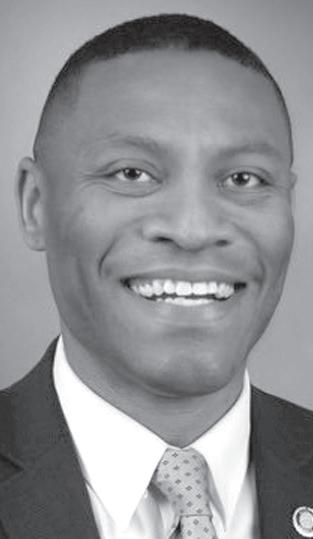
Brian Williams
The latest series of racial violence across America dealt a much-needed gut check to the nation and forced leaders to consider if their current policies would prevent the next tragedy from ensuing. For instance, is Missouri doing everything we can to hold police officers accountable? Are we reassuring Missourians that communities are being policed in a manner that reflects their distinct values?
What “policing” should look like is possibly the most exhaustive decision any state can make, and it is a responsibility I take personally.
Growing up in Ferguson, I endured the humiliation of being racially profiled. I cannot help but see myself in Mike Brown and countless others whose lives have been snatched by those sworn to protect them. Missouri has a long road ahead to refine the checks and balances between local officers and communities. Several neighboring states have introduced bills to improve police oversight and accountability after the death of George Floyd and Breonna Taylor, and Missouri must follow suit. Hence, I developed a comprehensive policy agenda to move the needle on accountability and fostering community trust during the upcoming special session. My agenda was inspired by the Justice in Policing Act of 2020, legislation composed by Congressman
Wm. Lacy Clay and U.S. Senators Kamala Harris and Cory Booker to address the unequal treatment of Black Americans by law enforcement. My legislative agenda was also inspired by numerous conversations with local activists, observations from other state legislators, and state Auditor Nicole Galloway’s statewide vision for accountability and transparency.
First, Missouri must outlaw chokeholds and no-knock warrants that have led to the death of far too many unarmed Black Americans. These procedures are obsolete and inhumane, and we must terminate their use in Missouri.
If Iowa can unanimously ban chokeholds and U.S. Senator Rand Paul can lead the national call to outlaw no-knock warrants, Missouri can surely find common ground on these measures. And Missouri should follow New Mexico and make police body cameras mandatory statewide.
Next, Missouri needs a Civil Rights Accountability Board within our Office of Attorney General to investigate officerinvolved shootings, in-custody deaths, and denote prosecution violations by law enforcement officers. Again, several states have already established these independent boards to forbid law enforcement agencies from policing themselves.
The board – composed of diverse voices from Civil Rights activists and law enforcement community – will be granted subpoena power to inspire public trust and mitigate the perception of investigators covering for their friends and colleagues.
Further, my proposal allows cities and counties to establish a civilian review board to investigate allegations of misconduct by local law enforcement offi-
Not only SLATE is incompetent
Thanks to James Sahaida for his letter about SLATE. I know James from when I worked for the state and he is spot on when he said, “Figures don’t lie, but sometimes those doing the figuring do.”
It isn’t just happening at SLATE it’s across the state. I worked for the state agency responsible for Missouri’s Workforce system for 15 and a half years and I’ve seen the figures manipulated to ensure outstanding performance is reported. Don’t believe me?
Send a Freedom of Information request to the Department of Labor inspector general for complaints on the Division of Workforce Development. They have plenty of them. State monitors find the same issues every year across the state, yet little to nothing is done. A Sunshine requests to the Office of Workforce Development will prove what I say is true.
It’s not just SLATE that has incompetent management and high staff turnover; the state Central Office for Workforce Development also has high turnover. Staff can’t stomach the things they have to do to keep their job, so they find another. Staff that speak out are terminated for vague, trumpedup allegations
Edward Greenslit, Jefferson City
What if? What if? What if?
If a teacher tests positive for COVID-19, are they required to quarantine for 2-3 weeks? Is their sick leave covered, paid?
If that teacher has 5 classes a day with 30 students each, do all 150 of those students need
cers towards the community. The local boards will have the power to investigate and recommend disciplinary action for alleged misconduct involving excessive use of force, abuse of authority, discourtesy, or use of offensive language. My proposal also calls for a mandatory review of the Peace Officer Standards and Training Program training materials to review the licenses of law enforcement basic training centers and instructors. This process will certify that our law enforcement training curricula follows national best practices in community policing and deescalation tactics. Now is the time for leaders to explore every potential risk to our communities stemming from how we police. It is my hope that Gov. Mike Parson holds this same moral conviction and consider these measures as part of a comprehensive discussion on violence and crime. If the governor declines, I will formally extend invites to the appropriate chairs to have field hearings in my community to ensure these issues are deliberated.
Sadly, Missouri does not have the policies in place to prevent the next Sandra Bland or Eric Garner. And despite the lingering pain of Mike Brown, we still have not fostered a policy environment to inhibit this dark fate from happening again to someone who looks like me. Our vision for policing should reflect our values, and Missouri must be better. And thanks to the leadership of Congressman Clay and Auditor Galloway, and the countless voices from the community, we have a sound, actionable path forward to achieve this.
Brian Williams represents Missouri’s 14 Senatorial District in North St. Louis County.
All letters are
and
to then stay home and quarantine for 14 days?
Do all 150 of those students now have to get tested? Who pays for those tests? Are they happening at school? How are the parents being notified? Does everyone in each of those kids’ families need to get tested? Who pays for that?
What if someone who lives in the same house as a teacher tests positive? Does that teacher now need to take 14 days off of work to quarantine? Is that time off covered? Paid? Where is the district going to find a substitute teacher who will work in a classroom full of exposed, possibly infected students for substitute pay?
Substitutes teach in multiple schools. What if they are diagnosed with COVID-19? Do all the kids in each school now have to quarantine and get tested? Who is going to pay for that?
What if a student in your kid’s class tests positive? What if your kid tests positive? Does every other student and teacher they have been around quarantine? Do we all get notified who is infected and when? Or because of HIPAA regulations are parents and teachers just going to get mysterious “may have been in contact” emails all year.
Michael Meehan, St. Louis



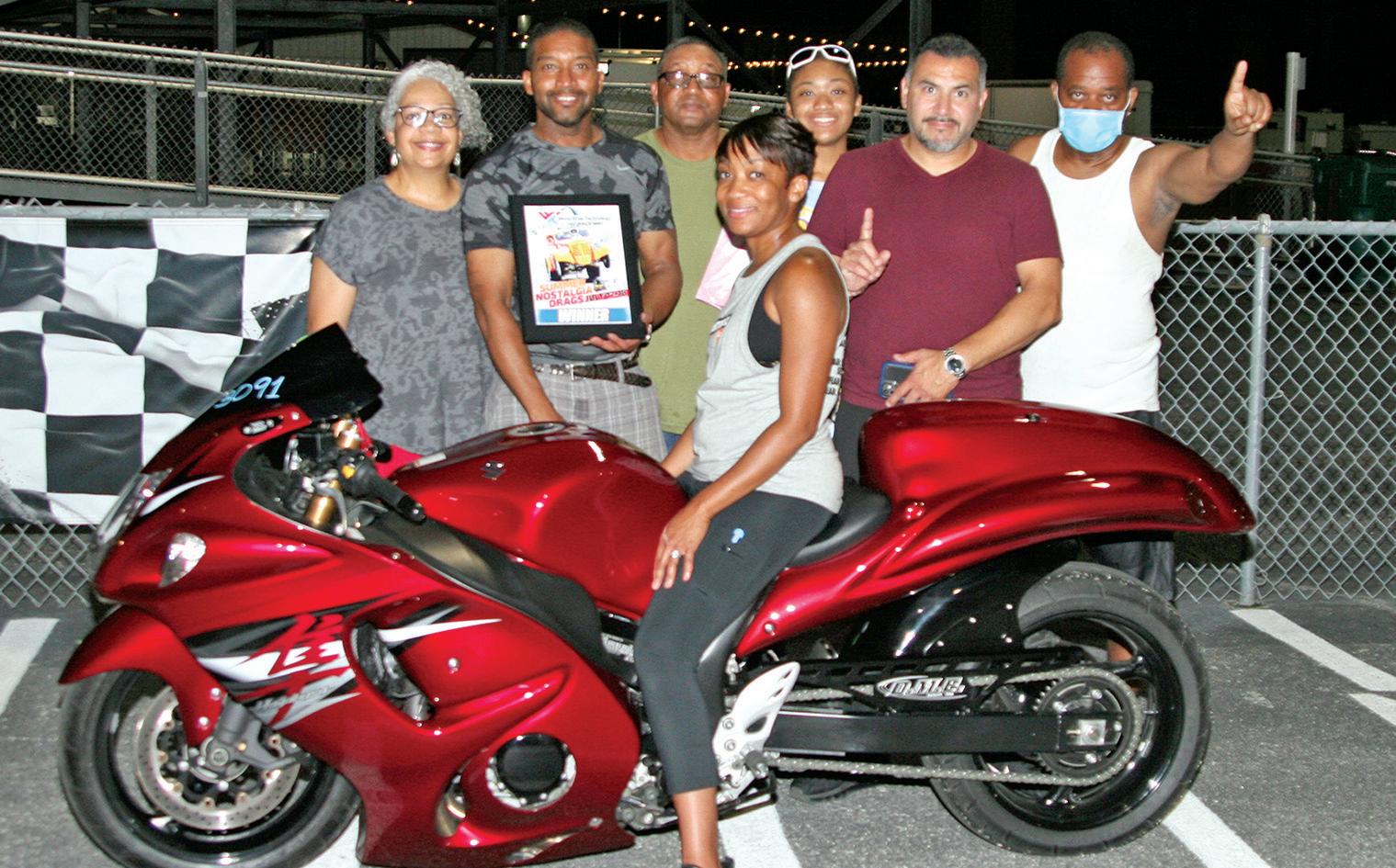
Scott Leonard of
International Institute of St. Louis began offering limited in-person appointments on July 13. Office hours are 8:30 am4:30 pm weekdays. Building entrances are locked, even when the institute is open. Office spaces are rearranged and now include appropriately distanced desks with sneeze guards. Sanitation stations are positioned throughout our service areas. All staff wear masks in common areas and for appointments.
Appointments are required to meet occupancy requirements and ensure proper sanitation. Only those with appointments will be admitted. Clients and visitors are required to wear a mask or face covering inside the building. Extra masks will be available at the front desk. Contact your individual case worker or department staff at (314) 773-9090 to request an appointment or schedule remote services.
St. Charles installs drop boxes for bill payments
The City of St. Charles and St. Charles County installed drop boxes for residents to submit bill payments and other items. The secure boxes are located on a drive-up island on Second Street in St. Charles and provide an alternative to entering government buildings. They replace payment boxes located in front of the buildings.
The island is located between St. Charles City Hall at 200 North Second Street and the St. Charles County Administration
Building at 201 North Second Street and became available for public use on Wednesday, July 29.
The items that can be submitted are bill payments (City of St. Charles) and real estate and personal property tax payments, personal property assessment forms, and original permit bonds (St. Charles County). For questions, call the City of St. Charles at 636-949-3200 or St. Charles County at 636-949-7900.
By Alderwoman Sharon Tyus
The St. Louis American
For
I am a supporter of Circuit Attorney Kimberly Gardner. As a former criminal trial attorney with the Public Defender’s Office I appreciate her commitment to being the type of circuit attorney our professional standards mandates.
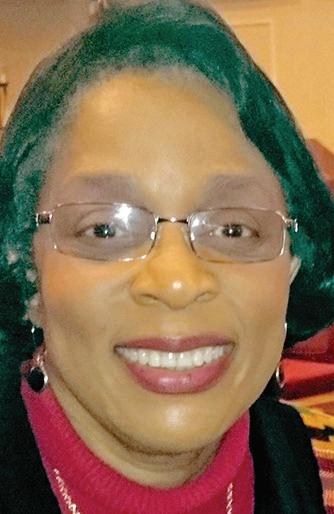
Circuit Attorney Gardner is working to expand the traditional role of the prosecutor and utilize a broader set of tools with law enforcement, community, judges and social service stakeholders to find innovative solutions to address violent and serious crimes. She is also committed to finding opportunities to help at-risk young people become productive members of our community and avoid being drawn into the life of crime. Gardner is committed to engaging citizens throughout the community in a criminal justice system that promotes trust, accountability and transparency.
n Circuit Attorney Gardner is working to utilize a broader set of tools with law enforcement, community, judges and social services to find innovative solutions to crime.
The American Bar Association (ABA) is a national legal organization founded in 1878, with over 400,000 members. It publishes “Criminal Justice Standards for the Prosecution Function,” a guidance for the professional conduct and performance of prosecutors, and these standards are intended to be consistent with the ABA’s Model Rules of Professional Conduct. According to the ABA, the prosecutor is an administrator of justice, a zealous advocate, and an office of the court. The primary duty of the prosecutor is to seek justice within the bounds of the law, not merely to convict. The prosecutor should be knowledgeable about, and consider, and where appropriate develop or assist in developing alternatives to prosecution or conviction that may be applicable in individual cases or classes of case. The prosecutor should seek to reform and improve the administration of criminal justice, and when inadequacies or injustices in the substantive or procedural law come to the prosecutor’s attention, the prosecutor should stimulate and support efforts for remedial action.
This is exactly what Circuit Attorney Kim Gardner has been attempting to do, and some of the many reasons I support her.
Sharon Tyus is alderwoman of St. Louis’ 1st Ward.
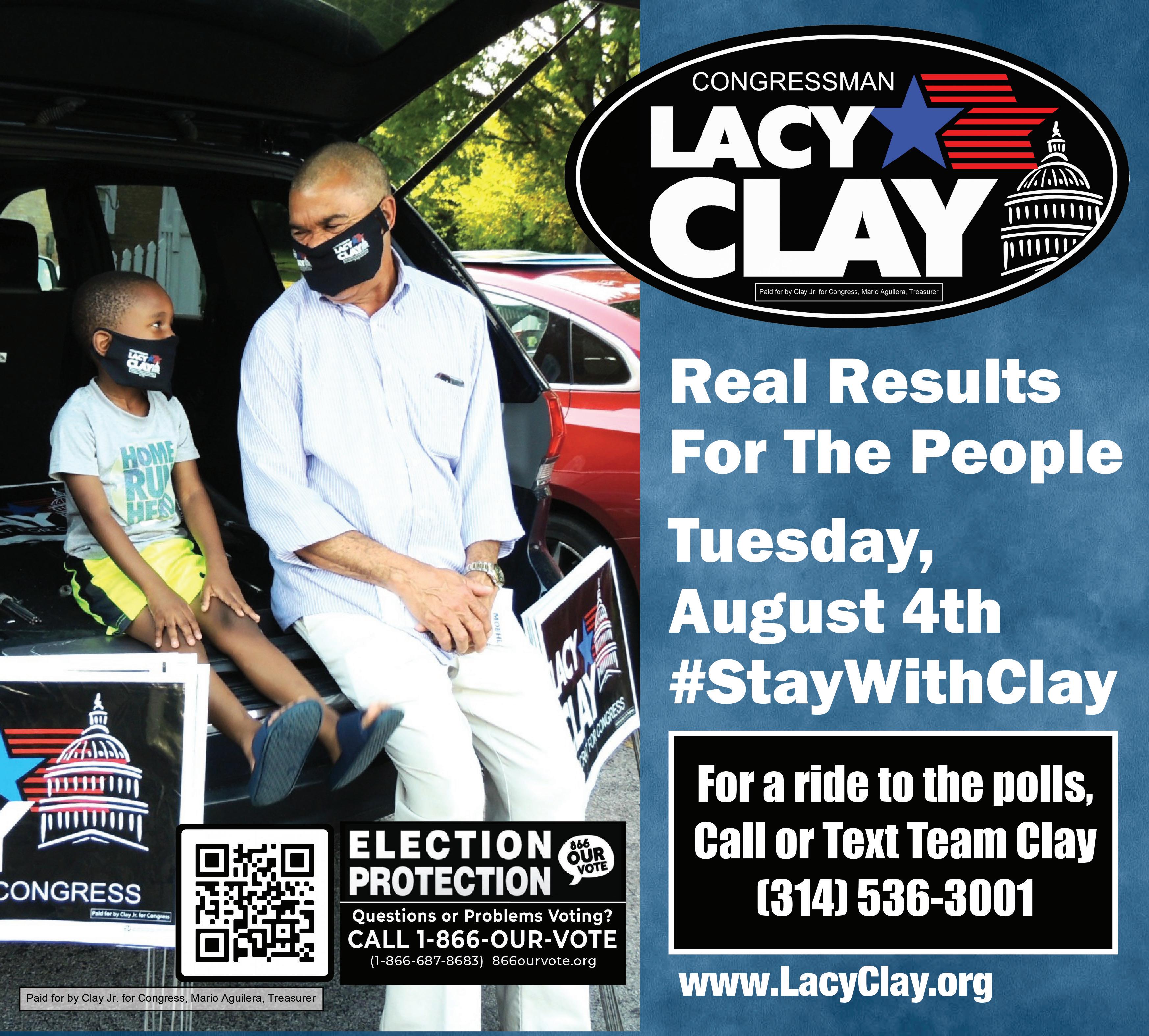
ed in an effort to align with Stenger’s previously inflated estimate of savings. Rhode and Dueker have both been paid in recent months by ChangeSTL, a political action committee (PAC) working to elect Mark Mantovani as county executive.
Stenger has since pleaded guilty and been sentenced to federal prison for corruption on other county deals. This affidavit and statement were the basis of the council Ethics Committee’s efforts to obtain testimony from the developers of Northwest Plaza last year concerning the 2018 meetings. The renegotiation of the leases at Northwest Plaza are the subject of an ongoing mediation process between the County Council and the individuals who profited off the Northwest Plaza leases, who were Stenger’s largest campaign donors. Trakas said the mediation has been stalled by the COVID-19 pandemic.
Stenger. Rhode and Dueker both denied any wrongdoing at these meetings in 2018 or in consulting on the current election. Rhode said he has no interest in working in county government if Mantovani is elected. Dueker, who is herself a lawyer, said she will retain counsel because of Trakas’ suggestion that she might have engaged in criminal activity while consulting for Stenger and have corrupt motives for trying to elect Mantovani.
n “We know that the actions of Stenger and some of his senior officials were criminal — is there potential that Dueker and Rhode’s actions were, too?”
– County Council Chair Lisa Clancy
Trakas told The American that the affidavit and statement provide new information on the Stenger administration that could lead to further investigation into the leases and the efforts by Stenger, staff and consultants to make reports about the lease match up with Stenger’s previous claims about it. The affidavit and statement have been referred to the federal prosecutor who led the prosecution of
Continued from A1
Continued from A1 millions of dollars of federal funds on the table.
Mantovani claimed that the PAC that has paid Rhode and Dueker is independent of his campaign and that he is not responsible for anything anyone did before they worked to elect him.
Mantovani said that “the timing of this revelation is calculated by the Page campaign to affect the election.”
Trakas said he thinks the public should know this information before they vote on August 4, so the timing was, in fact, calculated based on the election.
Mantovani’s campaign is managed by Patrick Lynn, who worked on Stenger’s campaigns with the Kelley Group. The Kelley Group also managed the successful mayoral campaign of St. Louis Mayor Lyda Krewson. Neither Lynn nor anyone from the Kelley Group are named in the affidavit or statement or have been charged with any crimes connected with Stenger.
“It is concerning and deeply unfortunate that Mark Mantovani is soliciting contributions and advice from
Low-income populations are disproportionately affected by cardiovascular disease. Therefore, having Medicaid provides them access to providers, cardiac tests, and medications. For example,
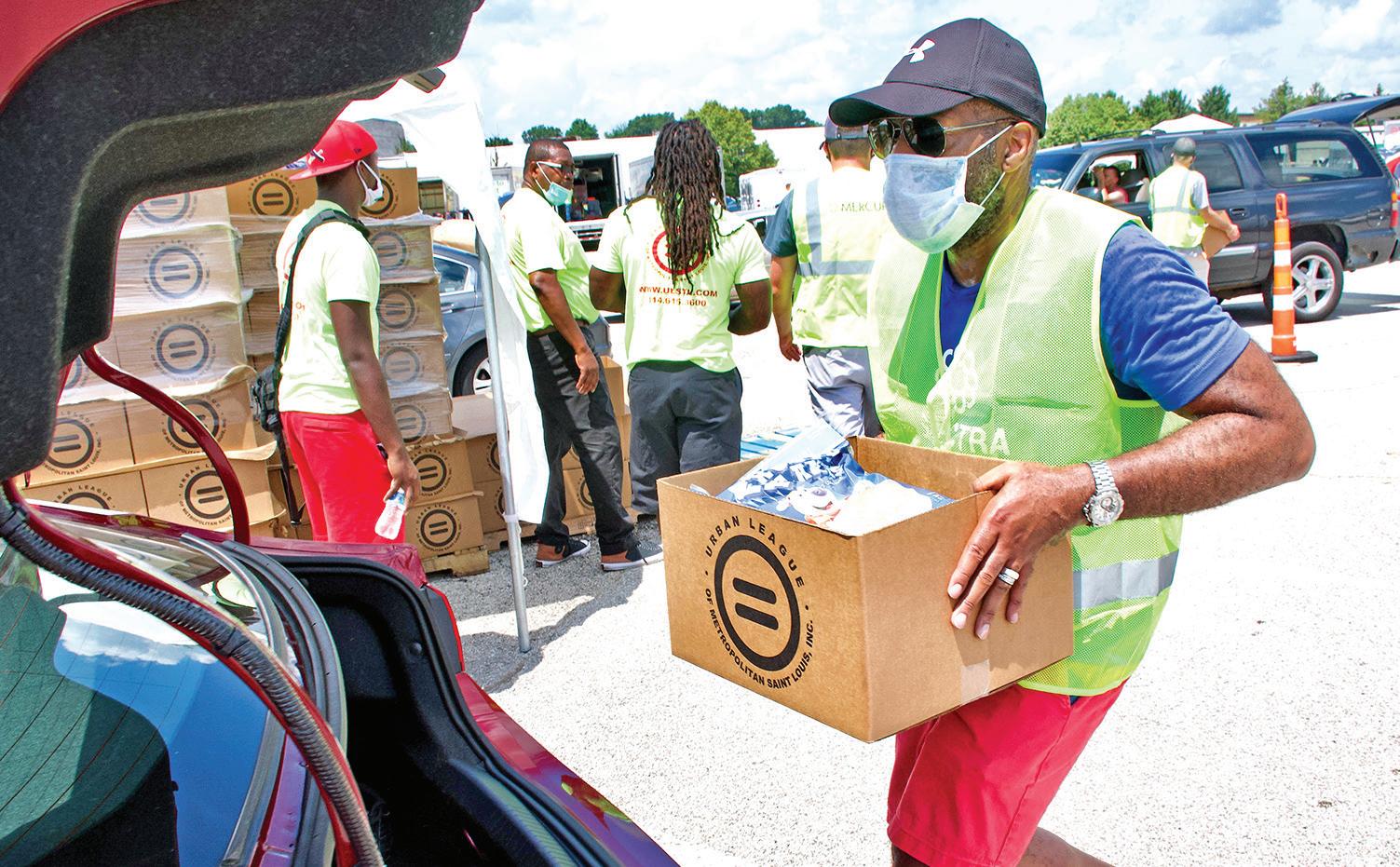
by
the same people that elected Stenger and benefited from his corruption,” Trakas wrote in a statement.
Trakas asked for County Council Chair Lisa Clancy to hold meetings about the affidavit or statement after the August 4 primary, when Mantovani, interim County Executive Dr. Sam Page and two other candidates will compete for the Democratic nomination to complete Stenger’s unexpired term as county executive. Page was voted interim
delaying treatment for an acute stroke can result in significant disability or death. With insurance, individuals can see their primary care provider regularly to discuss ways to reduce their risk of strokes and
county executive by the County Council after Stenger resigned in April 2019. Clancy told The American that she was disturbed by the documents and shares Trakas› concerns about Rhode and Dueker.
“While I trust that by now the public has a good understanding of the corruption of Steve Stenger, he didn’t act alone,” Clancy said.
Indeed, one of the people sentenced to prison along with Stenger for his corrupt
heart attacks. In 2018, 48% of the U.S. adult population had at least one heart-related condition.
About a year ago, a patient presented to the clinic for a routine visit to discuss her dia-
schemes, Bill Miller, was present for the meetings about the Northwest Plaza leases discussed in the documents.
Miller’s plea bargain quotes statements he made in October and November 2018 that were recorded by a cooperating witness. These documents produced by Trakas report on meetings from January and February of 2018, possibly before the feds had a cooperating witness recording Stenger, Miller and others.
“It’s important that
betes and high blood pressure. She happened to mention that she had been feeling more fatigued lately, unable to complete tasks as before. Due to her extensive risk factors for cardiovascular disease, I rec-

the actions of people like Jane Dueker and Ed Rhode rise above the radar, especially since there is evidence that they are continuing to try to infiltrate county government with their own brand of greed and ego, often at the expense of taxpayers,” Clancy said.
“We know that the actions of Stenger and some of his senior officials were criminal — is there potential that Dueker and Rhode’s actions were, too?”
ommended that she proceed with further testing, such as a stress test. The stress test was abnormal. The patient underwent a cardiac catheterization, which showed multiple blockages in her arteries. As a result of the significant arterial blockages, the patient required surgery, a coronary artery bypass graft. Such testing and the subsequent multiple doctor’s visits could not have been accomplished without health insurance. Voting yes on Amendment 2 also allows our Missouri neighbors to have access to cancer screens such as colonoscopies, mammograms, and pap smears. Colorectal cancer is the third leading cause of cancer-related deaths in men and women in the United States and is expected to kill around 53,000 people in 2020. Compared to all other racial groups in the U.S., African Americans have the highest incidence and mortality rates of colorectal cancer per the American Cancer Society. Therefore, early detection with a colonoscopy or other screening modalities are recommended. Average cost of a colonoscopy is approximately $3000. Imagine having to pay that fee without insurance.
Disparities also exist in breast cancer diagnosis and treatment. Breast cancer is the second-leading cause of cancer deaths in women. Black and white women are diagnosed at the same rate but black women are more likely to die of breast cancer. Lack of insurance and lack of access to the most current treatments are some of the many reasons for this inequity. Having health insurance through Medicaid would allow women to have their recommended mammogram on a regular schedule. Early detection is key to survival. Furthermore, Medicaid expansion also provides a lifeline to many of our rural communities. Several Missouri rural hospitals have already had to close as a result of budget shortfalls. Residents of those communities sometimes have to drive hours just to see a specialist.
On August 4, let’s support our fellow Missourians and vote yes on Amendment 2 to expand Medicaid.
Denise Hooks-Anderson, M.D., FAAFP, is associate professor at SLUCare Family Medicine and the medical accuracy editor of The St.
Continued from A1
had identified the wrong man as a child.
On December 4, 2015, she went to speak with St. Louis prosecutors and gave them an affidavit, recanting her testimony against Lincoln. This move by DeBoer was particularly significant because in 2011, DNA testing determined that the hair evidence the Circuit Attorney’s Office had used to convict Lincoln didn’t actually come from him. So, the case completely hung on DeBoer’s testimony.
“I had known these people most of my life,” DeBoer told The American. “I trusted them infinitely. I never dreamed in a million years that they would be the source of my revictimization and trauma.”
DeBoer had never met then-Assistant Circuit Attorney Mary Pat Carl, but she knew instantly from meeting her that the December meeting wasn’t going to go the way she had hoped.
Carl told The American that she had no involvement in the case other than to be fresh eyes and ears during this meeting.
According to a video of this interview, Carl looked at the affidavit and told DeBoer, “They can’t all be your words, right?” Carl said that she had been working as a prosecutor for 13 years, including on cases of domestic violence and sex crimes. She was familiar with the “merger of what happens when a layperson who doesn’t write in legalese and someone who is an investigator and does, it ends up being a shared grouping of words,” Carl told her.
DeBoer said several times that they were her words, but Carl pushed back. DeBoer is a retired U.S. Navy veteran, a former defense contractor whom the U.S. government gave security clearance, and also has a degree in criminal justice.
“It was an intimidation tactic,” DeBoer told The American. “It was an abuse of her power and position. She questioned how I wrote, my
Continued from A1
along with 10 other cities, must take “aggressive” steps to stem outbreaks due to alarming increases of coronavirus.
In mid-July, Jennings Superintendent Art McCoy spoke with KSDK about his plans to start summer school just one day after the city reported its highest single day total of COVID-19 cases. McCoy told The American that the population his district serves face social, health and economic epidemics that are just as harmful as COVID-19.
“We want to provide something for children who are in neglect situations if they don’t have caring adults to take care of them,” McCoy said. “We have court-adjudicated students coming in, we have foster care students and, of course, general workers and first responders who need childcare.”
Reopening Jennings schools, McCoy said, is about meeting the immediate needs of the community he serves.
“We have kids facing anxiety, depression and trauma from changing behaviors, from basically being in seclusion for a month or two,” McCoy said. “We have parents who’ve said, ‘My kid is depressed. They can’t sleep. They’ve started to talk weird. They say they want to hurt themselves’ and so forth.” McCoy said it’s imperative that educators move at “the speed of the need” to provide safe options for all students.
“We have to be courageous, knowing that everything is going to be a pilot,” he said. “So why not start early and do something?”
McCoy said he is not advocating for the reopening of all Missouri schools. “Not every leader is competent enough to run a (school) building in this climate,” he said, “without the right education, preparation or, most important, conversations with health professionals and physicians.”
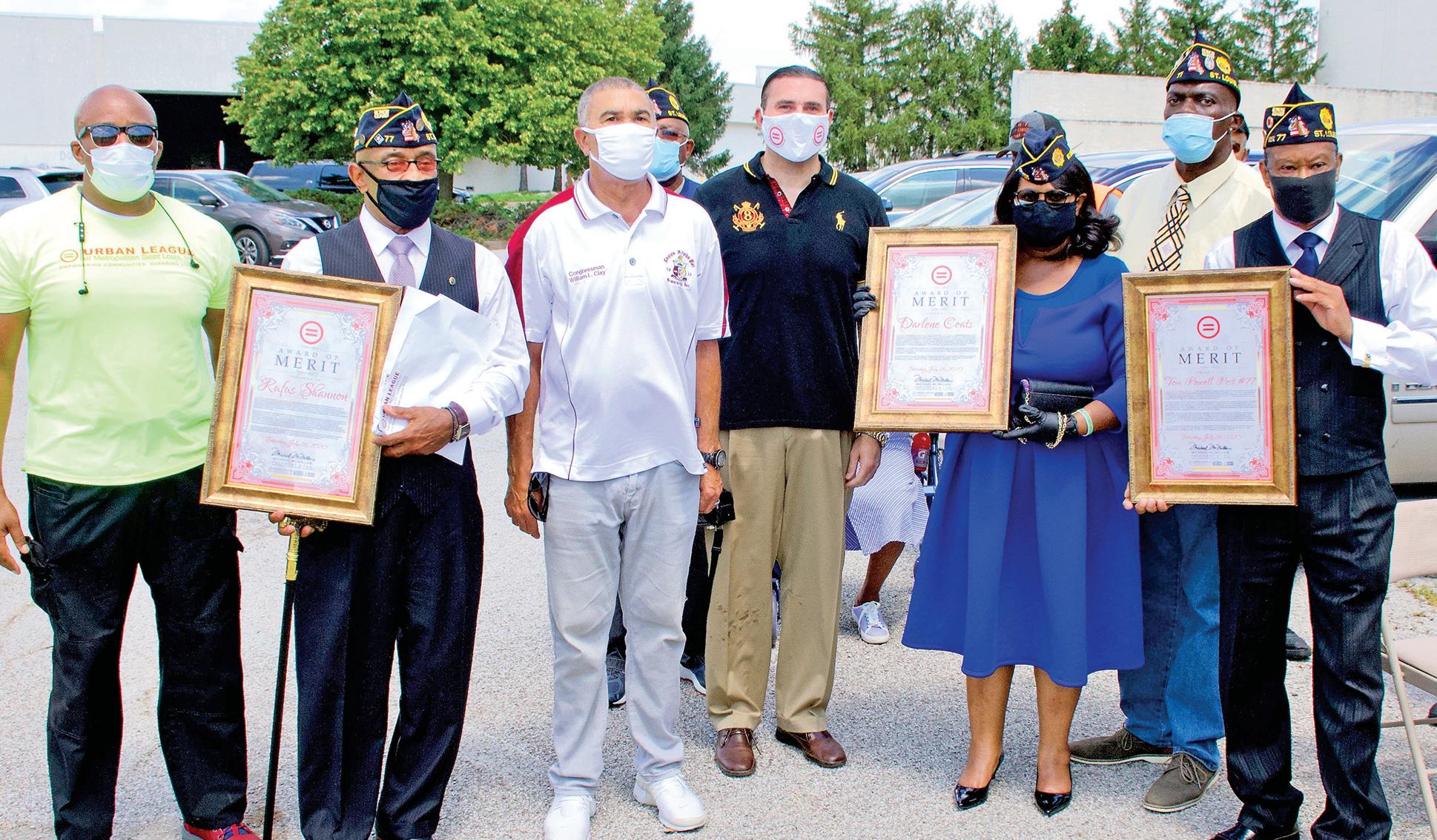
by
recollections. She questioned my intelligence. She should not be working with crime victims. She does not have the compassion or empathy.”
When Carl didn’t let up, DeBoer told her, “I feel like we’re splitting hairs, and I’m getting irritated.”
Carl responded, “Sooner or later, this chapter is going to end up with me, and it’s going to be my job to analyze and to decide: Where do we go from here?”
DeBoer said, “The right thing is where you guys go.”
At one point, DeBoer stormed out of the room and came back crying. Carl apologized, saying that sometimes she forgets as a lawyer that victims like DeBoer are still
n “She should not be working with crime victims. She does not have the compassion or empathy.”
– Melissa DeBoer on Mary Pat Carl and Kimberly Gardner
hurting. “I get so wrapped up in picturing myself standing in front of someone else later, a judge or a defense attorney or a jury, that I sometimes forget about the human element,” Carl told DeBoer.
Carl told The American, “I feel horrible that she didn’t feel heard in that meeting.”
Carl said she had no further involvement with the case. And throughout the following year,
the Circuit Attorney’s Office took no action in Lincoln’s case.
Then-Chief Warrant Officer Ed Postawko — who was also in the December 2015 meeting — testified at Lincoln’s parole hearing on April 10, 2017 at the Jefferson City Correctional Center. DeBoer was also there to ask for Lincoln’s release. Whatever Postawko said is sealed, but it made an impact because Lincoln’s parole was
denied.
Gardner didn’t know about Postawko’s parole board visit, nor had she approved of it, according to Gardner’s office.
In January 2018, Gardner met with DeBoer. It was a “completely different” experience from her interaction with Carl, DeBoer said.
“She was interested in what I had to say,” DeBoer said of Gardner. “She was an active listener, and she was professional. You knew you could trust her, and she took action. She was not going to let this lie.”
Just as Gardner’s Conviction Integrity Unit (CIU) was preparing to advocate for a new trial for Lincoln, then-Governor Eric Greitens commuted his
sentence to time already served in June 2018. Lincoln’s case would have been the first that Gardner’s CIU took on. One thing that stuck out to DeBoer was that Gardner apologized and took responsibility for Carl’s actions. It takes so much courage for crime victims to come forward, she said.
“My heartbeat will always be in St. Louis,” DeBoer said, “and my interest is that people who live there and have less power than I do are safe and heard and honored. It should not be a hostile experience to come into that office. Kim Gardner does a good job. She puts every bit of her heart and soul in it. And it costs her every day.”
n “It’s not something I’m going to force on my teachers. We’re going to make special accommodations for teachers and students.”
– Jennings Superintendent Art McCoy
McCoy is a certified Johns Hopkins University COVID19 contact tracer (someone traces the contacts of people with an infectious disease). He said he’s the first superintendent in Missouri to create a school reopening plan that was approved by the state and county health departments. Still, the unknowns of the coronavirus are real, and McCoy is cautious. “This is not for everybody,” he said. “It’s not something I’m going to force on my teachers. We’re going to make special accom-
modations for teachers and students.”
He admitted that the risks of opening Jennings’ schools are high. But the risks of doing nothing are just as high. To do nothing is to risk the lives of kids who disproportionately drop out of high school, get shot or murdered, who are abused at home, traumatized or at risk of living adult lives in poverty.
If education is a civil right, McCoy believes, then it’s up to informed leaders to blaze new paths, boldly defend and take risks to defend that right. “If we educators are paid tax-payer dollars,” he said, “then we have an obligation to be servant leaders.”
Sylvester Brown Jr. is The St. Louis American’s inaugural Deaconess Fellow.
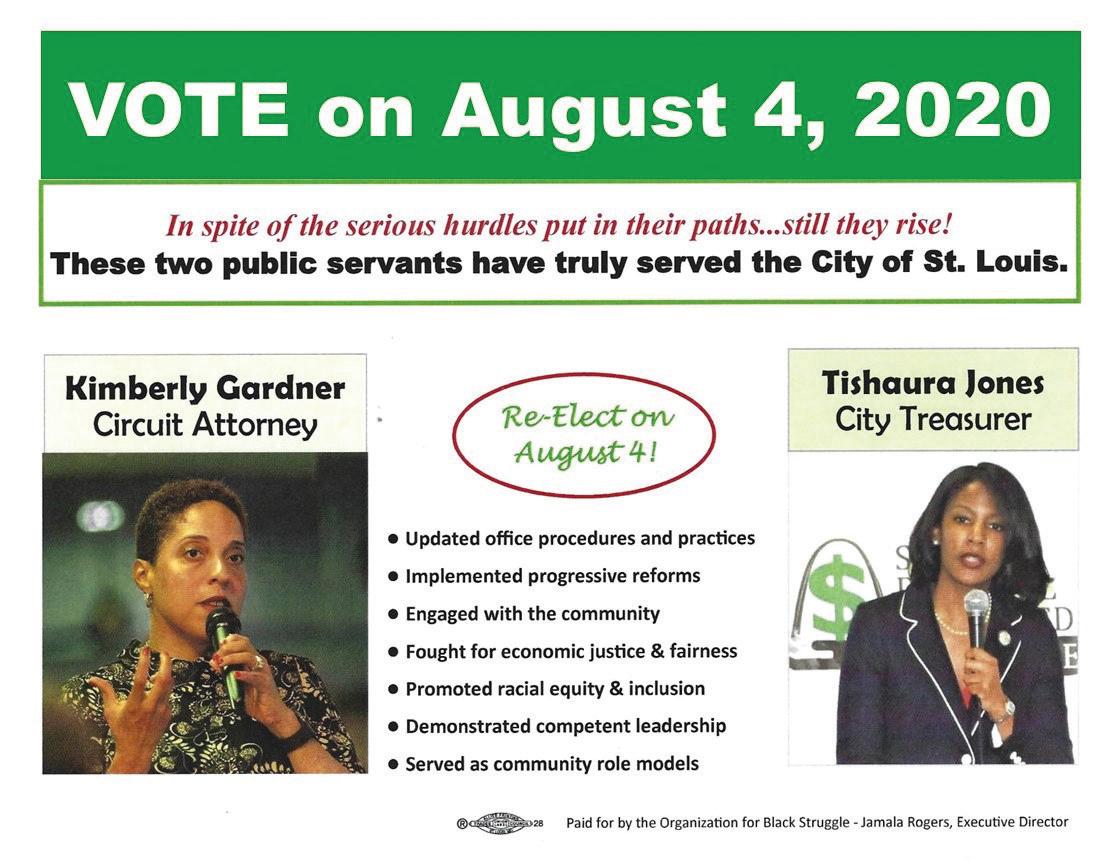
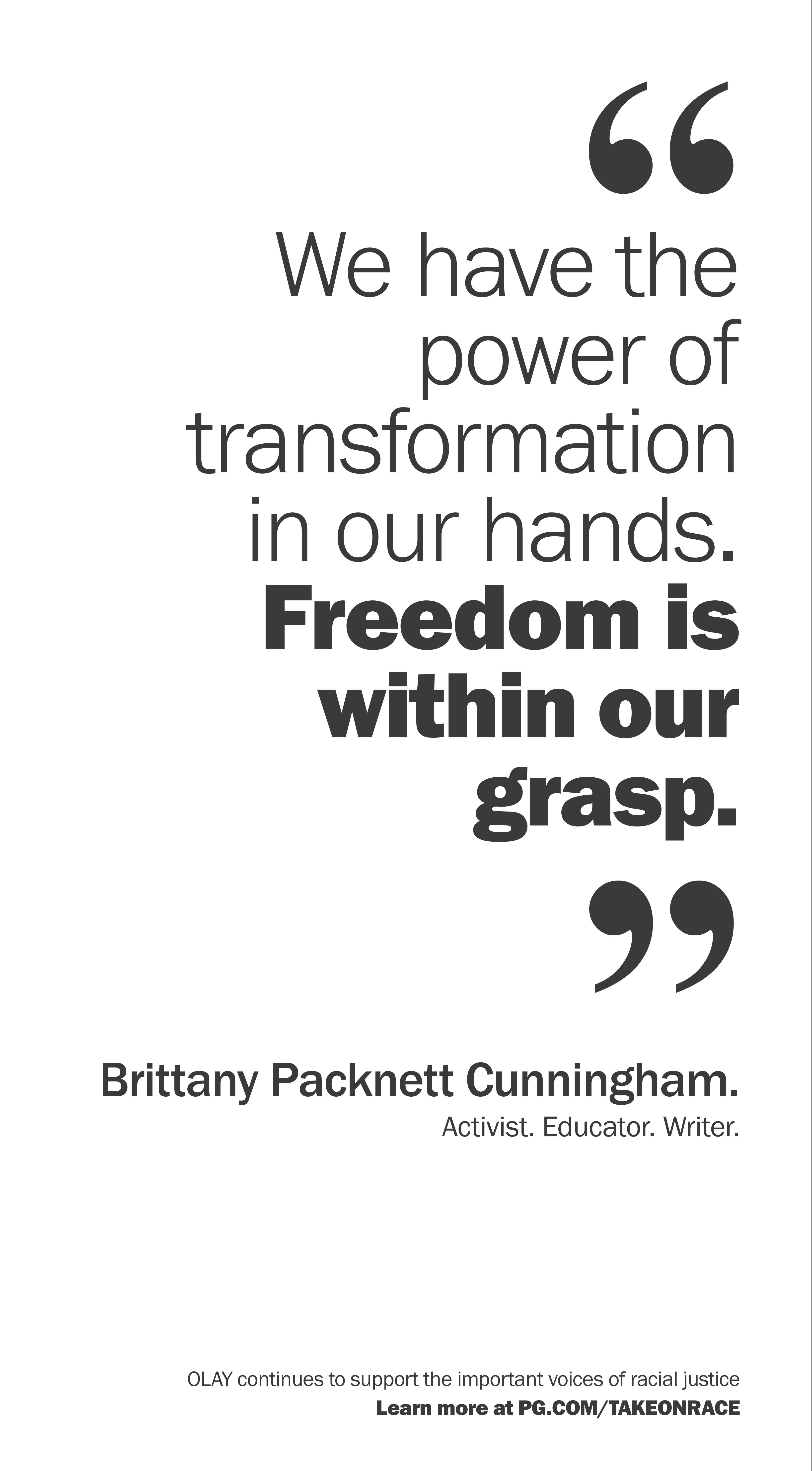
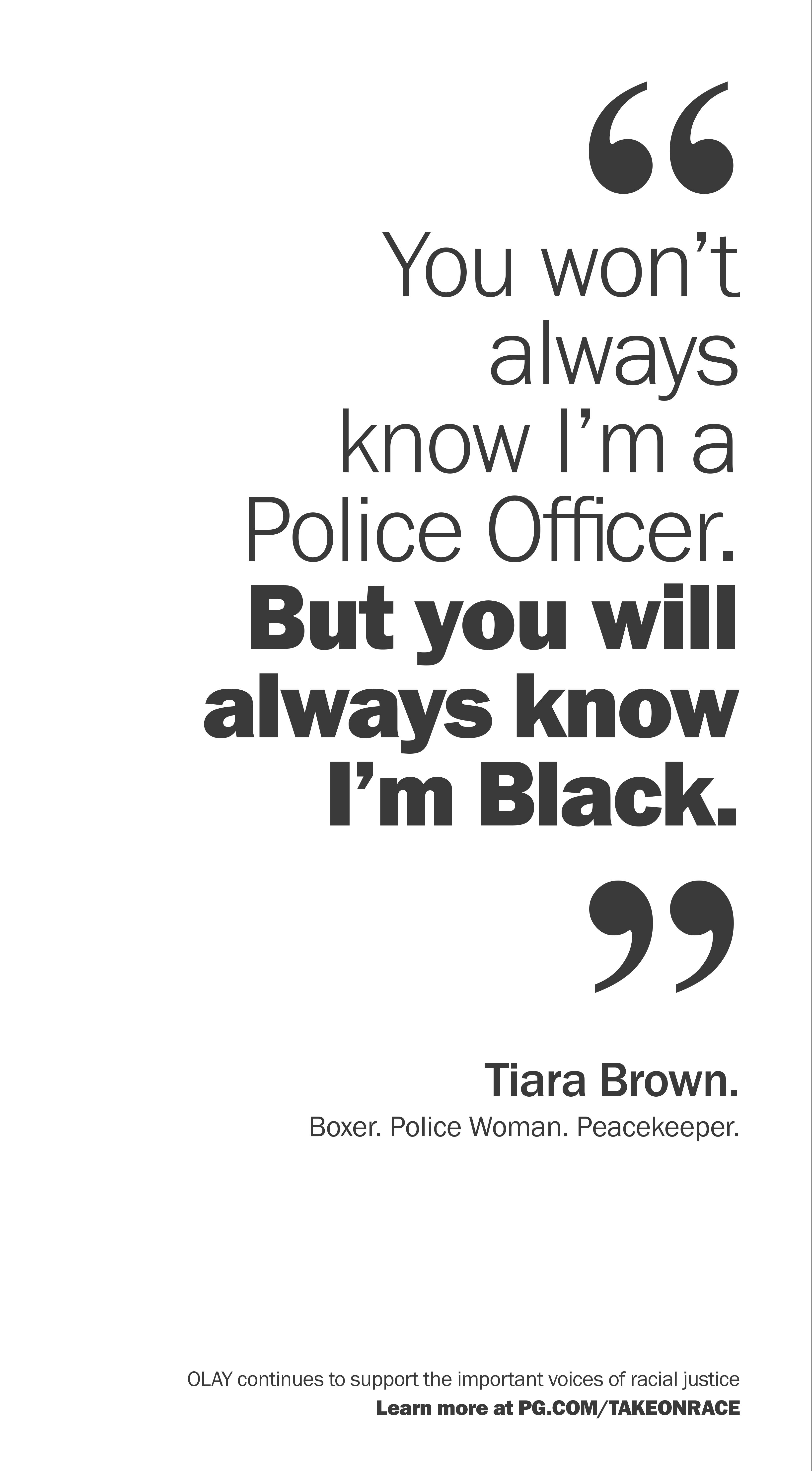

Who gets to serve the rest of Steve Stenger’s term as county executive?
On August 4, St. Louis County voters will choose who gets to complete Steve Stenger’s unexpired term as county executive. It’s a primary election, but the Democratic nominee will win the general election on November 3 – if he doesn’t get indicted first. That’s not entirely a joke. A week before the primary, a labyrinth of investigations has been called for and law suits threatened. This is perhaps fitting, since Stenger will be completing his second term as county executive, not in the county seat of Clayton, but rather 556 miles away in the Federal Prison Camp in Yankton, South Dakota.
The investigative and litigious fireworks started when attorney Jerome Dobson announced that he was filing an Equal Employment Opportunity Commission (EEOC) complaint of racial discrimination on behalf of St. Louis County Police Lt. Col. Troy Doyle a Black police leader. Doyle claimed that interim St. Louis County Executive Dr. Sam Page supported Doyle’s bid to become the next St. Louis County Police chief until Page caved into racist pressure. Captain Mary Barton a white woman, received the unanimous vote of the Board of Police Commissioners and was appointed chief. Page responded that Doyle was indeed his choice for chief, but that the police board is an independent governing body that chose Barton instead. Notably, neither Doyle nor his attorney Dobson alleged racial discrimination against the police commissioners who actually chose Barton over Doyle. They focused on Page, who appointed four of the five commissioners but has no vote on the board himself.
Perhaps that is because Page is facing an election to upgrade from interim to actual county executive, whereas the police commissioners are not. (When Stenger resigned last April, the County Council, of which Page was a member, voted Page to be interim county executive. The County Charter calls for the appointed successor to serve until the next general election, when the officeholder is chosen by public vote.)
Dobson, Doyle’s attorney, made explicit mention of the looming primary election in a voice message that he left with Winston Calvert, Page’s chief of staff. Dobson said he was willing to show Doyle’s grievance to Page and Calvert and give them the option of settling for $3.5 million rather than have the EEOC complaint filed – and publicized – before the primary election. Page’s attorney as interim county executive, County Counselor Beth Orwick responded with a firm no to the settlement offer and two complaints of her own. She said that Dobson had violated a professional rule of conduct – in a legal matter, attorneys of record are supposed to deal directly with each other and not with third parties; Orwick, not Calvert, is Page’s attorney in this matter. (Dobson was reprimanded by the Missouri Supreme Court last year for breaking this same rule.)
Orwick also accused Dobson of extortion. Dobson said the deadline of the primary election was part of an initial offer, not a threat. He may have a chance to explain that to the U.S. attorney, as the matter has been referred for federal investigation. So, that is one EEOC complaint – if Dobson actually filed one; the document cannot be

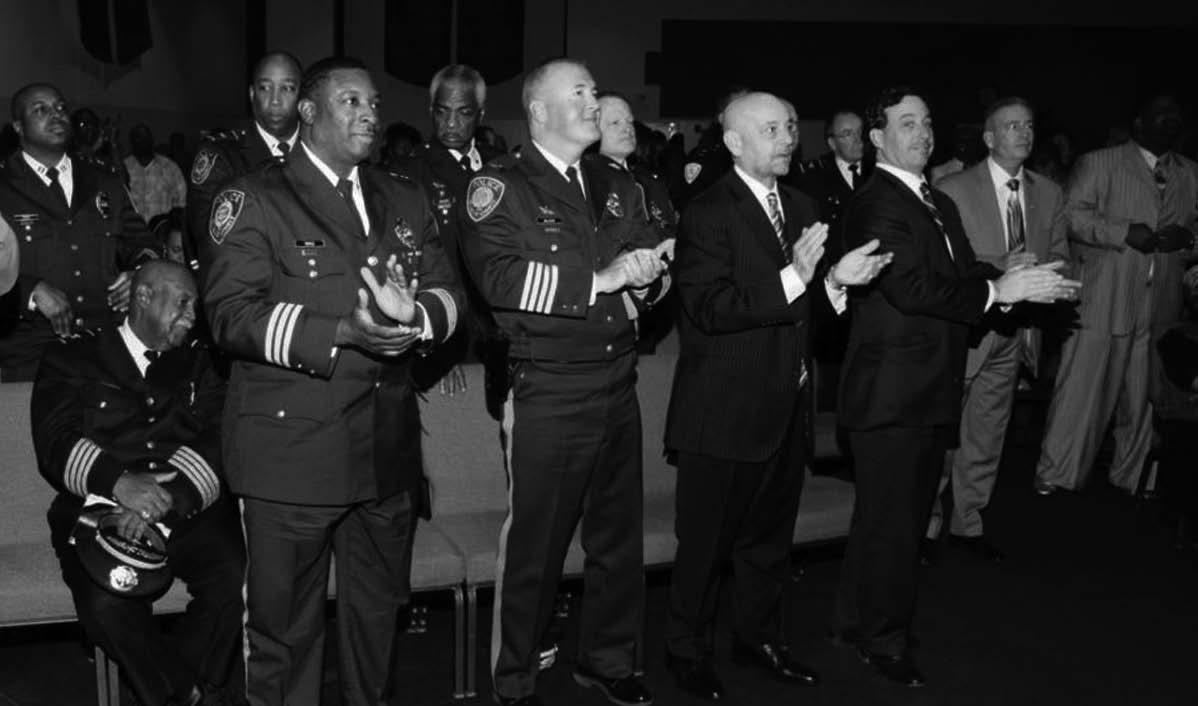
made public while the matter is under review – and one federal investigation. There is more to come.
July 24 was the deadline that Dobson gave Page to settle with Doyle before they went public with their grievance. That was the day that Dobson broke the news of the grievance. Two other things happened that day with suspicious haste – kind of as if they had been prepared in advance in response to Doyle’s claims. Mark Mantovani, Page’s strongest opponent in the primary, issued a press release in support of Doyle. And one of Page’s colleagues on the County Council dropped a new bomb that will spark another federal investigation.
St. Louis County Councilman Ernie Trakas released an affidavit and a statement about meetings concerning county leases during the Stenger administration with implications for the Mantovani campaign. The documents are not new – they date from May 29, 2019 – and the meetings they document are even older, in January and February of 2018. Trakas said he was making these documents public on July 24 specifically to inform the voting public before the primary.
Why? Ed Rhode and Jane Dueker were two Stenger consultants present at the meetings about the leases, where data appears to have been manipulated in an effort to align with Stenger’s previously inflated estimate of savings. Rhode and Dueker have both been paid in recent months by ChangeSTL,
a political action committee (PAC) working to elect Mantovani.
Rhode and Dueker said they have done nothing wrong, and Dueker (herself a lawyer married to a circuit judge) said she would lawyer up and sue Trakas for defamation.
Mantovani claimed that the PAC that has paid Rhode and Dueker is independent of his campaign and that he is not responsible for anything anyone did before they worked to elect him. Unfortunately for Mantovani’s attempt to distance himself from the taint of Stenger, his campaign is managed by Patrick Lynn, who worked on Stenger’s campaigns with the Kelley Group. (The Kelley Group also managed the successful mayoral campaign of St. Louis Mayor Lyda Krewson; a widely circulated Post-Dispatch photo of election night shows Krewson watching election returns over the shoulder of Dueker.)
In what could be unsettling news for Dueker and Rhode, one of the people sentenced to prison along with Stenger for his corrupt schemes, Bill Miller, was present for the meetings discussed in the documents released by Trakas. Miller’s plea bargain quotes statements he made in October and November 2018 that were recorded by a cooperating witness. These new documents report on meetings from January and February of 2018, possibly before the feds had a cooperating witness recording Stenger, Miller and others.
So, it is entirely probable that this is brand new informa-
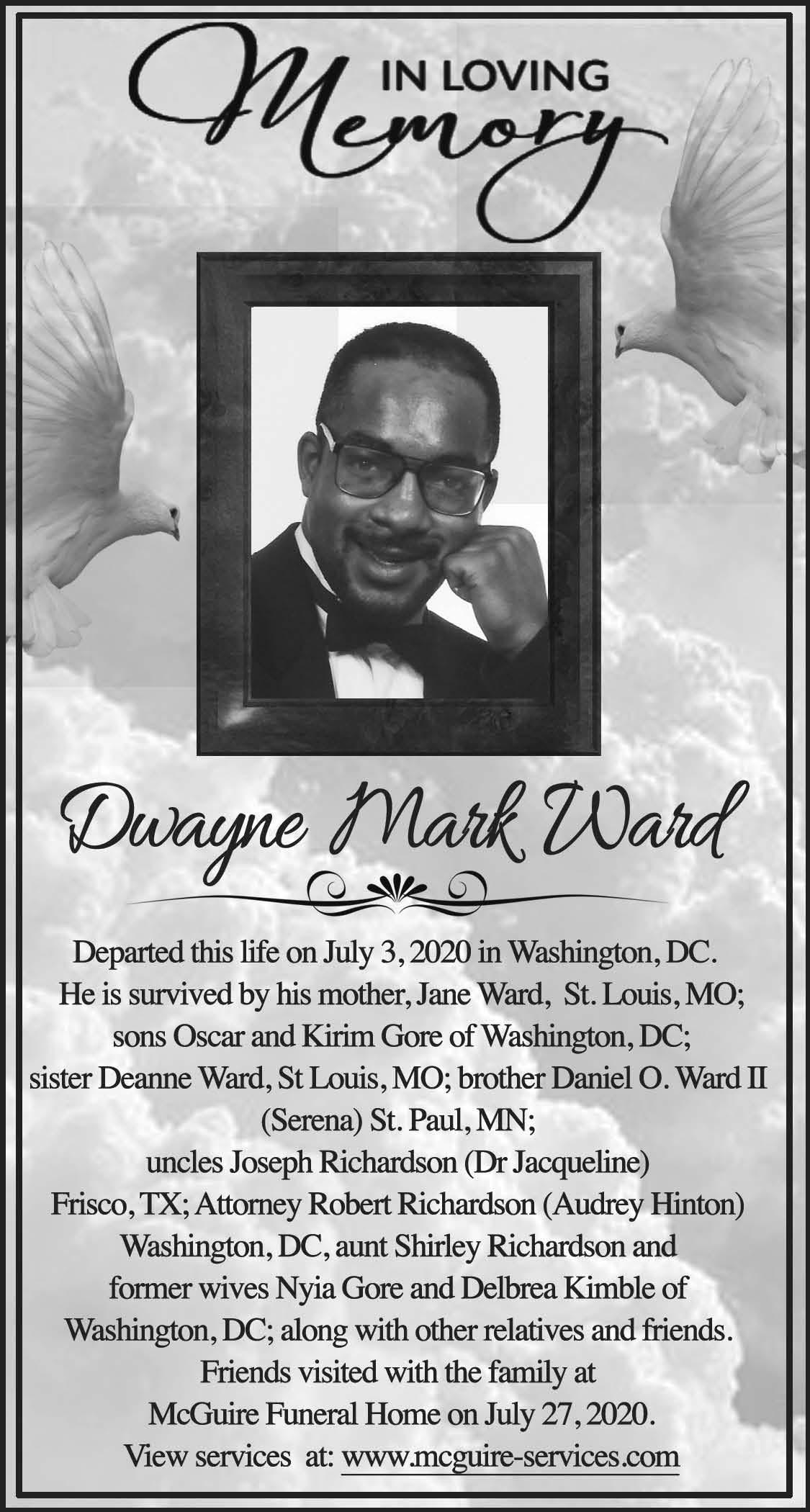
tion for federal investigators. Helpfully for the issuance of subpoenas, the documents provide guest lists for the people at the meetings. Given that the meetings were apparently about falsifying records about Northwest Plaza leases, where Stenger’s largest campaign donors were the county’s business partners, it’s safe to assume the Stenger file is open again in the U.S attorney’s office.
So, that is one alleged EEOC complaint, one new federal investigation of alleged extortion, one promised defamation suit, and a renewed federal investigation of alleged corruption. There is more to come.
Page’s ace in the hole in response to Doyle’s claim of racial discrimination was the voice message that Dobson left for Calvert saying that Page’s problems could all go away if he paid up $3.5 million before July 24. But Doyle was holding onto his own snippet of audio. He released it to media on July 27 to set up a press conference the next day. In this recording, Page tells Doyle that Page controls the police board. Remember: Page’s explanation for why Barton not Doyle was promoted to chief was precisely that Page does not control the police board.
Of course, there is more than one explanation for this discrepancy.
Scenario one: Page does control the police board and, despite his claim that he supported Doyle for chief, he directed the police board to promote Barton instead. This is the argument for Doyle’s threatened EEOC complaint, which Dobson said he filed. To prove this, Dobson will have to prove that Page actually influenced the police board. Right now, all we have is Page saying he controls the police board. Which brings us to scenario two: Page thought he could control the police board but could not. It is, after all, an independent governing body by design.
To sort this out, we would need privileged evidence
of the exchanges between Page and police board members. It might be possible to get the relevant information from Missouri Sunshine Law requests – but only long after the election to keep Page or to replace him with Mantovani (or one of the other challengers, Jake Zimmerman or Jamie Tolliver). At the press event to defend Doyle at Vinita Park City Hall on July 28, a series of Black elected officials, candidates and consultants called for a series of investigations that also could help sort out this mess. So, in addition to one alleged EEOC complaint, one new federal investigation of alleged extortion, one promised defamation suit, and a renewed federal investigation of alleged corruption, we can also add an investigation into the county executive allegedly tampering with the independent police board and an investigation into the police board’s process of independently choosing Barton over Doyle (with the implication that possibly the police board, not Page, was guilty of racial discrimination against Doyle). The American requested the records of the police board’s deliberations. The police board declined to release the records and has the discretion to do so regarding a personnel matter. Snapping pictures at the press event for Doyle was none other than Jane Dueker with one leg in a soft cast. Jane Dueker, who helped elect Steve Stenger and Lyda Krewson. Jane Dueker, who sat in those interesting meetings about those problematic leases with Stenger’s biggest campaign contributors. Jane Dueker, who is trying to elect Mark Mantovani to serve the rest of Stenger’s term. The rest of Stenger’s term as county executive, that is. Stenger gets to serve the rest of his prison term. He is currently scheduled to be released at the end of 2021 – right about when the county executive will be getting ready to run for reelection.

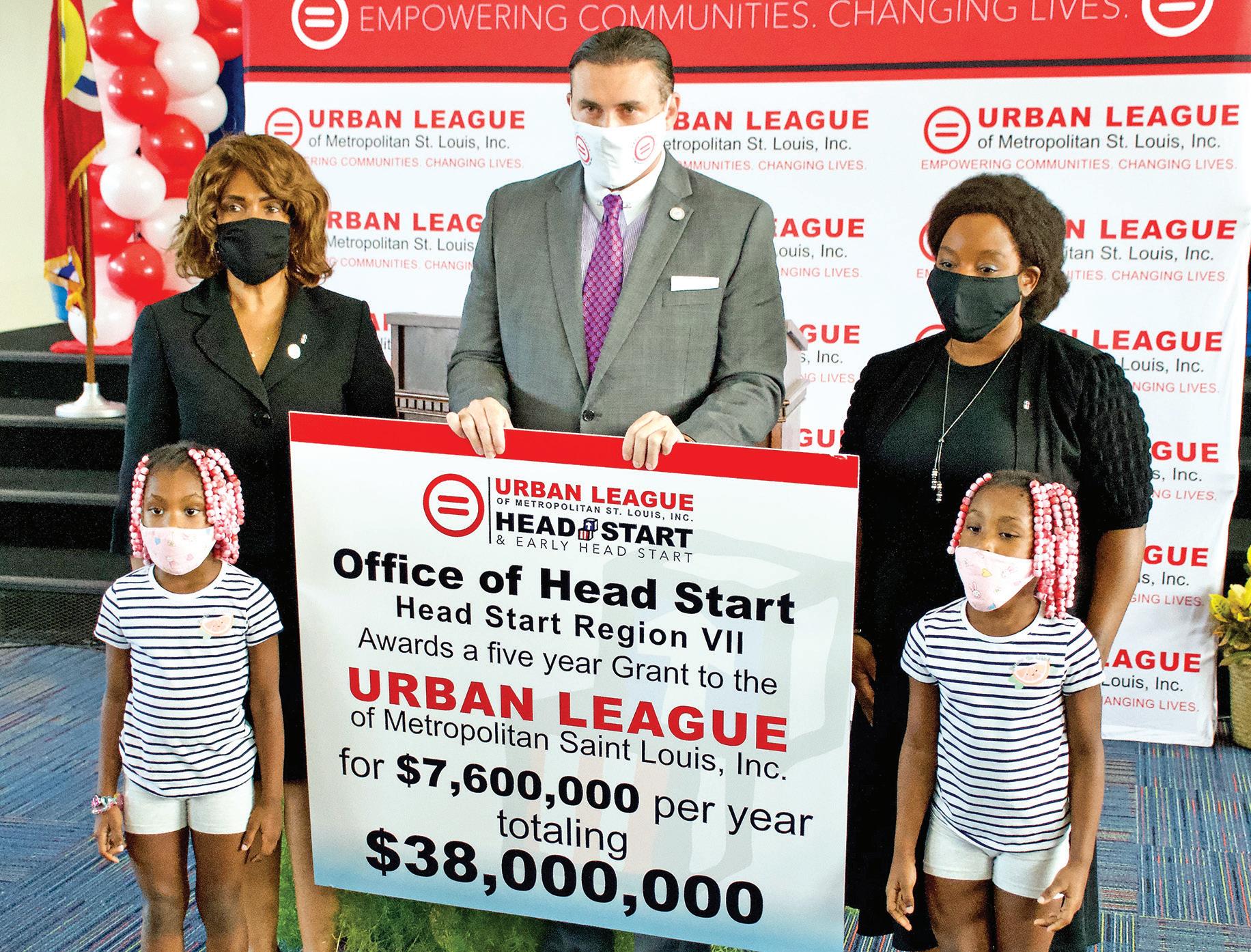
By Chris King Of The St. Louis American
Head Start is the single largest program for both the Urban League of Metropolitan St. Louis and Grace Hill Settlement House, and the message of the two agencies’ merger is that they will grow together as one.
So, it made sense that, along with the merger, Urban League President and CEO Michael P. McMillan also announced an expanded five-year federal contract of $38 million for the merged Head Start program. It will serve nearly 1,000 children. The historic merger and Head Start contract were announced at what has been Grace Hill’s Water Tower Campus on Wednesday, July 22.
McMillan described a superpower of a new social service agency, with a staff of 7,200 working at 720 locations, 229 years of past service, nearly 50 programs and a Board of Directors with 75 people — which, he predicted, is the largest board an Urban League affiliate will ever see. St. Louis had the largest and highest-rated affiliate before the merger, which has been in the works for two years. With the announcement coming at the far north end of Grand Boulevard, North St. Louis shared the spotlight with the new, expanded
Urban League. McMillan was joined by the 3rd Ward committeewoman and 21st Ward alderman in vowing to leverage the expanded agency to spur development in the North City neighborhoods it serves. The North County neighborhoods it serves were discussed in McMillan’s introduction of Alex Silversmith of U.S. Bank CDC, the Grace Hill board chair who helped to complete the merger. (Past and interim Grace Hill presidents Laura Kozak and Delores Hardwick also worked on the merger.) McMillan credited Silversmith with critical help financing the Urban League’s Ferguson Empowerment Center and new developments underway in the West Florissant corridor.
Grace Hill’s roots in the Episcopal Diocese were honored by the presence of Bishop Deon Johnson. He provided a Kenyan proverb to support the overarching theme that the merger is a victory for both agencies. “To go fast, travel alone,” he said. “To go far, travel together.” Bishop Johnson has joined the Urban League board, McMillan said, so he will be there to help with the journey.
In a region that is badly fragmented in every sector of life, private and public, several speakers, including McMillan, said the merger should be taken as a model to be followed. “This is a collaboration,” McMillan said, “not a competition.”
By Chris King Of The St. Louis American
Bill Bradley joined Schnuck Markets, Inc. as its chief Marketing and Communications officer, leading the company’s newly merged marketing, communications and customer insights team. Bradley, who was honored as the St. Louis American Foundation’s 2019 Corporate Executive of the Year, will begin on August 3 after nearly three decades with Anheuser-Busch, where his most recent role was vice president, Community Affairs. Previously he was senior director of Corporate Social Responsibility and held key positions in brand and special event marketing.
“I’ve known Bill for more than 20 years and cannot express how excited I am to have him join Schnucks where he will thrive in our culture and with our team,” said David Peacock, Schnucks president and chief operating officer.
“We know customers are determining where they shop based on their emotional connection to retailers – making our brand’s message and community focus more critical than ever – and Bill’s expertise and leadership is paramount as we leverage these core areas.”
Talking about a previous promotion at Anheuser-Busch, Bradley told See BRADLEY, A12
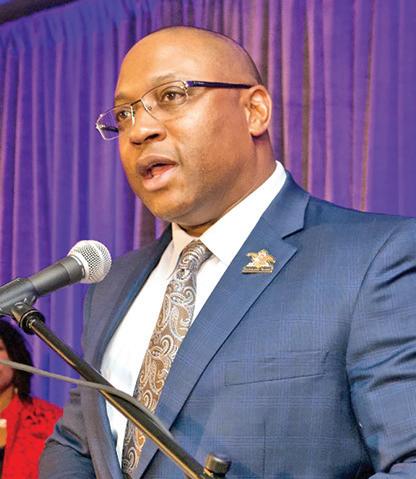
Bill Bradley, who was honored as the St. Louis American Foundation’s 2019 Corporate Executive of
Inc. as its chief
and Communications officer.
By Tamara Vaughn-Walker For The St. Louis American

Over the past weeks, I have read several statements from businesses and institutions expressing their commitments to racial justice and solidarity in support of the Black community. Issuing statements is only a starting point. Please, don’t stop there. Here are five ways businesses and institutions can go beyond issuing statements to actionable investments: Commit to Economic Justice Support existing Black-owned businesses. Also, consider utilizing
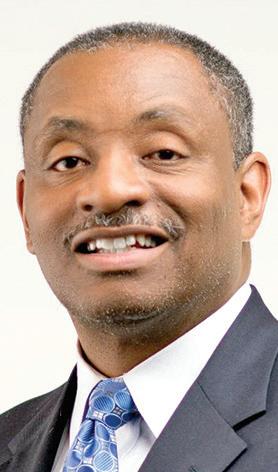
Moye: ‘This rigged airport deal only benefits wealthy special interests’
American staff
The Coalition of Black Trade Unionists, UNITE HERE Local 74, Communications Workers of America (CWA) Locals 6300 and 6355, American Federation of Teachers (AFT) Local 420, the A. Philip Randolph Institute (APRI) and the American Postal Workers Union (APWU)
St. Louis Gateway District #8 have joined the movement against St. Louis Lambert Airport privatization today, urging residents and elected leaders to reject the effort.
The labor organizations – together with SEIU, which previously announced its opposition – represent more than 14,000 working people across St. Louis including nearly 550 at Lambert.
“This rigged airport deal only benefits wealthy special interests and the well-connected,” said Lew Moye, president emeritus of the Coalition of Black Trade Unionists (CBTU). “Working families
Continued from A11
The American, “You want to continually be challenged. A new challenge is very interesting to me,” which would help to explain this move as well.
“I am very proud of the contributions that I have made at Anheuser-Busch over the last 28-plus years, and will miss the day-to-day interactions with colleagues and business partners, many of whom are also
in North City are sick of these empty promises; our neighborhoods need real investment, and airport privatization is not the way to do it.”
ends meet,” said UNITE HERE Local 74 President Kevin McNatt. UNITE HERE
Local 74 represents nearly 450 working people at Lambert and approximately 3,500 workers across the region. “Privatizing Lambert would harm working people across our entire city,” he said.
n “Privatization means lower wages and worse benefits.”
–Kevin McNatt
Aldermanic President Lewis Reed has moved airport privatization legislation, BB71, through City Hall at lightning speed. A similar privatization effort, financially backed by a dark money organization tied to billionaire Rex Sinquefield and also connected to Reed, is on track for the November ballot. Both would benefit Sinquefield and connected consultants who are set for a $44 million payout should Lambert be privatized.
“Privatization means lower wages and worse benefits when working families are already struggling to make
personal friends,” he told. “However, I am very much looking forward to joining the Schnuck Markets team and working hard every day for my new teammates, our customers, and the communities that we serve.” Bradley grew up in North St. Louis (“basically on the corner of Marcus and Labadie,” he told The American in 2016) for the first nine years of his life, before his family moved to Spanish Lake. Central Baptist Church was his home church. His father, William Bradley
The unions are urging elected officials to reject privatization schemes both at City Hall and at the ballot box. Should the initiative appear on the ballot in the fall, the coalition of unions will work to mobilize voters against the initiative through digital and other organizing methods in line with CDC COVID-19 guidelines.
“Working people are coming together, across different backgrounds, to oppose this scheme for our city,” said Communications Workers of America Local 6355 President Natashia Pickens. “We’ll see who stands with St. Louis working families and who stands with the billionaires pushing this bad deal.”
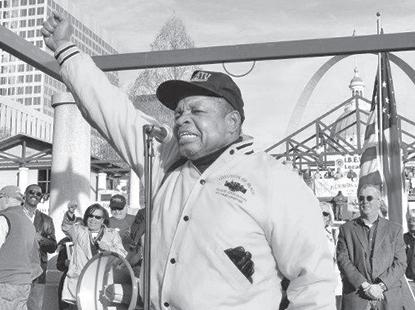
“Our
n “I’ve known Bill for more than 20 years and cannot express how excited I am to have him join Schnucks where he will thrive in our culture and with our team.”
– David Peacock, Schnucks president and COO
Sr., was a St. Louis city police officer for 35 years. His mother, Amanda Bradley, was a registered nurse for the City of St. Louis. “Most of that time she

worked for the old Homer G. Phillips Hospital,” he said. “So, I grew up in a household of civil servants, really.” He went to high school at Hazelwood Central, then earned his associate’s degree from St. Louis Community College – Forest Park, where he also played baseball. His bat and glove were critical to his transferring to BirminghamSouthern College in
Continued from A11
quality of life.
Elevate the Lived Experiences of Black Men According to research by the Vera Institute of Justice, “one in three black men born today can expect to be incarcerated in his lifetime, compared to one in six Latino men and one in 17 white men.” Black men also face disparate outcomes with housing, employment and shortened life expectancy. I believe the people mostly harmed by systems are the ones closer to the solutions. More black male representation is needed in business, education, nonprofits, policy development, philanthropy, etc. For far too long, Black men have not been granted access to spaces where decisions are being made about them - without them. Therefore, Black men have to be included and even leading these movements to authentically transform sys-
Birmingham, Alabama, where he graduated with a degree in business (with an emphasis in marketing).
He was recruited to Anheuser-Busch by Lincoln Scott, an African-American human resources professional who exercised at the Vic Tanny health club where Bradley worked shifts while he tried, and failed, to make it as a professional baseball player. The time spent pulling shifts at the gym was not wasted professionally, however.
“It was a great bridge for me coming from being a college athlete, being very comfortable in that environment,” Bradley said. “It taught me some interpersonal skills from a business standpoint, some selling skills that I did not previously have.”
tems.
Commit to Education Justice. In Black communities, many of our children are relegated to receive a sub-par education with lowered achievement expectancy. Education justice has to be achieved by creating equitable spending formulas, recruiting teachers who
n More black male representation is needed in business, education, nonprofits, policy development, and philanthropy.
desire to teach Black children, redesigning school discipline policies and meeting the holistic needs of students and families. School environments have to be culturally-centered to give children a real sense of belonging. This includes designing curriculum capturing the contributions of African Americans. Curriculum including law, poli-

Bradley attributed his success to “keeping my head down, going about my job and treating people the way I want to be treated. For the most part, that’s worked out for my professional and personal lives.” His current board member service includes the American Red Cross Greater St. Louis Chapter, United Way of Greater St. Louis, COCA and Guns ‘N Hoses.
“Growing up, my parents exposed me to doing things for other people. So, it’s really kind of a natural fit for me,” Bradley said. “It’s very comfortable for me helping others. Service to others can certainly be in many ways more rewarding for the servant than for the people who are being served.”
cy, entrepreneurship, financial literacy and social justice are other subjects to consider adopting to spark students’ career interests.
Invest in Coalitions For Black activists leading grassroots organizing and coalitions, more investment is needed for capacity building to sustain the work. These leaders do the heavy lifting of building collaboration across institutions, advocating for systems-change and building innovative solutions to complex issues. They commit to ensuring justice and equity is lived out across communities each and every day.
I hope you consider adopting one of these recommendations as a step towards racial justice and healing during this dire moment in history. Thanks for your consideration.
Tamara Vaughn-Walker is St. Clair County Juvenile Justice Council coordinator and a board member with the Deaconess Foundation.
Young is first Black to lead ESL charter school board
Willis Young was elected president of the Board of Directors of the Southern Illinois University Edwardsville
School. He is the first Black to lead the 13-person board. He retired as assistant director of the school in July 2019 and worked there in several capacities over the last 20 years. He replaces Kim Durr, chief of staff in the Office of the Chancellor. The mission of the
and
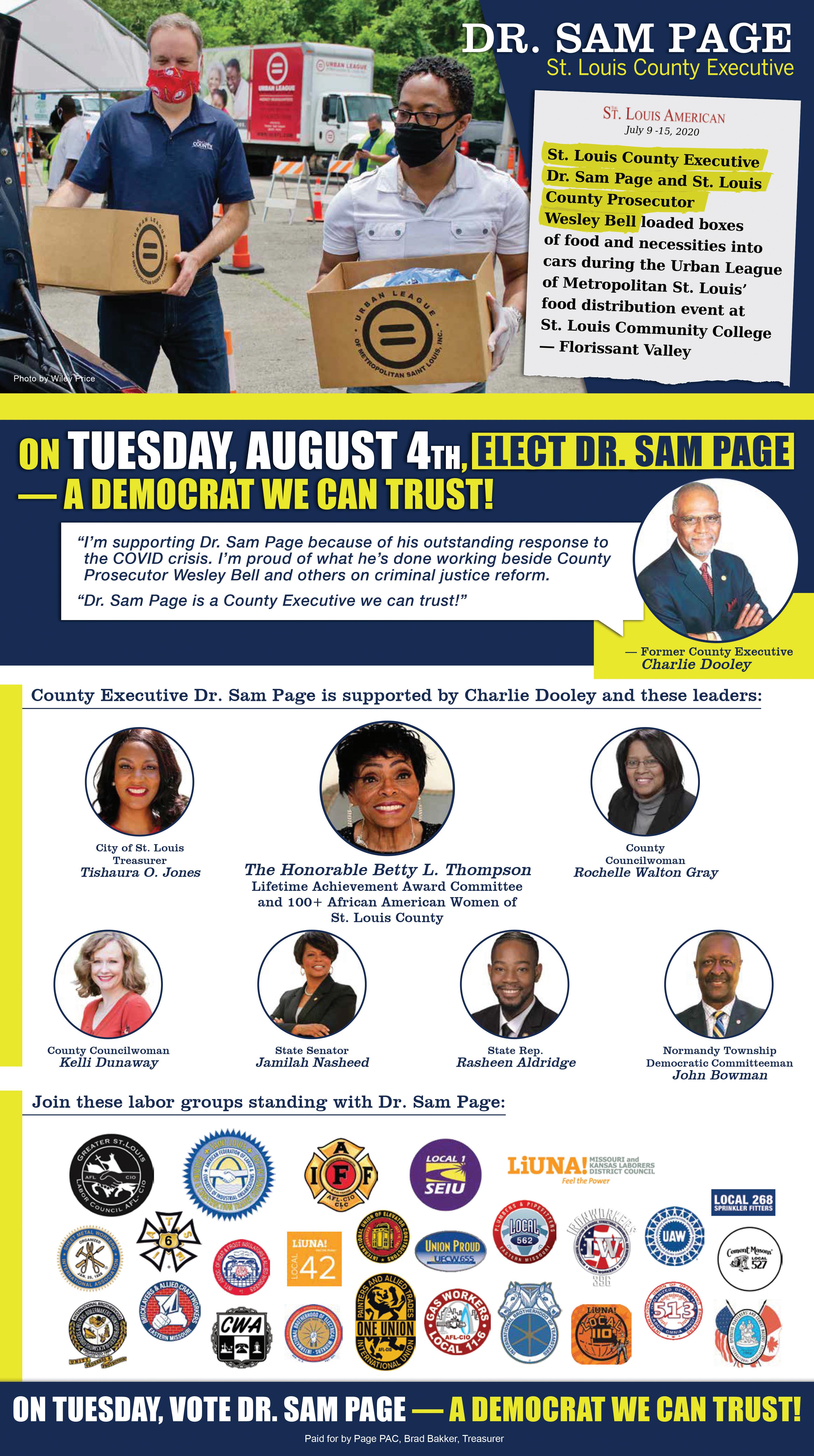

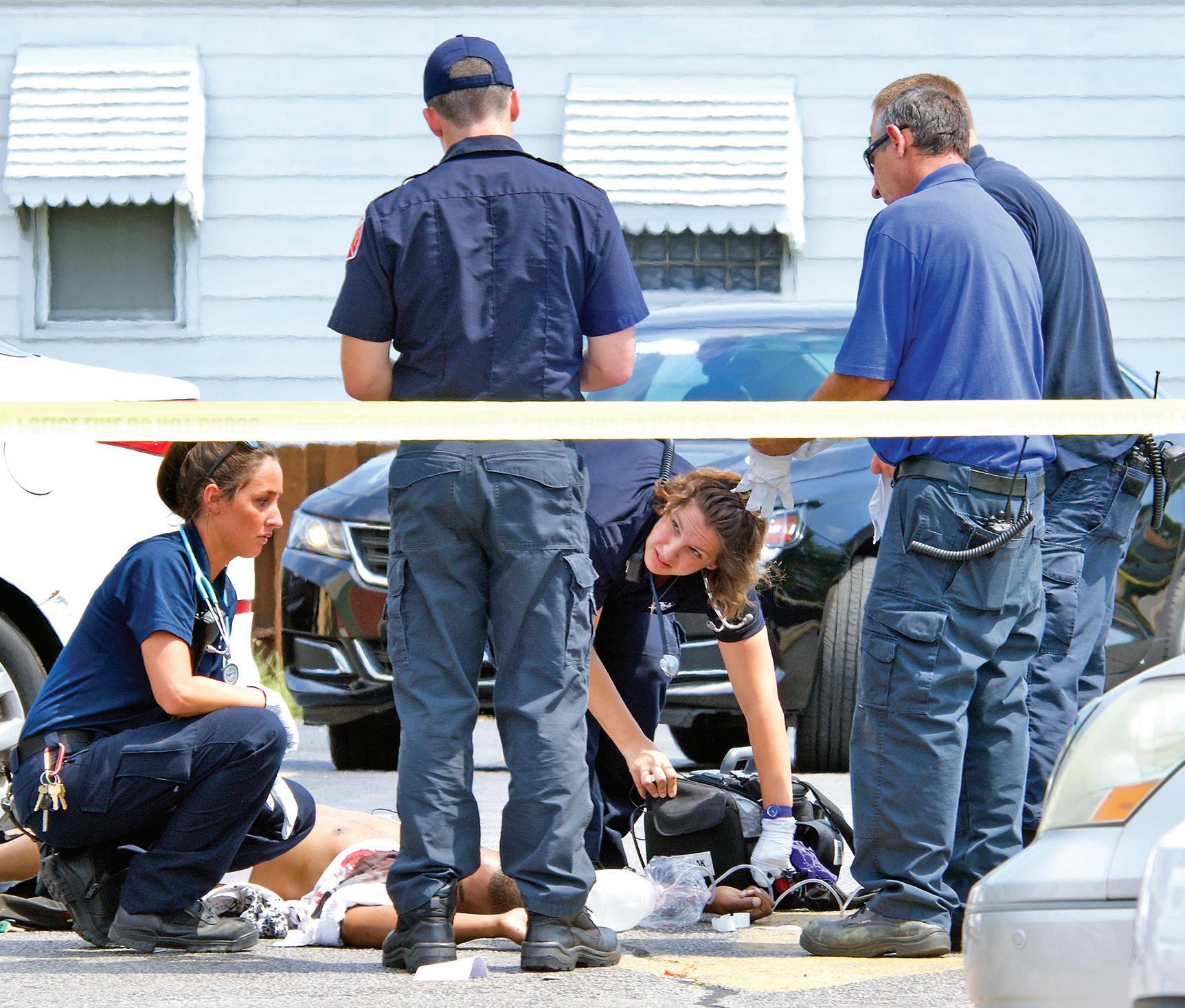
By Sandra Jordan
Of The St.
Two
within the Dutchtown neighborhood. Both are scheduled to be active by August 1. The city previously allocated $7 million to implement the Cure Violence model in three different sites over three years “I am gratified that the city is ready to move forward with Cure Violence in these two addi-
n “Tragically, we have seen an increase in homicides this year, and it is crucial that work get underway to interrupt the cycle of violence.”
– Comptroller Darlene Green
tional neighborhoods, completing the three sites selected as part of our initial plan,” said Comptroller Darlene Green. “The City of St. Louis is in the midst of a continuing
crisis of violence. Tragically, we have seen an increase in homicides this year, and it is crucial that work get underway to interrupt the cycle of violence.” Green said she sent a letter to Mayor Lyda Krewson on July 9, requesting an urgent meeting of the selection committee, to which Krewson agreed and moved up the meeting of the selection committee to July 14 in advance of the Board of Estimate and Apportionment’s July meeting.
Dr. Fredrick L. Echols, acting director of Health for the City of St. Louis, said the health department will work with the new See VIOLENCE, A15
My job is to put faces on the pandemic
By Sylvester Brown Jr. Of The St. Louis American
“Irony is one of my favorite aspects of life.”
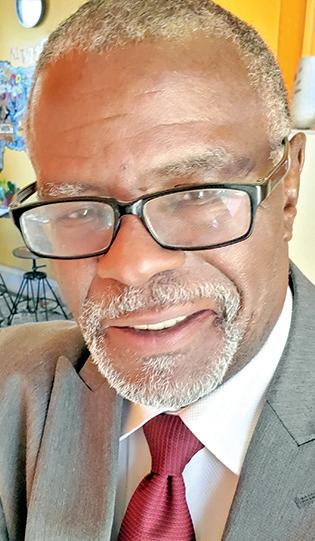
I can’t say that I agree with Cherokee American actor Wes Studi’s assessment of irony but I have been reflecting on the word lately. A couple of weeks ago, I received word that I would be joining The St. Louis American as a Deaconess Fellow. My major responsibility for the next year is to focus on the COVID-19 pandemic and its effect on African Americans in our region. The ironic part of this new opportunity is that days after getting the gig I found out my girlfriend tested positive for the coronavirus. Sure, I want to write great narrative pieces about the pandemic, but I have no desire to be a participating part of those stories.
Yet, I am.
n My test results came back negative. My girlfriend also seems to be OK. But all that fear, uncertainty and the need for answers will serve as inspiration.
My test results came back negative. My girlfriend also seems to be OK. To date, she’s shown no symptoms of the virus. Still, the impact of possibly having the disease, the still-unknown mysteries of COVID-19, the impact on her life, my life and the lives intertwined with ours are all too real. All that fear, uncertainty and the need for answers will serve as inspiration for this new assignment. We all know that black people disproportionally contract and die from this disease. We know that access to quality healthcare, being essential workers, reliance on public transportation and suffering disproportionally from diabetes, heart disease and asthma all make black people extra vulnerable to the virus. My job here at The American is to put
Gatherings capped at 50, bars must close at 10, business occupancy limited to 25%
By Rebecca Rivas
Of The St. Louis American
With the rapid rise in both COVID-19 cases and hospital admissions, St. Louis County Executive Dr. Sam Page announced seven actions to reduce the spread of the virus on Monday, July 27. These include restricting gatherings to no more than 50 people, mandating that bars close at 10 p.m., and rolling back business occupancy to 25% — all which go into effect on Friday, July 31 at 5 p.m.
“We hope that our actions today will reduce the spread enough that schools can offer an in-classroom option this fall for parents who choose,” Page said during the Monday press briefing. The county’s daily report of test results indicated that 523 more people tested positive, he said. According to the St. Louis Metropolitan Pandemic Task Force, the area hospitals have
n “We will take the necessary actions to protect the health of residents and visitors.”
– Dr. Fredrick Echols, acting director of health for the City of St. Louis
now reached 40 new admissions a day on average. “That’s the milestone and a marker we decided several weeks ago that we’d decide to do something differently,” Page said. The task force was consulted on these decisions and fully supports the changes, See COVID-19, A15
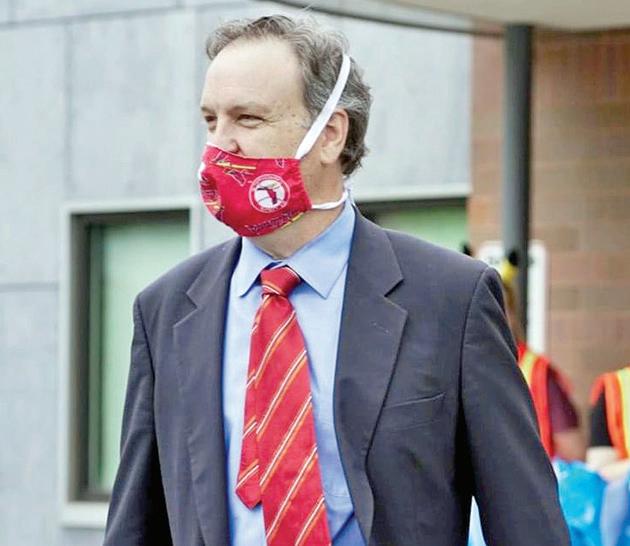
“We hope that our actions today will reduce the spread enough that schools can offer an in-classroom option this fall for parents who choose.”
– St. Louis County Executive Dr. Sam Page


Continued from A14 vendors “to ensure the programs maintain the fidelity of the Cure Violence model and reduce gun violence in these neighborhoods.”
Michael McMillan, pres-
ident and CEO of the Urban League of Metropolitan St. Louis, said that James Clark will lead their effort, which will “bring a concentrated focus of resources from all the 50 programs that we conduct in these areas.”
Employment Connection’s Cure Violence site in the Wells-Goodfellow and
Hamilton Heights neighborhoods has been operational since June 1 and is already having a positive impact, according to Sal F. Martinez, chief executive officer of Employment Connection.
“We have recruited and engaged a talented team of individuals who have been working diligently to build
relationships with high-risk individuals and stakeholders in these communities, and they have been warmly received,” Martinez said.
“Our team has already responded to multiple crime scenes where gun violence has occurred and has also been providing conflict mediation and de-escalation services to indi-
viduals who were planning to use firearms to settle disputes.”
He said they also are connecting people in these neighborhoods to job training and placement, behavioral health counseling, and housing/utility assistance.
Cure Violence Global is guided by clear understandings that violence is a health issue, that individuals and communities can change for the better, that community partners and strategic partnerships are keys to success, and that scientific, professional ways of working are essential for effectiveness. The amounts of each of the new contracts are not to exceed $750,000 and will both be in effect through July 31, 2021.
Dr. Kelly Gable and Joel Sjerven For The St. Louis American
We are in the depths of an unprecedented global pandemic that has had a devastating impact on our social, emotional, and physical health. In times of crisis, we often search for reassurance that things can and will get better. We need a reassurance that if we get sick, there will be treatments available to help us heal and, ultimately, survive.
n We have been shown by other states the benefits that come with Medicaid expansion, so now it’s time for Missourians to vote Yes on Amendment 2.
The unfortunate reality is that there are thousands of Missourians navigating this pandemic isolated, fearful, and without the assurance of accessible healthcare. They grapple with the uncertainty of what will happen if, or when, they get sick. As clinicians at a federally qualified health center, we see first-hand the constant struggle that our patients face in an effort to stay alive in a system without insurance. For many, it means limited medical visits and restricted access to medications. It means choosing between medication for high blood pressure or diabetes but not being able to afford both. It often means no access to critical preventative screenings, such as a mammogram and colonoscopy.
The other staggering impact of the COVID-19 global pandemic is the effect that it has
Continued from A14
according Dr. Alex Garza, incident commander for the task force.
“All of the COVID metrics are moving at a concerning and unsustainable rate, including increasing cases, percent positives of testing, and hospital admissions,” Garza said. “We must act now to avoid further spread, hospitalizations and deaths which typically follow rapid increases in cases. We must take these steps if we want to flatten the curve, get our kids back playing sports and in school full-time, as well as keep everyone safe and healthy.”
Garza said that St. Louisarea hospitals are on the path to reach the same peak they experienced in April by mid-August.
Page also noted that young people continue to see an increase in new cases, with the steepest increase in new cases among people
Continued from A14 faces and personalities on the pandemic; it’s to tell narrative stories of how we cope, how we excel against great obstacles, and how we can collectively survive this crisis. I want to speak to those questions that invaded my mind and more: How do I
had and will continue to have on the mental health of our community. As we confront coping with the new normal of social isolation and distancing, feelings of depression and anxiety rise. Irrespective of a pandemic, one in five Missourians will experience a mental health disorder annually. Unfortunately, their income will dictate whether or not they have access to mental health services. Healthcare coverage opens the door to critical interventions, such as therapy, medication coverage, and hospital care when necessary. Medicaid serves as a lifeline for much of the nation’s mental health and substance use disorder services, providing coverage to more than one in four of adults with a serious mental illness in our country.
Along with mental health, drug and alcohol use disorders are treatable health conditions, when given access to proper care. Every year since 2010, drug-related deaths have exceeded traffic fatalities in Missouri. The number of African-American males dying from an opioid overdose in Missouri has risen for two consecutive years, while Caucasian male deaths have decreased. The lack of Medicaid expansion to date continues to shine a light onto the systemic racism
ages 10 to 19.
“And, in recent weeks, the number of new diagnoses is highest among people aged 20 to 29 years,” Page said. “Contact tracing, social media, and common sense tell us that these young people frequent late-night bars and entertainment venues where people are crammed together, aren’t wearing masks, and aren’t social distancing. So, we’ll be making some changes there starting this week.”
Among the other actions, the county is also recommending that all people who are awaiting their COVID test results quarantine until they receive the results. Action will also be taken this week to ensure that all health providers are getting their results reported in a timely manner, he said. Due to delays, the county Department of Public Health issued a Rapid Notification Order.
“But not all testing providers are complying, especially urgent care providers,” Page said.
The county will initiate a new process for closing busi-
protect myself and those I love? How will our children return to school safely? What provisions are provided for children and adults with special needs? What leaders can we truly trust? Can small, black-owned businesses ever rebound? What if any new social, economic, or health-related opportunities will this pandemic present? As you can see, I have a lot of ground to cover. I will

nesses as another enforcement tool, he said.
“If businesses are not playing by the rules, they shouldn’t be open,” Page said. “So, the Department of Public Health will be finding new ways to make sure all businesses are following the rules — for the safety of their workers, workers’ families, and their customers.”
Finally, the director of human services has been asked to help provide safe places for teachers who need to quarantine.
“Teachers, virtual or in-classroom, are always important, but let’s face it: starting in a few weeks, teachers will be the new frontline workers,” Page said.
“We need to recognize that. And we need to treat them accordingly. Just as so many of you have gone out of your way to thank health care professionals, grocery workers, and public transit drivers for putting themselves at risk to provide necessary services in our community, we should convey equal gratitude to our teachers.”
need your help, your stories, and your ideas. Together, we can provide valuable insights and understanding about this disease, ourselves, and our future.
At the very least, these stories will serve as a historical testament to a time of great challenge and fear. Years from now, when COVID19 has been relegated to the annals of history, later generations can visit The American’s
Even with these efforts, Page is strongly encouraging parents to opt for a virtual option if they can.
“I know that for parents, this creates childcare challenges,” Page said. “For some families, it will keep children with special needs away from familiar and necessary support systems. And, given the long-standing disparities in our region, inequitable access to virtual learning will only increase those inequities. So, this is not something I would ask of this community if not for the reality that the health and welfare of our kids, our families, and our neighbors are at stake.”
City moves to close non-compliant businesses
Responding to the same trend of young people partying in nightclubs and spreading the virus, the City of St. Louis is moving to close businesses that have continued to ignore public health orders and put the public’s safety in jeopardy. Some have
archives to see how we, as a collective, grappled and coped with and survived a worldwide pandemic.
I’m also hoping to shine a light on the heroes amongst us. I want to share the stories of local first responders, essential workers, researchers, healthcare providers and scientists who bravely tried to assist, rescue, and guide us through this crisis. I want them to know their great deeds have not gone unnoticed.
that plagues our healthcare system.
Health outcomes analyzed by race show an unacceptable story: In St. Louis, African Americans account for 1972 of the cases of COVID-19 and 108 deaths, compared to 934 cases and 49 deaths for Caucasians (as of 7/23).
The infant mortality rate for African Americans in Missouri is more than double the rate for all Missourians. While African Americans have similar rates of opioid misuse, they have experienced the greatest increase in fatal overdoses. An entire community of individuals has been left behind with limited to no connection to evidence-based, life-saving treatments, and a basic human right to access healthcare. Expanding Medicaid is absolutely essential to move toward more equitable healthcare in Missouri.
On June 30, Oklahoma passed Medicaid expansion by ballot initiative, becoming the 37th state to expand Medicaid. Missouri has the possibility of becoming the 38th. We have learned from watching other states that Medicaid expansion has had a profound impact on access to both physical and mental health care within those states. Medicaid expansion removes the daunting task of having to prove a health disability in order to qualify for coverage, rather allowing people to become eligible based on income.
Expanding Medicaid in Missouri will open up healthcare to Missourians earning
previously received cease and desist letters from the City’s Department of Health but have continued to openly disregard rules that require people to socially distance and wear masks as evident from reports and social media posts that circulated this weekend.
People under the age of 40 accounted for 64% of the city’s overall positive case count in the last 30 days. “Physically distancing ourselves from one another and wearing a face covering are proven means of preventing the spread of COVID-19 and other respiratory illnesses,” said Dr. Fredrick Echols, acting director of health for the City of St. Louis. “The data is telling us that enough individuals are not changing their behavior. We will take the necessary actions to protect the health of residents and visitors.”
The non-compliant businesses will be ordered to close for 14 days.
I’d like to thank publisher Donald M. Suggs and The American’s entire staff for this amazing opportunity and gracious welcome. Not only will I report on the pandemic across all of the newspaper’s coverage areas, but I’ll also utilize a wide range of media platforms. Look for my work not only in the print edition but through The St. Louis American’s website and social media platforms as well.
less than $18,000 a year. An estimated 230,000 Missourians currently work in jobs that do not provide them health insurance. Medicaid expansion would remedy that, while bringing over $1 billion of our tax dollars back to Missouri and create 26,000 jobs in the first 5 years after its passage. During this pandemic we have seen people rise to the occasion in many inspiring ways, from donating food and supplies, to making masks, to placing a sign in their yard letting the world know they support front-line workers. Compassion drives so many to ask the question, “how can I help?”
It is simple, and it is clear: it is decision time for our state. We have the opportunity to finally get it right. We have been shown by other states the benefits that come with Medicaid expansion, so now it’s time for Missourians to come together to raise their voices in shaping a more compassionate, resilient, and equitable state through Medicaid expansion. Your voice, and your vote, WILL. SAVE. LIVES. Join us by voting Yes on 2. Dr. Kelly Gable (kgable@ siue.edu / 314-353-5190) is a professor of Pharmacy Practice at SIUE School of Pharmacy and a board-certified psychiatric pharmacist and Joel Sjerven (jsjerven@fchcstl.org / 314531-5444x4403) is a recovery specialist and licensed master social worker, both providing behavioral healthcare at family care health centers in St. Louis.
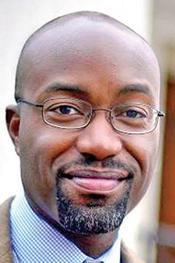
Jason Purnell will join BJC Healthcare as vice president of community health improvement. In this newly created role, Purnell will be responsible for the development, implementation, and evaluation of BJC’s community health programs. He will focus on eliminating health disparities and oversee connections with community-based programs and organizations that offer prevention for chronic conditions.
Purnell earned a PhD in counseling psychology from Ohio State University, a master’s degree in public health from the University of Rochester, and a bachelor’s degree in government and philosophy from Harvard University.
Purnell, a St. Louis native, leads the COVID-19 Regional Response Team.
I’ve already heard from some of you. Please keep it up. Send me any ideas about interesting people or stories you want to read pertaining to this coronavirus crisis. Please email me at sbrown@stlamerican.com. That said, I look forward to the work will we produce. Sylvester Brown Jr. is The St. Louis American’s inaugural Deaconess Fellow.

“You might want to point your cameras in this direction,” Albert Watkins told a handful of people shooting a press conference he had announced, and then Watkins walked in the direction he told them to point their cameras.
It was nearing the appointed hour on July 11 when Watkins had announced that St. Louis police would take into evidence a pistol that belongs to Mark McCloskey and Patricia McCloskey. On the fateful night of June 28, Patricia McCloskey had held her finger on the trigger of this pistol as she pointed it at peaceful protestors passing in front of their home on a private street in St. Louis’ Central West End. St. Louis Circuit Attorney Kimberly Gardner was investigating the McCloskeys for the incident. It’s against the law to point a weapon in a threatening manner at someone who is passing in front of your home (the fact that the protestors were trespassing on a private street will be crucial to the defense). The St. Louis police were taking into evidence the guns that the McCloskeys had pointed at protestors. That’s why they were coming for this pistol, which the McCloskeys had given to their (now former) attorney, Watkins.
It surprised me to see two St. Louis police detectives walking up at the appointed hour directly towards a small gaggle of reporters with cameras congregated around Watkins. For one, it’s unusual to have the execution of a search warrant announced
If
the president and governor are right about Kim Gardner, they are calling a cop a criminal liar
to the media and filmed.
Once Watkins — a notorious media hound — called a press conference around his appointment with the police, I expected them to reschedule with Watkins or tell him to bring the gun down to the station. But here they came, right on time, walking toward the cameras now being pointed at them.
There was another major concern that I thought might have kept them away from the cameras. I had been told just that morning — by a very reliable source in a good position to know — that the prosecutor Gardner and the police officers serving search warrants on the McCloskeys had received death threats. The search warrants had been reported the night before by a problematic local journalist with excellent police sources; she has earned a reputation for reporting stories the police want from perspectives favorable to the police. My assumption is that she was told about the search warrant by a cop who thought it was ridiculous and unfair — the McCloskeys were emerging as icons of embattled white citizens standing their ground against the anti-police mob — but it had backfired in death threats against their own police brothers.
I had my news story reported by that point and did not need to see or hear Watkins hand the pistol over to the police, but I did get close enough to get the cops’ names so I could ask the police department if their lives, in
fact, had been threatened.
Only one officer had a name displayed: Burgdorf. I emailed a police spokesperson to ask whether Detective Burgdorf or anyone else in the department had been threatened with death for working on the McCloskey case. It took them a day, but they told me no. By then, I had quietly reported that court filings on the McCloskeys had been placed under seal because the prosecutor had reportedly received death threats.
Kimberly Gardner is the first Black prosecutor in St. Louis and a woman. As such, she has attracted a lot of vitriol and anger, mostly from white men — including, unbelievably enough, the president of the United States, the governor of Missouri, a U.S. senator from Missouri, and the state’s attorney general. I did not blaze the death threat in headlines out of respect for my source and based on my experience that loudly reporting death threats tends to attract more death threats.
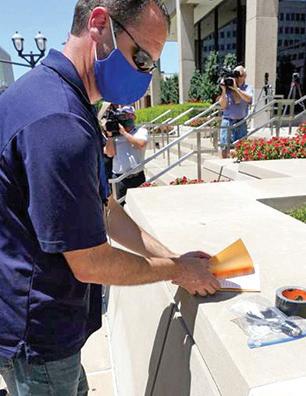
American, was not credited for having previously reported the death threat — maybe I had reported it too quietly; maybe local Black newspapers are not accorded full professional respect by major metropolitan newspapers.) It would surprise me if my source, who was in a good position to know, were correct about Gardner being deaththreatened but mistaken about Burgdorf and his partner receiving threats. I figured that either the police spokesman had not told me the truth or Burgdorf had not told her the truth — and that Burgdorf thought he could take care of himself.
Certainly his physical presence, sensed in passing, was poised, calm and confident. And most cops in 2020 would say that every day is a death threat (as surely as every cop looks like a walking death threat to many people).
A few days later, on July 15, Gardner talked on the record with the Washington Post about the death threats made to her. (The newspaper that I work for, The St. Louis
A handful of days after that Washington Post report, Gardner did file charges against the McCloskeys (both for unlawful use of a deadly weapon, in the subcategory of “exhibiting” or flourishing, a Class E felony). The probable cause statement was written by Curtis Burgdorf. Burgdorf makes no mention
of two crucial elements of the McCloskeys’ defense, which Mark McCloskey had been making on national television shows that had caught the attention of the president, the governor, a U.S. senator, and the Missouri attorney general. Burgdorf does not mention that the McCloskeys live on a private street or that they claim the pistol wielded by Patricia McCloskey, which I had seen Burgdorf take into evidence, was inoperable. The prosecution clearly intends to proceed as if the privacy of the McCloskey’s street (Portland Place) and the alleged inoperability of the pistol are not obstacles to proving their guilt. But all of the angry white men all over the nation hurling insults at this Black woman prosecutor are overlooking the fact that a white man — a white male officer — signed a statement asserting probable cause that they are guilty of the crimes for which Gardner charged them.
Burgdorf also contradicts a claim made by the McCloskeys’ (now former) attorney just before Burgdorf showed up to take the pistol into evidence. Watkins claimed that he was given the pistol because of the way Patricia McCloskey had wielded it — pointing it right at protestors with her finger on the trigger — made it possible that she would be charged with a crime. Images of her pointing the pistol at people with her finger on the trigger were widely available, as Burgdorf noted in his statement. In the photos and video I have seen, Mark
McCloskey does not have his finger on the trigger and is not pointing it at anyone (except, possibly, his wife, but that is another story). Watkins claimed the assault rifle wielded by Mark McCloskey had remained in their possession because they did not think he would be charged. Burgdorf had taken the rifle into evidence the night before while executing the search warrant that generated the news report that resulted in the death threats to Kimberly Gardner — and, I believe, to Curtis Burgdorf. But Burgdorf, clearly, has a witness who contradicts Mark McCloskey’s claim. Burgdorf writes quite plainly in his probable cause statement for the charges against Mark McCloskey that the defendant “lowered his semi-automatic rifle and pointed it towards the group of protestors walking through the gate and onto Portland Place,” the privacy of which is not mentioned as being irrelevant — one must assume — to the guilt or innocence of the accused.
“I, Curtis Burgdorf,” his probable cause statement begins, “knowing that false statements on this form are punishable by law, state that the facts contained herein are true.” That means that the president, governor, U.S. senator, and Missouri attorney general rising to the defense of the McCloskeys to attack Kimberly Gardner think this police officer, Curtis Burgdorf, is a sworn liar who should be punished by law.

‘Time and again, Reverend Vivian was among the first to be in the action’
By American staff
Civil Rights Movement lead-
er Rev. Cordy Tindell “C.T.” Vivian died on Friday, July 17 of natural causes in his Atlanta home. He was 95.
“We’ve lost a founder of modern America, a pioneer who shrunk the gap between reality and our constitutional ideals of equality and freedom,” said President Barack Obama.
“I admired him before I became a senator and got to know him as a source of wisdom, advice, and strength on my first presidential campaign,” Rev. Vivian was born in Boonville, Missouri, on July 30, 1924. He and his late wife, Octavia Geans Vivian, had six children.
As a small boy he migrated with his mother to Macomb, Illinois. Vivian graduated from Macomb High School in 1942. He attended Western Illinois University in Macomb. His first professional job was recreation director for the Carver Community Center in Peoria, Illinois. There, Vivian participated in his first sit-in demonstrations, which successfully integrated Barton’s Cafeteria in 1947. With the help of his church,
he enrolled in American Baptist Theological Seminary in Nashville in 1955.
Rev. Vivian participated in the Freedom Rides and constantly worked alongside the Rev. Martin Luther King Jr. According the National Visionary Leadership Project, Rev. Vivian and other ministers founded the Nashville Christian Leadership Conference, an affiliate of the Southern Christian Leadership Conference, NVLP said. The group helped organize the city’s first sit-ins and march for Civil Rights. By 1965, he rose to become the director of national affiliates for the Southern Christian Leadership Conference when he led a group to register to vote in Selma, Alabama.
Rev. Vivian is seen in footage being beaten until bloodied by Sheriff Jim Clark after he told Clark, “We will register to vote because as citizens of the United States we have the right to do it.”
“Because of them, the idea of just, fair, inclusive, and generous America came closer into focus,” Obama said of Rev. Vivian and other civil rights heroes. “The trails they blazed gave today’s generation of




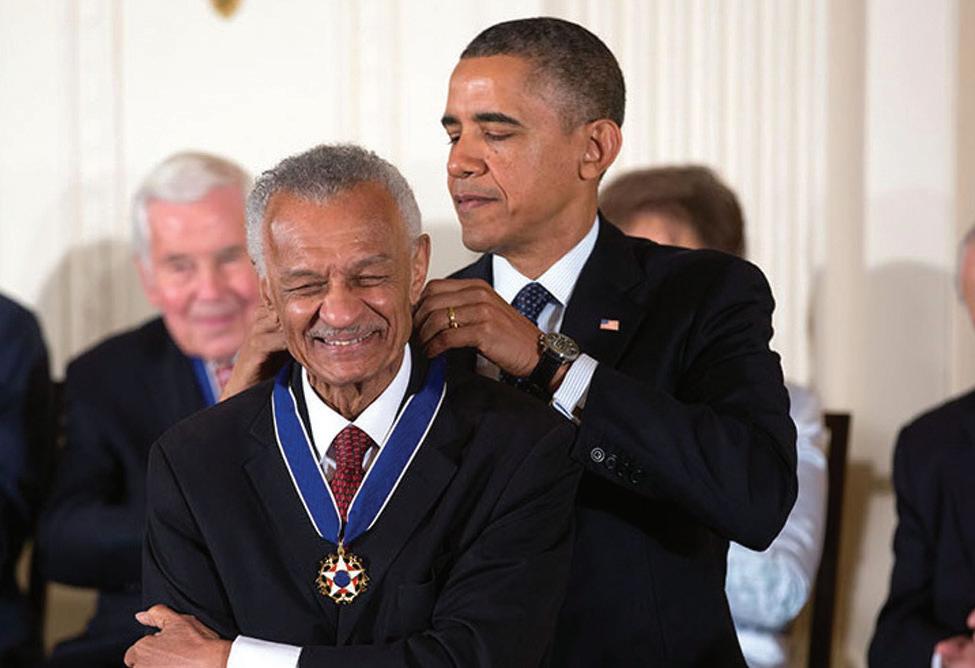
17% of voters undecided on choice of governor
By Chris King Of The St. Louis American
State Auditor Nicole
Galloway is in a statistical tie with Missouri Governor Mike Parson with 17% of voters undecided, according to a new Saint Louis University/YouGov Poll of likely Missouri voters.
The poll – of 900 likely Missouri voters interviewed between June 23 and July 1 – also found Joe Biden trailing Donald Trump by 7%, with 4% of voters undecided.
activists and marchers a road map to tag in and finish the journey.”
Rev. Vivian was also an advocate for providing educational opportunities within the African American community. He created a college readiness program to help “take care of the kids that were kicked out of school simply because they protested racism.”
The U.S. Department of Education used his Vision program as a guide to create Upward Bound, which was designed to improve high school and college graduation rates for students in underserved communities.
In 2013, President Barack

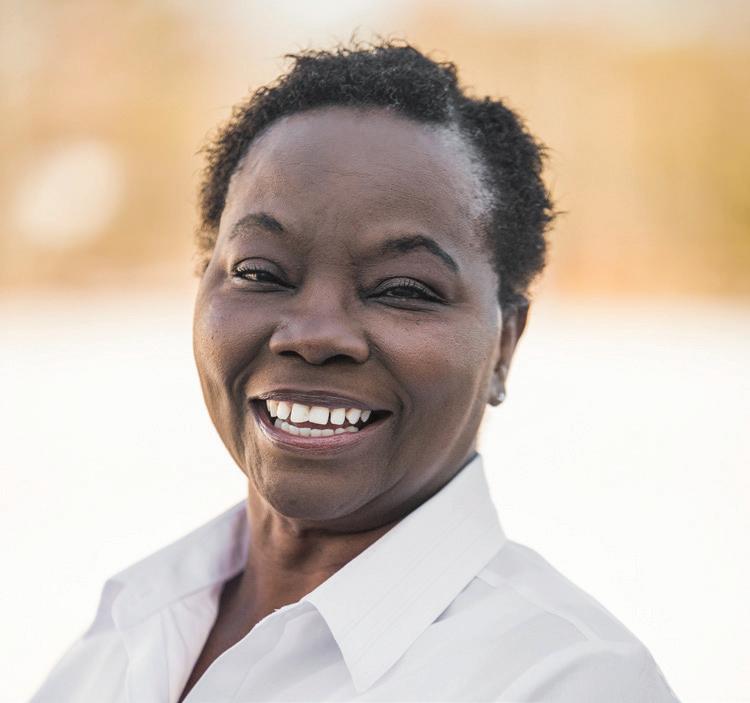


Obama awarded Rev. Vivian the Presidential Medal of Freedom, the nation’s the highest civilian honor.
“Time and again, Reverend Vivian was among the first to be in the action: in 1947, joining a sit-in to integrate an Illinois restaurant; one of the first Freedom Riders; in Selma, on the courthouse steps to register blacks to vote, for which he was beaten, bloodied and jailed,” Obama said during the ceremony for Rev. Vivian.
“Rosa Parks said of him, ‘even after things had supposedly been taken care of and we had our rights, he was still out there, inspiring the next generation, including me.’”
Galloway, who received The St. Louis American’s endorsement in the August 4 Democratic Primary, polled at 39% and Parson at 41%.
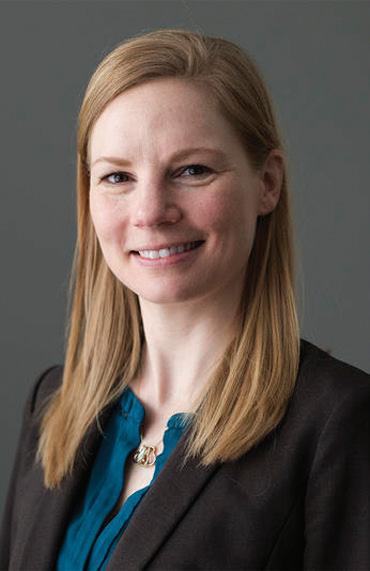
“While Parson leads Galloway, the results of our poll show a statistical tie,” said Kenneth Warren, associate director of the Saint Louis University/YouGov poll. “Given the high percentage of undecided voters, there is a lot of uncertainty in this race just four months from election day.”
Both Parson and Galloway still need to win a primary election to advance to the general election, but neither has a challenger who has mounted a credible campaign. Both Parson and Galloway have been elected statewide before. Parson was elected lieutenant governor in 2016 and became governor upon the resignation of Eric Greitens. Galloway was elected auditor in 2016 after being appointed to the position after the suicide of Thomas Schweich. In the poll, not surprisingly, Parson shows strong support among white, Republican, Evangelical voters living disproportionately in rural Missouri, while Galloway’s strength was found in Democratic strongholds in the Kansas City and St. Louis metro areas. Galloway’s support is bolstered by significant support among African American voters who overwhelmingly favor Democratic
See Voters, B7
We
Because it truly takes all of us—our backgrounds, our perspectives and our experiences—to move forward.
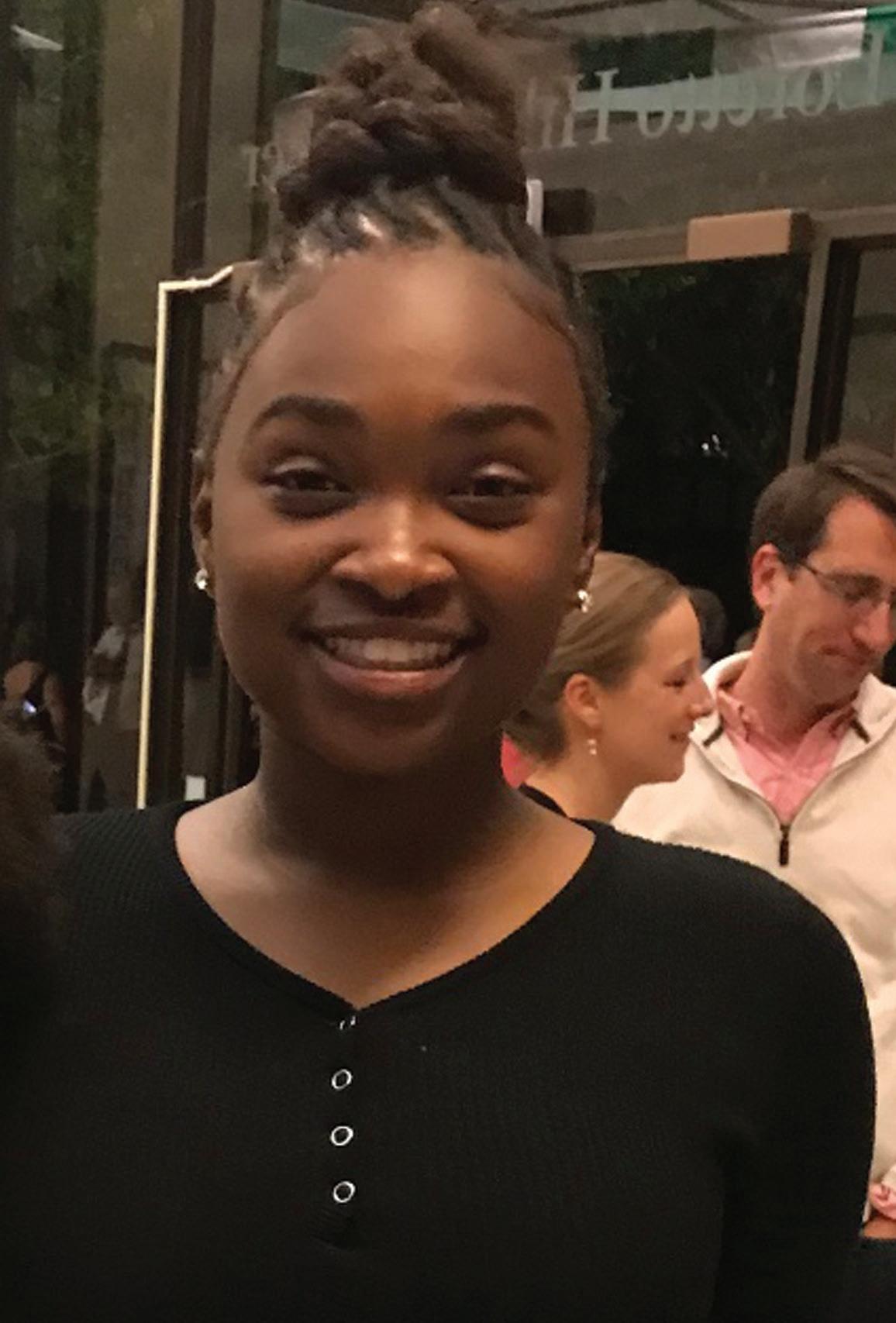
Margaret Mischeaux, an incoming senior at Normandy High School, received the Huber Award for her performance at the Virtual Spring Recital for Opera Theater of St. Louis Artist-in-Training Program. The award is the highest honor a junior can receive. To view a recording of the recital, visit the Opera Theater of St. Louis’ Facebook page.

Prosecutor says use of force by Christopher Gage and Matthew Schanz was illegal
By Rebecca Rivas Of The St. Louis American
St. Louis County Prosecutor Wesley Bell has charged two Velda City Police officers with first-degree assault, a Class A felony, and armed criminal action, an unclassified felony, for shooting at a car during a traffic stop.
“The law is clear on when deadly force is appropriate,” said Bell, during a press conference on Friday, July 24, “and this was an ordinance violation. This was a traffic stop. Using deadly force in a situation like this is not legal or justified.”
On February 25, Officers Christopher Gage, 37, and Matthew Schanz, 33, engaged in a traffic stop of a motor vehicle with expired temporary tags at the intersection of West Florissant and Octavia avenues, according to the probable cause statement.
Gage and Schanz said they smelled an odor of marijuana coming from the vehicle, and Gage told the driver, who is referred to as A.A., that they were going to search the car, according to the statement.
“This officer was going to search the car without probable cause,” Bell said.
Gage said he would arrest him if they found marijuana, and the driver fled down Octavia.
“At this point, Defendant Schanz falsely reported over his police radio that A.A. had tried to run them over,” according to the probable cause statement. “A.A. turned around at the end of the block because he was on a dead-end street.”
At that point, the two officers were standing in a small parking lot. But when the car came back down the street, Schanz walked out into the middle of the roadway and yelled to stop, it states.
Schanz fired his handgun as the car was coming towards him, then when it drove around him and he continued firing as the car drove past him and into a busy intersec-

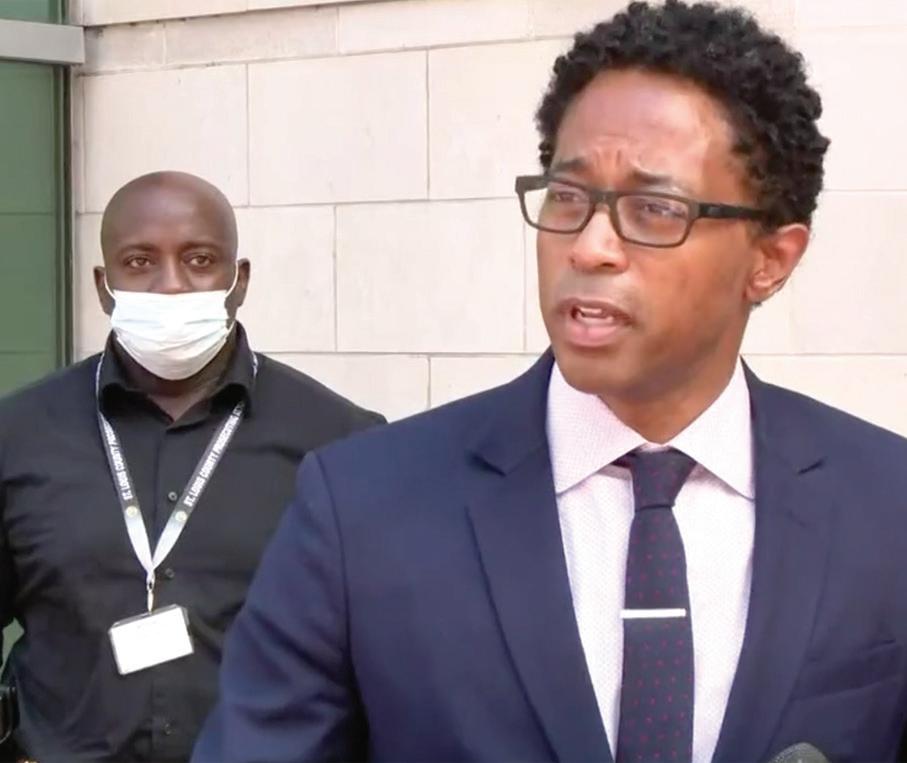
tion, Bell said.
The driver was hit by the gunfire and suffered “serious physical injury.”
“What the officers did was against the law,” Bell said. “There is audio and video of this matter. Once the car passes, there is no fear at this point. This was, at best, an ordinance violation.”
The St. Louis County Police Department investigated the incident and referred to charges to Bell’s office on June 23. Bell’s Conviction and Incident Review Unit, which is independent from the rest of the prosecutor’s office he said, is handling the prosecution. Both officers have a bond set at $75,000, but are authorized to pay 10 percent to remain out of jail.
Schanz was on his way to turn himself in and pay his bond when he saw the press
conference going on, he told the press. He explained that he “feared for his life,” and he has been on paid medical leave for the past five months, due to the PTSD of the shooting. Both officers have 10 years of experience as officers, he said. Schanz said he worked for the St. Louis Metropolitan Police Department for six of those years.
“I would not have done anything differently,” Schanz said. “It’s sad really, if you ask me, that police officers around the country are going through this.”
The Riverfront Times reported that Schanz previously was forced out of the St. Louis Metropolitan Police Department following a 2013 incident when he was charged with domestic assault and resisting arrest, though the criminal charges were dropped.

$1.3K in federal funds is lost for each person not counted
By Chris King Of The St. Louis American
The deadline to complete the 2020 Census and be counted is Halloween, so perhaps Vinita Park Mayor James McGee can be forgiven for using a scare tactic.
“I have a liaison going door to door and block watch captains going door to door telling people to fill out their Census forms or they could lose services,” McGee said.
The Census, which is mandated to count every person living in the United States wherever they are living every 10 years, is used to apportion federal funds where they are needed. Any place where the population is undercounted will be underfunded.
“Missouri received approximately $16.5 billion in federal funds in FY2016, which were directly calculated from Census data,” according to the Missouri Foundation for Health. “In fact, for every adult and every child that is not counted, Missouri loses an estimated $1,300 in federal dollars.”
Ethel Byndom, Census coordinator with St. Louis County’s Office of Community Empowerment, reminded the public that the Census Bureau is mandated to count all people living here “regardless of status.”
McGee, whose city had 1,800 residents counted in the 2010 Census, has a Spanish speaker working on the 2020 Census providing public education.
“He is going to Hispanic households telling them to fill out the 2020 Census and letting them know that the information you provide cannot be used against you,” McGee said. By law, the Census Bureau cannot share the data it collects with other federal or state agencies other than to produce statistics.
Vinita Park is patrolled by the North County Police Cooperative. It’s an indication of the mayor’s confidence in their community policing that he uses a Spanish-speaking police officer to approach Hispanic households for the Census.
North County mayors shared Census strategies on Wednesday, July 15 when the Urban League of Metropolitan St. Louis convened them with county officials at its Ferguson Empowerment Center.
Ferguson Mayor Ella Jones said her city had been sending around a mobile unit with computers before the pandemic struck. The 2020 Census form can be completed online, via mail and even by phone. Now Ferguson is posting 2020 Census signs in public. Cool Valley Mayor Jason Stewart said his city is sending reminders about the 2020 Census using the app Next Door.
The Urban League of Metropolitan St. Louis is doing its part. President and CEO Michael P. McMillan said the agency has passed out 40,000 Census reminders in its weekly mass distribution of food and necessities as part of its
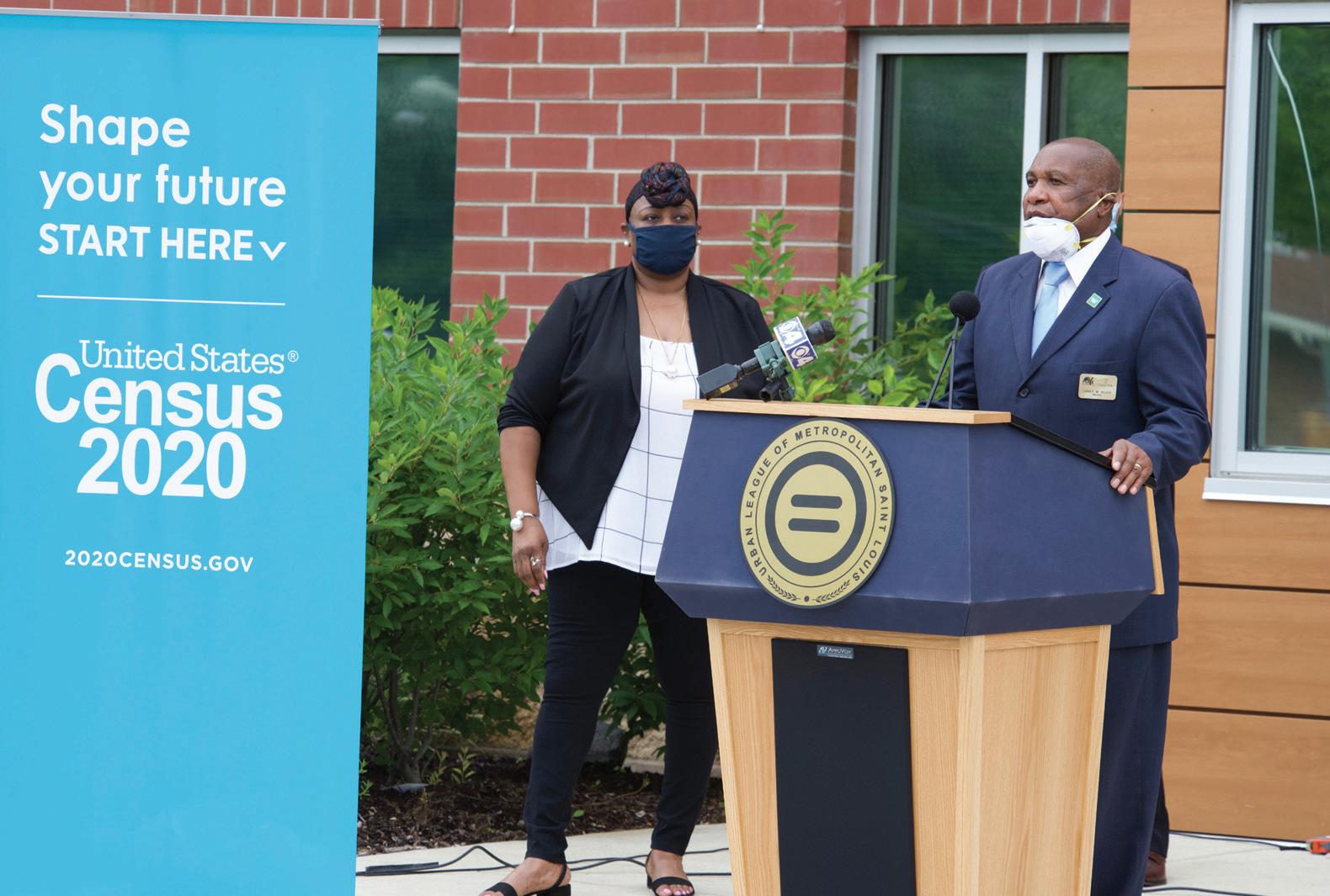
COVID-19 relief efforts.
McMillan pointed out that “so many federal bureaucracies essential to our well-being” rely on Census data to apportion funds. The Ferguson Empowerment Center was built on the grounds of the QuikTrip torched during the Ferguson unrest using federal New Market Tax Credits, he said. West Florissant Avenue, where the center is built (and once the site of protests seen all of the world), has been refurbished
using federal funds.
Byndom offered her own list of essential services and institutions dependent on Census data. “It helps determine where we build new schools, hospitals and businesses,” Byndom said, “as well as how federal funds are distributed” for things like Medicaid, housing and food programs.
Census data also is used to determine federal representation. All states have two senators, but U.S. representatives
are assigned based on population as recorded by the Census.
McMillan offered the painful reminder that the St. Louis region lost a confessional district and seat because of a low Census count in 2010.
The St. Louis Regional Chamber projects that 19,000 people in Missouri could go undercounted in 2020 “under a medium risk scenario.” McGee, for one, is not having it. With the October 31 deadline just over three months
away, he said that Vinita Park is at a 60% Census response rate. That just means he is 60% of the way there. He said, “I am looking for 100%.” Completing the 2020 Census’ nine questions takes less than 10 minutes and can be done online at my2020census. gov, by phone (844-330-2020), or by mailing back the 2020 Census form mailed to you.

AvoteforMedicaidExpansioninMissouri means taking better care of our families and our community. It means we decide what’s best for us.
Expandcoveragetoinclude:
Missourians earning less than $18,000, because no hardworking family should have to choose between paying for life-saving care and putting food on the table
Thousands of uninsured veterans
Working women who need access to preventive care, including breast and cervical cancer screenings
Bringbillionsofourtaxdollarshome fromWashingtonto:
Protect frontline healthcare jobs
Keep rural hospitals open so all Missourians can access care
Save the state up to $1 billion and create thousands of new jobs
Freeupstateresourcestoinvestineducationand transportation

July 23, 2020 (ST. LOUIS, MO)—The Urban League of Metropolitan St. Louis, Inc. will salute the American Legion’s Tom Powell Post #77 at its weekly Covid-19 emergency relief effort July 25, 2020 at 11:30AM at the old Jamestown Mall in Florissant, MO. Congressman William Lacy Clay helped salute the veterans and distributed supplies with volunteers.
The Tom Powell Post was formed by 15 African American veterans and remains the only African American Post in the American Legion. The group is unusual within the American Legion for having veterans from the eras of four conflicts: World War II, Korea, Vietnam and the fighting in Iraq and Afghanistan. In addition the Urban League saluted Commander Darlene Coats, Master Sergeant, US Air Force and Specialist Rufus Shannon, US Army. “Our veterans are experiencing hardships during this pandemic and we want to be sure we support them during this time with food and other emergency supplies from our weekly food distribution,” said Michael P. McMillan, President and CEO of the Urban League. “We also want to honor the rich history and legacy of the Tom Powell Post so that people will better understand their sacrifice and service.” The Urban League has distributed more than $2 million in emergency relief items including food, fresh produce, and PPE free to more than 40,000 families over the past 16 weeks.
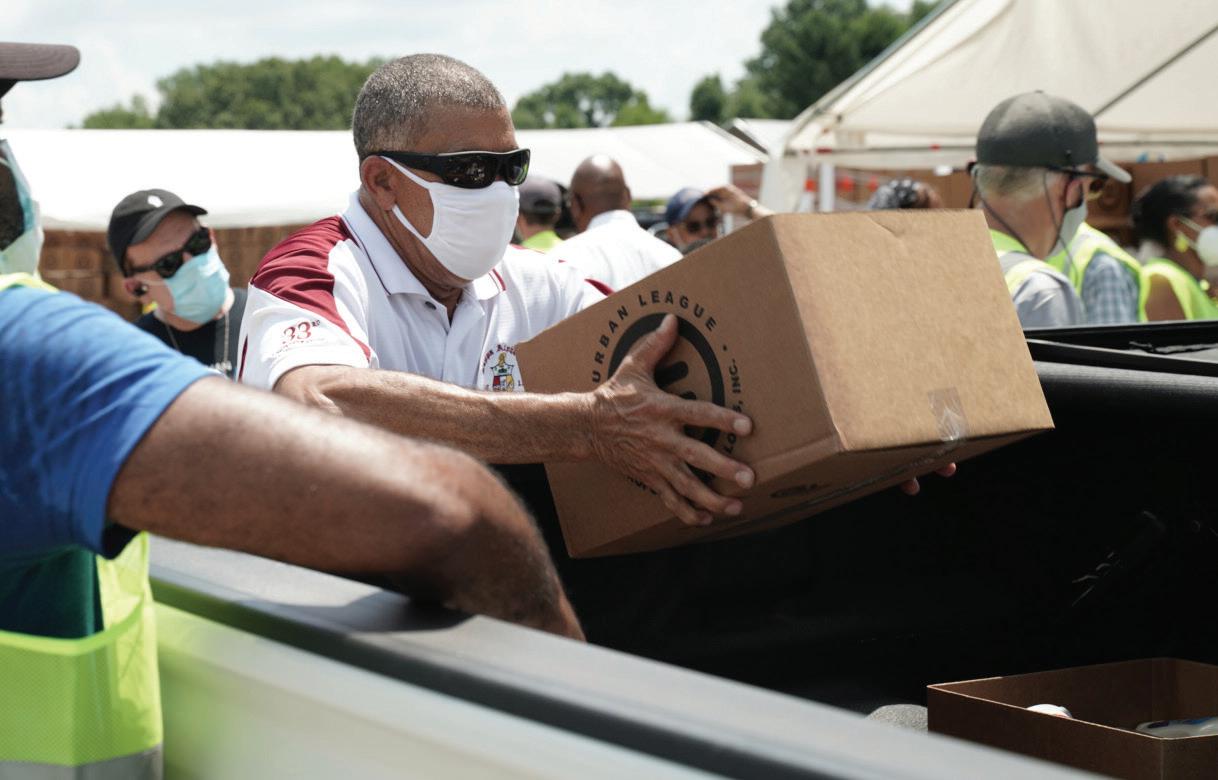
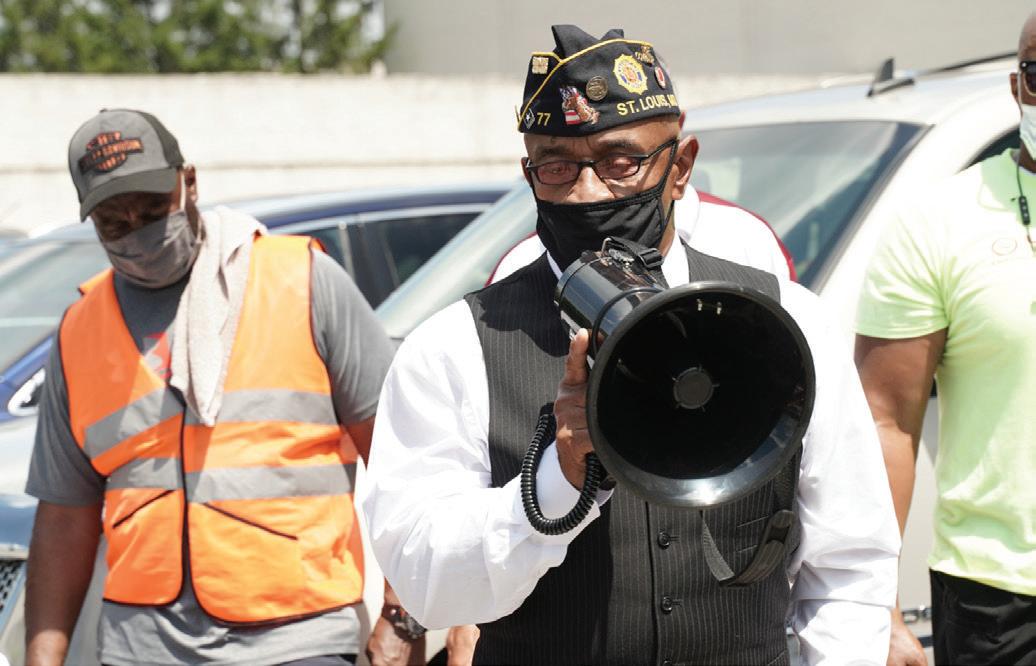
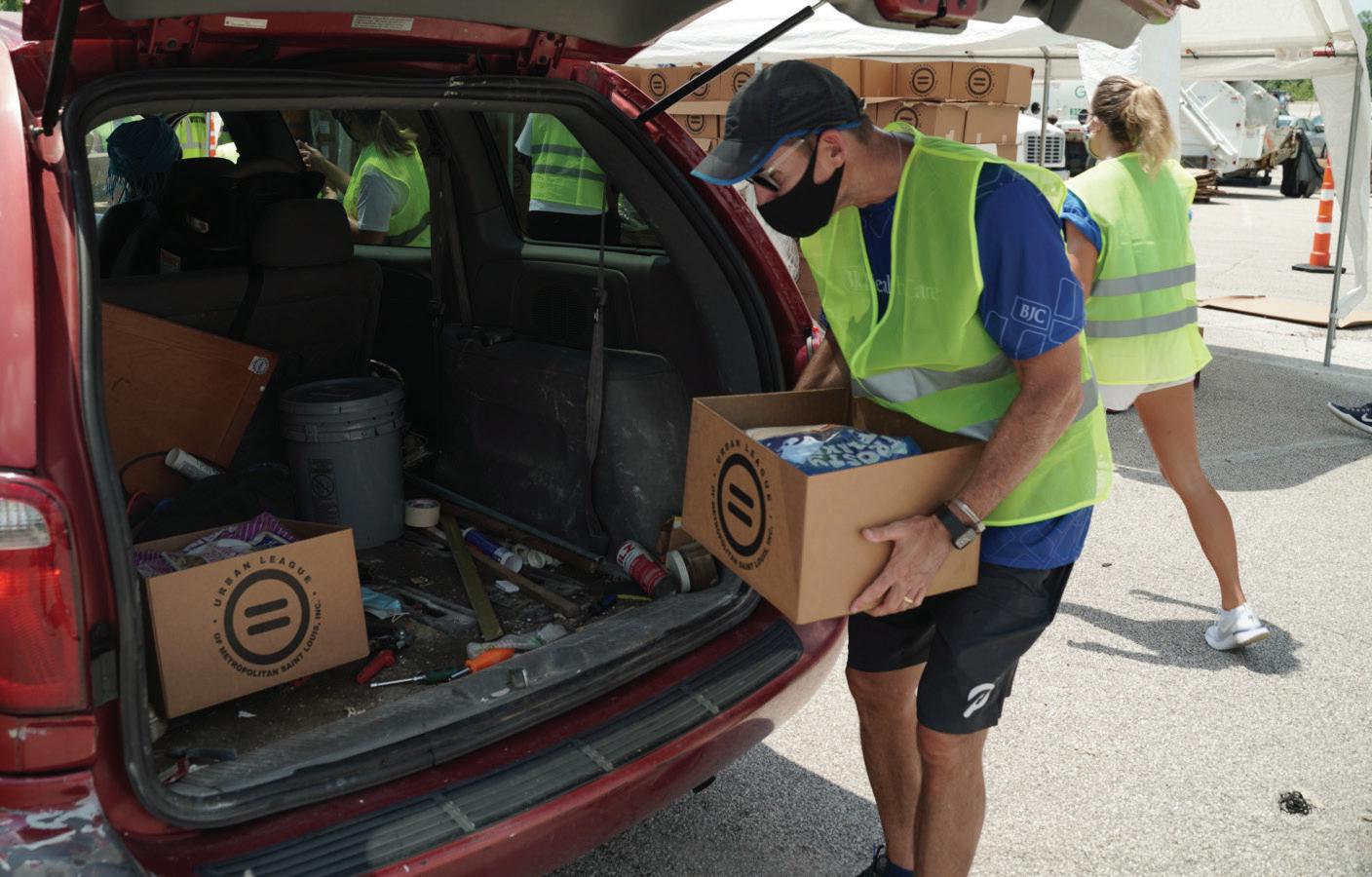
By state Rep. Steve Roberts For The St. Louis American
On May 5, 2017, Tory Sanders ran out of gas on the outskirts of Charleston in Mississippi County, Missouri.
When he called his mother and asked her what to do, she told him to ask the police for help. Sanders died the next day. He did nothing unlawful – but was taken into custody by the same police officers he believed would help him. He was tortured, beaten, tased, and pepper sprayed. He was killed less than 10 hours after being admitted to the Mississippi County Detention Center. He lived his last moments unable to breathe, with a policeman’s knee on his neck.
There have been no charges filed in this case.
Along with Rod Chapel, the president of the Missouri NAACP, I have contacted the Missouri Attorney General’s Office several times, hoping for an update on the investigation into the killing of Tory Sanders. Each time, we’ve been told that the investigation is ongoing and the Attorney General’s Office cannot comment. Attorney General Eric Schmitt has not provided further information or guidance on the development of the investigation.
On June 28, Patricia and Mark McCloskey stood outside their mansion in St. Louis’ Central West End and menaced peaceful protesters with a handgun and a military-style assault rifle. Images of the couple made national news and quickly circulated around the Internet – an all-too-perfect visual representation of our times. Subsequently, the St. Louis Circuit Attorney’s office filed charges against the couple for threatening peaceful protesters. Less than 24 hours after the
charges were filed, Schmitt reacted by releasing a passionate statement asserting that, as Missouri’s chief law enforcement officer, he would immediately enter into this case and seek a dismissal.
Schmitt’s actions in these two cases show unequivocally which he cares about and which Missourians he does not consider worthy of attention.
The Attorney General’s Office did not investigate the incident involving the McCloskeys, and Schmitt’s actions are based on nothing more than a blind judgment on the merits. Governor Mike Parson has already spoken about pardoning the McCloskeys, which makes Schmitt’s actions even more baffling.
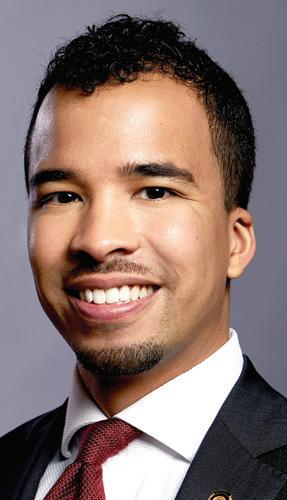
A pardon would only take place if – after a presentation of the evidence – a jury found Mr. or Mrs. McCloskey guilty. Schmitt is attempting to circumvent the prosecution of the case altogether – without knowing the facts or with indifference to them. He is making it clear that his office does not care whether a crime was committed or not.
Schmitt feels this incident is so important that he must take the unprecedented action of intervening in the case of a local prosecutor—while, at the same time, he feels that the murder of Tory Sanders is so insignificant that, three agonizing years later, his office has yet to take any action at all.
Schmitt responds immediately to a case of rich white lawyers waving guns around on the lawn of their mansion, while
he delays any form of justice for a Black man killed in police custody.
Unfortunately, this attention to certain lives and disregard for others is not an exception, but the rule. These two cases serve as undeniable examples of the systematic racism that permeates this nation.
Tory Sanders was a father, husband, and son. His life was taken while he was in police custody. His family deserves justice – which, at the very least, includes a comprehensive examination of the case and an honest effort to seek justice.
The McCloskeys are neither indigent nor need the backing of the Attorney General’s Office; they have already hired counsel and are among the wealthiest lawyers in the state. They face a charge for which they are already being offered diversion. Yet, Schmitt acted on their behalf without conducting any investigation.
This is the unfortunate reality of Black people and other minorities in this country. Indifference is as great a problem as hatred, perhaps more so.
The McCloskeys are going to be all right. In one of the chief ironies of the situation, they were never in danger. Tory Sanders, on the other hand, is still dead. His young children will never know their father. The disparity in how Schmitt has handled these two cases lays bare which lives truly matter in Missouri.
“Enough is enough,” Schmitt said in a video posted to Twitter.
Enough is enough, indeed.
Steve Roberts (D-St. Louis) represents District 77 in the Missouri House of Representatives and chairs the Missouri Legislative Black Caucus.




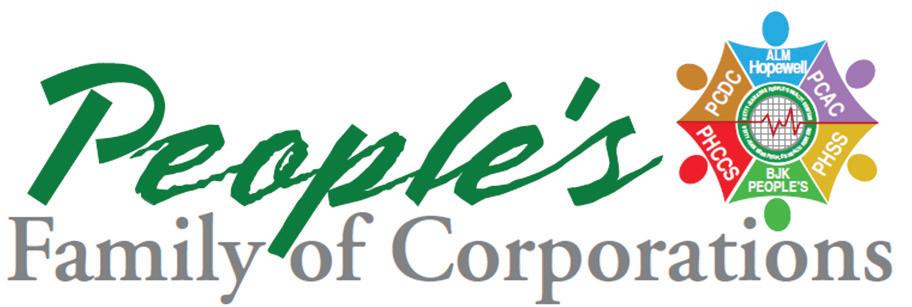


Black, Latinx and Indigenous students are less likely than their white peers to have adequate internet access.
American staff
Harris-Stowe State University has made the decision to temporarily close its campus in response to several employees testing positive for COVID-19. According to a statement from the university, eight employees, all located in the Henry Givens, Jr. Administration Building, tested positive for COVID-19 during a three-week period.
The campus has been closed since Wednesday, July 22 to all students and non-essential personnel to conduct a deep cleaning of the entire campus. Officials said that the cleaning will be conducted by a third-party vendor specializing in this process.
“We continue to work closely with public health officials to ensure that we are not only following all protocols, but are doing everything we can for our staff, our students, and all who will be on campus,” the university said in a statement.
The campus, including the William L. Clay Sr. Early Childhood Development Center, will reopen on August 10. The university plans to start the fall semester as scheduled on Monday, August 24, and end on-campus presence on Friday, November 20. The last three weeks of classes will be conducted remotely in an effort to mitigate risks from the global health crisis.
By Elle Moxley
Of KCUR
Even fewer Missouri students have reliable internet connectivity than previously thought, according to a new report from the nonprofit Common Sense Media. The group, which makes entertainment and technology recommendations for families, estimates that 36% of Missouri students don’t have adequate internet access for virtual learning. An earlier Missouri Department of Elementary and Secondary Education survey put that figure at 23%. Both studies found that cost was the biggest barrier to access.
“A lot of companies are offering plans for $50 a month, but you have to be very careful when it comes to how much
internet access you’re getting,” said Danny Weiss, a senior policy analyst for Common Sense Media. “Adequate means it’s a high enough speed, and it doesn’t have data caps that are going to get in your way.”
This past spring when COVID-19 shut schools down, districts across the country handed out wireless hotspots so kids could get online. But Weiss said such devices are a stopgap for reliable, wired internet access.
“Speed is a problem with hotspots,” Weiss said. “The second issue is data caps. A lot of the times they’re given out to a particular person in the household to use, but you have a couple of students in the house that go to different schools, and they all need to be able to connect.”
And the lack of connectivity can further existing inequality
among students. Black, Latinx and Indigenous students are less likely than their white peers to have adequate internet access.
Schools are calling this “the COVID slide,” and the effects could be more pronounced than the learning loss that typically occurs over a 10-week summer vacation. It’s one of the reasons why some pediatricians want schools to reopen this fall.
“We know that school closures have had a pretty significant impact on our children – food insecurity, child abuse, trauma, obesity, loneliness and mental illness health issues – and this does not even compass all of the issues,” said Dr. Jennifer Schuster, a pediatric infectious disease expert at Children’s Mercy Hospital. “And there’s a huge impact on the educational component as well.”

Teachers, however, are extremely skeptical of the recommendations Children’s Mercy has put out for schools to reopen in the fall. They say that social distancing is an impractical solution for already overcrowded classrooms, and many are scared that in-person instruction will expose their families to the coronavirus.
Many teachers, instead, say they would prefer to continue teaching online until a vaccine is available.
According to Weiss, the senior policy analyst at Common Sense Media, that would require the U.S. to make an immediate, $4 billion investment in internet connectivity.
Republished with permission from https://news. stlpublicradio.org.
Harris-Stowe will offer three types of classes this fall: classes that meet remotely with no specified time, classes with a specific time of meeting for at least 50% of instruction, and classes with at least 50% virtual at a specific time or online(time not specified with the remaining sessions at a specific time (in person for some students).
Students, faculty, staff and visitors are required to wear face masks when entering campus buildings and in all public areas. The university will provide reusable face coverings to all students, faculty and staff.
All community members are expected to follow recommendations regarding social/physical distancing both inside and outside of buildings. Classrooms and common areas have been reconfigured to apply with social distancing. Plexiglass, rope stanchions, and floor markers have been installed in student services and high traffic areas.
Community members are expected to monitor themselves for symptoms of COVID-19. Any faculty, staff and/or students who are symptomatic should remain home and should contact their healthcare providers. The university will conduct daily temperature checks and health surveys for all employees as mandated by the City of St. Louis.
All housing students will reside in single-bed suites, and there will be one student in designated double-bed rooms to ensure social distancing. Four suites on the first floor of Gillespie Hall will serve as isolation rooms.
Corey S. Bradford Sr., university president, said that the university will continue to work with health officials and amend the plan as needed. The university’s Fall 2020 COVID-19 Campus Reopening Plan is posted at www.hssu.edu/c19.
For the full list of program criteria, visit stlcc.edu/go/TakeOneOnUs

Winner of August 4 primary will face incumbent Eric Schmitt in November
American staff
Two promising candidates, Rich Finneran and Elad Gross, have filed for Missouri attorney general as Democrats in the August 4 primary. We asked both to make the case for our endorsement in a 500-word statement. Their unedited statements are below.
Rich Finneran
The people of Missouri deserve an attorney general who is experienced and committed to equal justice under the law. Our current attorney general, Eric Schmitt, is neither. That is why I am running to be your next attorney general. And it’s why I’m asking you to support me in the Democratic primary.
Our current attorney general has spent far more time making deals in backrooms than trying cases in the courtroom. He is a career politician who only became attorney general because our unelected governor appointed him. I, on the other hand, have spent my career serving the people of the St. Louis region as a federal prosecutor.
While at the U.S. Attorney’s Office, I tried the two largest
Continued from B1
candidates.
“A potential explanation for the tightening governor’s race is how Parson has handled the COVID-19 crisis and the economy,” said Steven Rogers, director of the Saint Louis University/YouGov poll.
“Forty-seven percent of likely voters disapprove of how the governor has handled the COVID pandemic, and 71% of likely voters rate the Missouri economy as Fair or Poor. Given the pandemic’s impact on the state’s economy and the number of undecided voters in the governor’s race, it will be interesting to see how the pandemic plays out over the final few months of the campaign.”
Overall, less than half of Missouri voters approve of the Governor’s job performance.
Forty-five percent of voters polled stated they approved of Parson’s performance,
criminal fraud cases in the history of our state, including a $435 million insurance fraud scam affecting more than 70,000 people across 16 states. And I helped to recover millions for victims along the way. My experience as a federal prosecutor dwarfs Eric Schmitt’s and every other candidate in this race combined, from any party, and provides the clear contrast we need to defeat Eric Schmitt in November.
Throughout my career, I have demonstrated my commitment to promoting equality and fairness in our justice system and in our broader society.
From the day I announced my campaign, I have been a vocal critic of Eric Schmitt’s efforts to overturn Obamacare in the Supreme Court. I wrote in this very paper—more than six months ago—to advocate for the release of Lamar Johnson, an innocent man Circuit Attorney Kim Gardner has sought to set free, but whom Eric Schmitt has fought to keep locked up. I have pledged to modernize the hiring practices of the Attorney General’s Office to promote diversity and inclusion, and I have defended the rights of protestors who have called for equal justice in our state.
with a 43% disapproval rating. Parson’s approval rating among Missouri Republicans is 79% but only 16% among Democratic voters. YouGov’s opt-in survey panel is comprised of 1.2 million U.S. residents who have agreed to participate in YouGov Web surveys. Using their gender, age, race, and education, YouGov weighted the set of survey respondents to known characteristics of registered voters of Missouri voters from the 2018 Current Population survey. The margin of error for the weighted data is 3.95%.
As for Trump, he still shows strong support among voters without a college degree, but his support among four-year college graduates is sharply down. “Among college graduates, Trump’s support has fallen from 55% support in 2016 to 41% in our poll,” Warren said. “While 45% of males with four-year college degrees say they will vote for Trump, only 36% of four-year college degreed women say they will.”
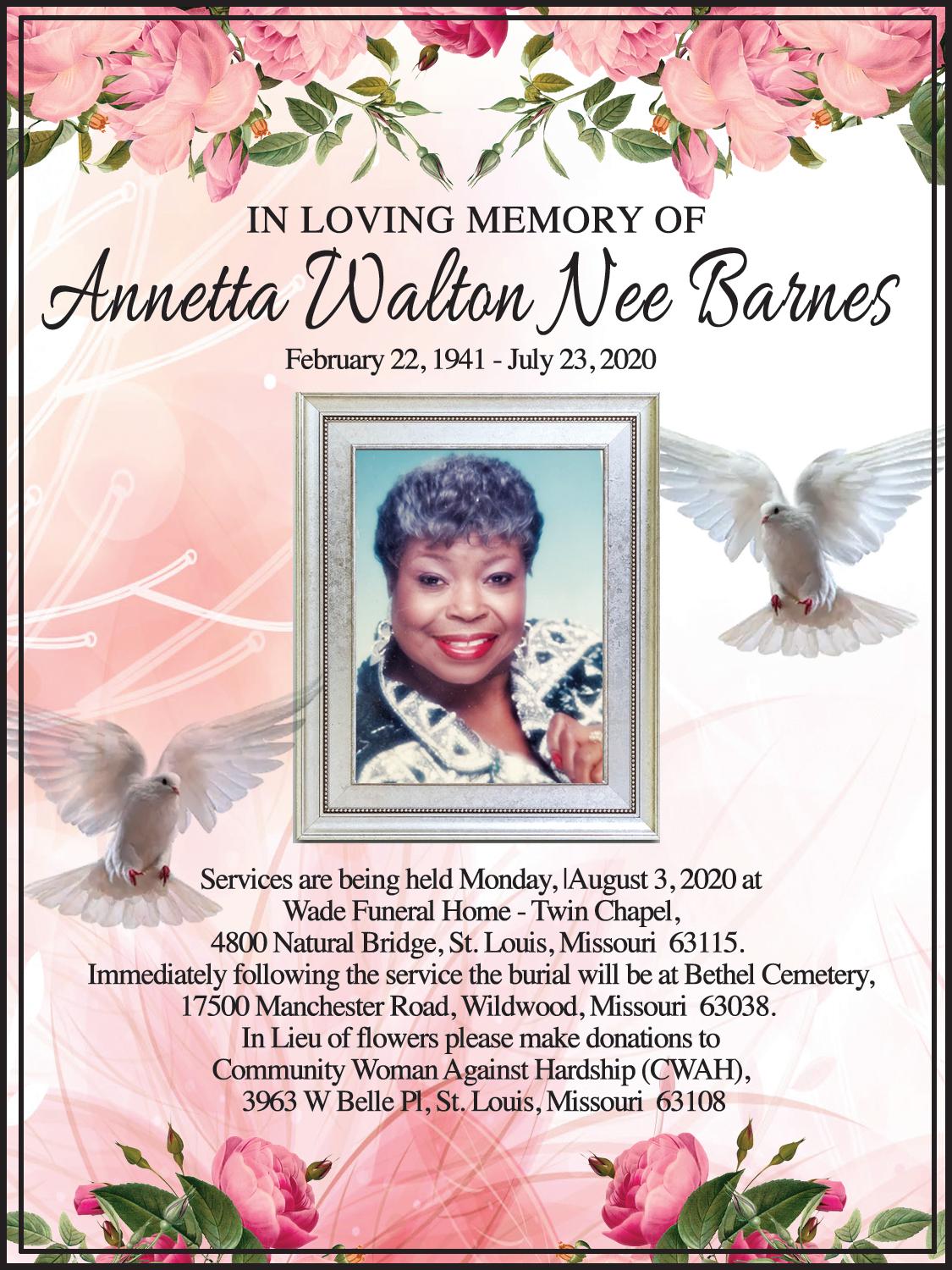
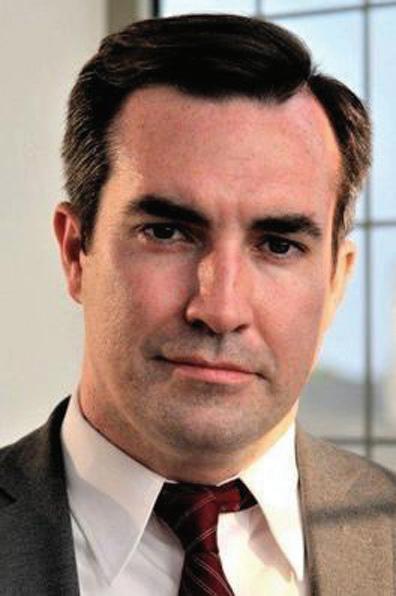

At a time when the broader public has finally started to acknowledge the failings of our criminal justice system, some might consider my background as a federal prosecutor to be a weakness. I believe it to be a strength. As a prosecutor, I practiced what I preached: I was smart on crime, not just tough on crime. I promoted diversion and rehabilitation alternatives for defendants who came before my office, and I declined far more cases in my career than I prosecuted.
Much like Representative Val Demings’s background as a police chief has made her a credible voice for reform within the law enforcement community, my background in the criminal justice system will empower me to help reform it. We all want to see change, but I have the experience and know-how to make that wish into a reality. I am ready to offer the people of Missouri new leadership that will finally produce the
systemic change many have promised, but few have delivered. We have assembled an incredible grassroots campaign that is poised to unseat our unelected attorney general in November. I hope to earn your vote on August 4.
Elad Gross
Missouri needs a fighter. I’m running for attorney general because of the children I’ve taught for over 13 years. I’ve served in classrooms throughout the City of St. Louis, from Walbridge to Froebel. Our government has abandoned our most vulnerable communities, and, throughout our state, we are perpetuating poverty and inequity of opportunity.
That’s why I became a civil rights attorney. I wanted to help my families have a real voice in our government. I have spent my entire career serving the People of Missouri. I’ve
seen what our government can do, and I know it can work so much better. I’m the only candidate for attorney general who served as an assistant attorney general. I was in charge of the busiest docket of cases in the state, and I handled well over a thousand cases and worked the hours of two attorneys during my time there. I ran the St. Louis intern program, developed efficiency projects that are still in use today, and trained attorneys in trial practice. When I left, I served as a volunteer special public defender, where I secured the release of an innocent teenager who was held in the Workhouse for seven months for a crime she did not commit. When I got her out, she asked me to help her. We initiated some of the most effective justice reform litigation in St. Louis, which led to major changes in multiple city offices and a dramatic decrease in the population at the Workhouse. I brought anti-corruption cases involving former Governor Greitens’ dark money scheme designed to sell our state to the highest bidder and steal it from the families I work with. I beat our attorney general and secured landmark Sunshine Law protections for the public and the media.
For well over a decade, I’ve shown up. I’ve shown up for
residents in the Bootheel, for organizers in St. Louis, for educators in Clinton. It’s why our campaign has so many endorsements from community members and leaders throughout our state, and it’s why there’s so much excitement around our campaign. I’m not just showing up as a candidate. I’ve always shown up. I’ve always fought for our state. That’s what I will continue to do as Missouri’s anti-corruption, pro-justice Attorney General. I’m the only candidate to release plans for the Office. You can find them at www. eladgross.org/solutions. I will start Missouri’s first Civil Rights Division to protect Missourians and bring accountability back to our state. I am the only candidate with a real diversity and inclusion plan for our state government. I am actively supporting the Medicaid expansion campaign. I will launch more aggressive consumer protections, especially when it comes to scammers, predatory lenders, and monopolists. We will launch Missouri’s first statewide coordinated effort to prevent violence. And we will institute major ethics reforms in Missouri. This is what our state can be with an attorney general who will fight for us. I’d be honored to have your endorsement.
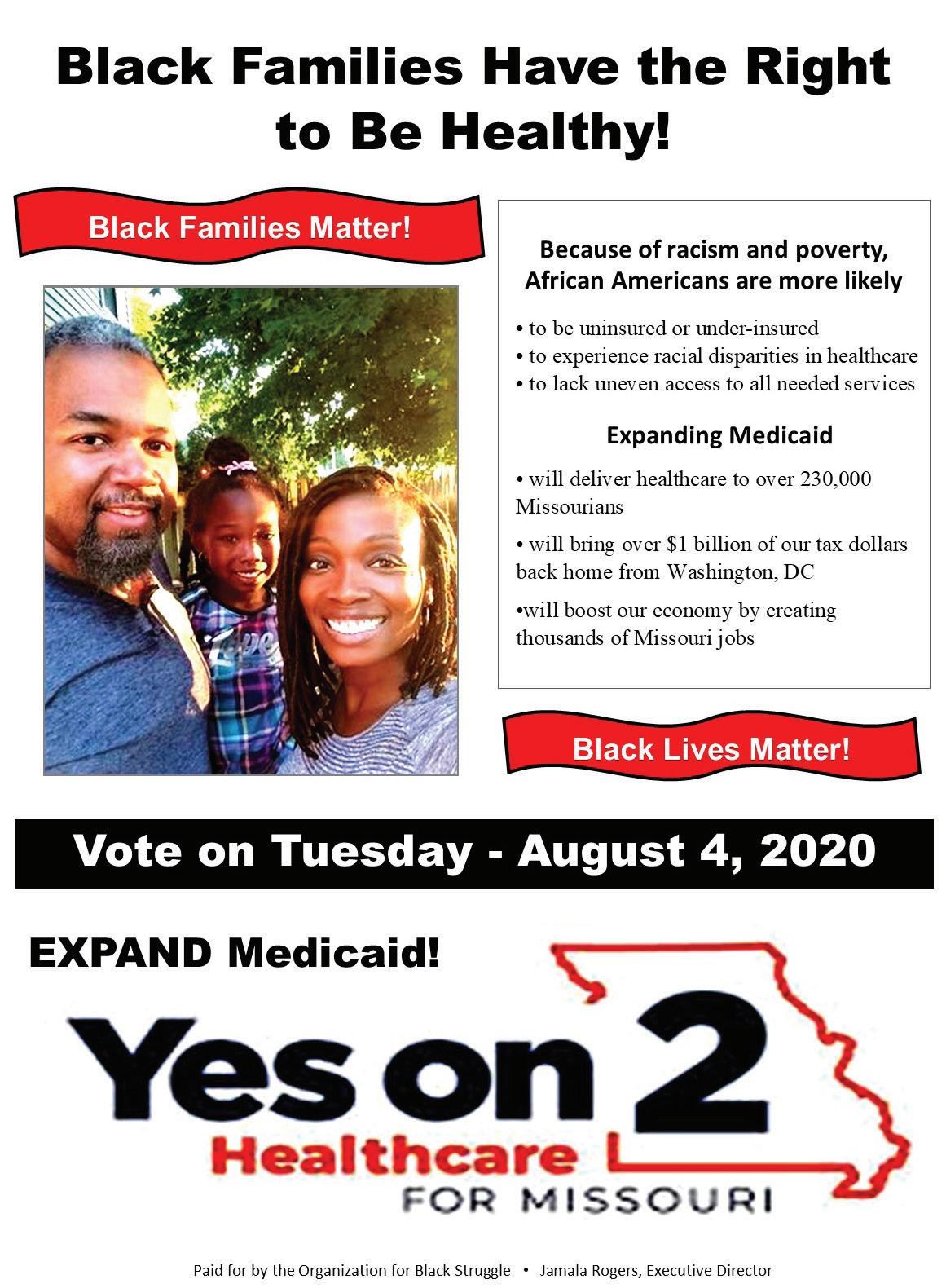

JULY 22, 2020 (ST. LOUIS, MO) — Grace Hill Settlement House, established by the Episcopal Diocese in 1903, and The Urban League of Metropolitan St. Louis, Inc., founded in 1918, are now one.
Michael P. McMillan, President and CEO of The Urban League officially announced the merger July 22, 2020 at 2pm, at the Grace Hill Water Tower Campus, 2125 Bissell Street. Bishop Deon Johnson, XI Bishop of the Episcopal Diocese of Missouri, Delores Hardwick, Grace Hill’s former Interim Executive Director, and Alex Silversmith, Chair of the Board of Directors, joined McMillan for the announcement.
Grace Hill’s existing programs will now be offered under the Urban League brand. The Water Tower Campus will be re-dedicated in the fall in honor of longtime Grace Hill supporter, Peter Bunce. “This is truly a historic moment and a model for the future,” McMillan said. “Combined, we have more than 229 years of service to the greater St. Louis community and we are now poised to continue delivering high-quality services, especially Head Start, in a more strategic and impactful manner.”
The merger follows two years of negotiations and careful, strategic planning.“The merger will allow Grace Hill to have an even greater impact, serving more children and families and fulfill our mission for years to come,” Hardwick said. Head Start / Early Head Start programs will be strengthened under the merger with a new $38
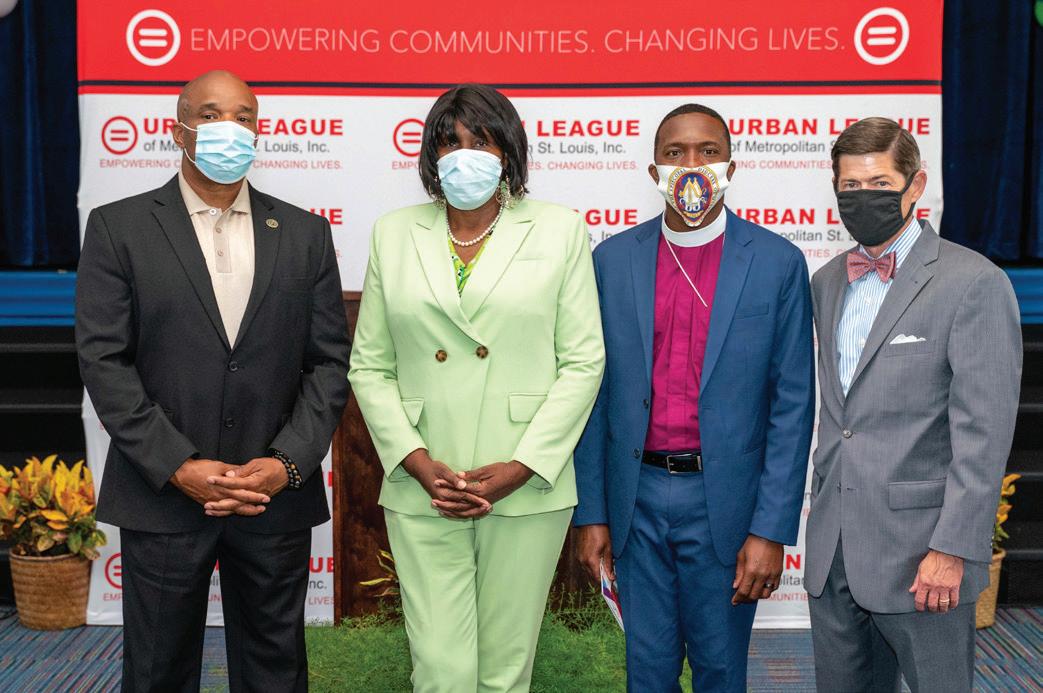
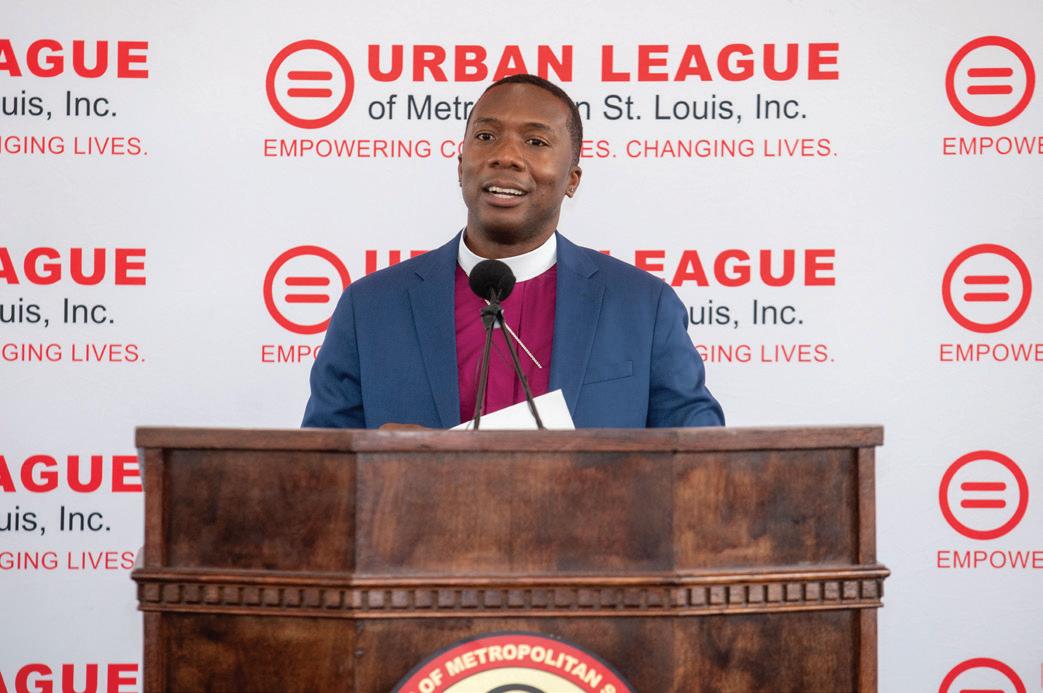
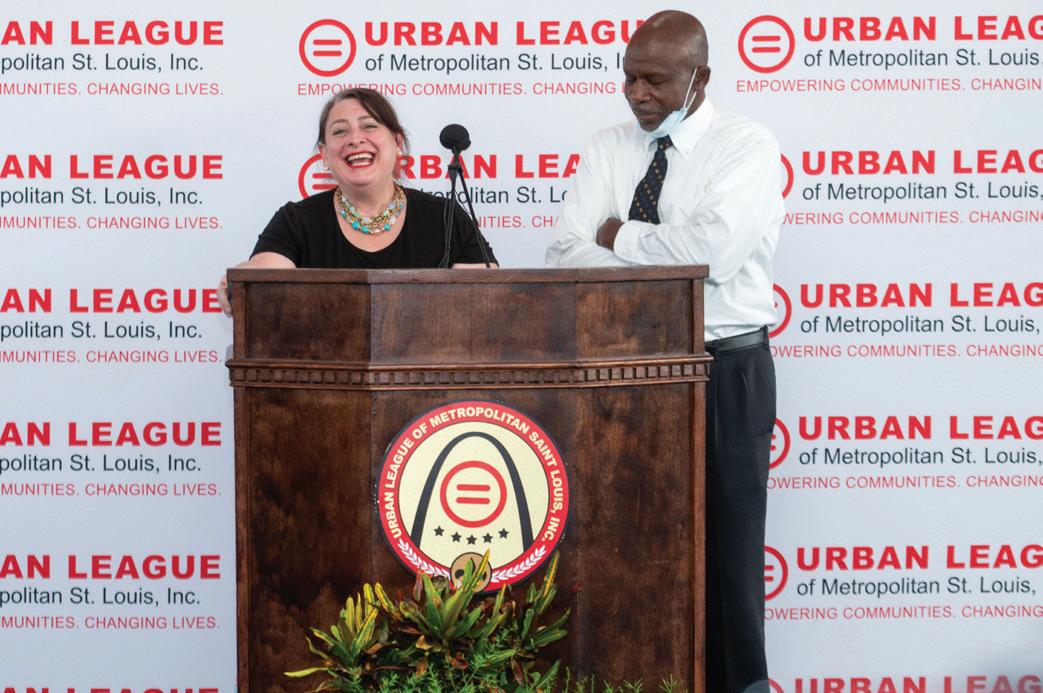
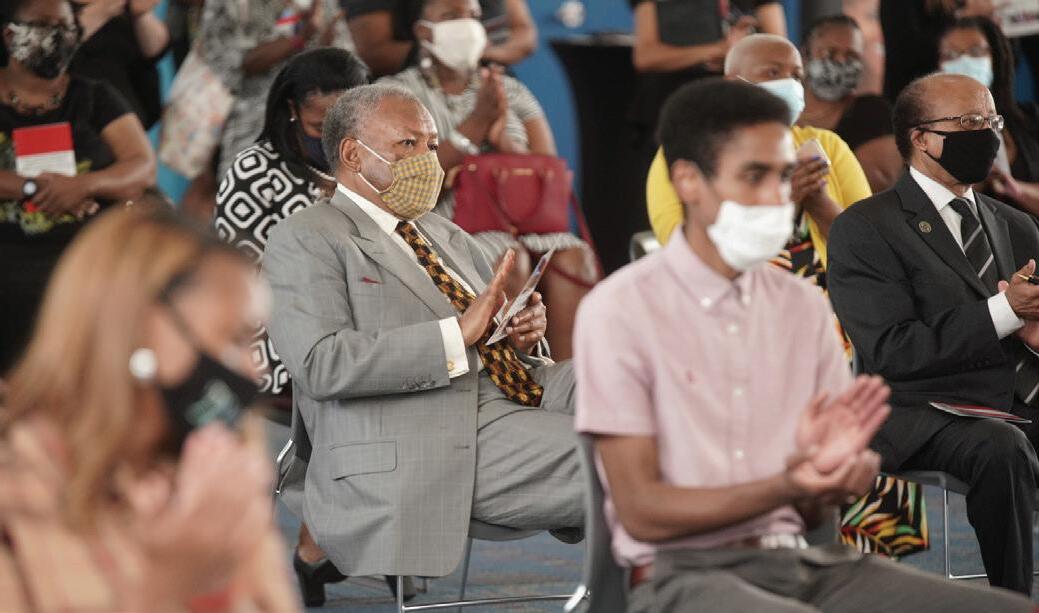
million grant ($7.6 million per year over five years) from the U.S. Department of Health and Human Services, Office of Head Start.
The new grant will allow the agency to serve 931 children in St. Louis City and County at the following locations: Broadway Early Childhood Center at 4040 S. Broadway, St. Louis, MO 63118; Water Tower Head Start/Early Head Start Center, 2125 Bissell, St. Louis, MO 63107 and, Patch Head Start, 7925 Minnesota, St. Louis, MO 63107. Urban League Head Start / Early Head Start programs serve children in eight Urban League locations and five partner locations throughout the metropolitan area.
Grace Hill was established by the Episcopal Diocese (Grace Church and Holy Cross Church) in 1903 to provide a comprehensive and coordinated complement of services and resources to immigrant populations, helping them “settle” into their new community. Today, 117 years later, Grace Hill provides programs in underserved communities that impact educational development including Head Start/Early Head Start and the Community School Partnership; economic development, including the Women’s Business Center, community development and senior service programs. The Urban League provides nearly 50 programs that advocate for and empower African Americans and others in Metropolitan St. Louis focused on economic opportunity, educational excellence, community empowerment, and civil rights and advocacy.
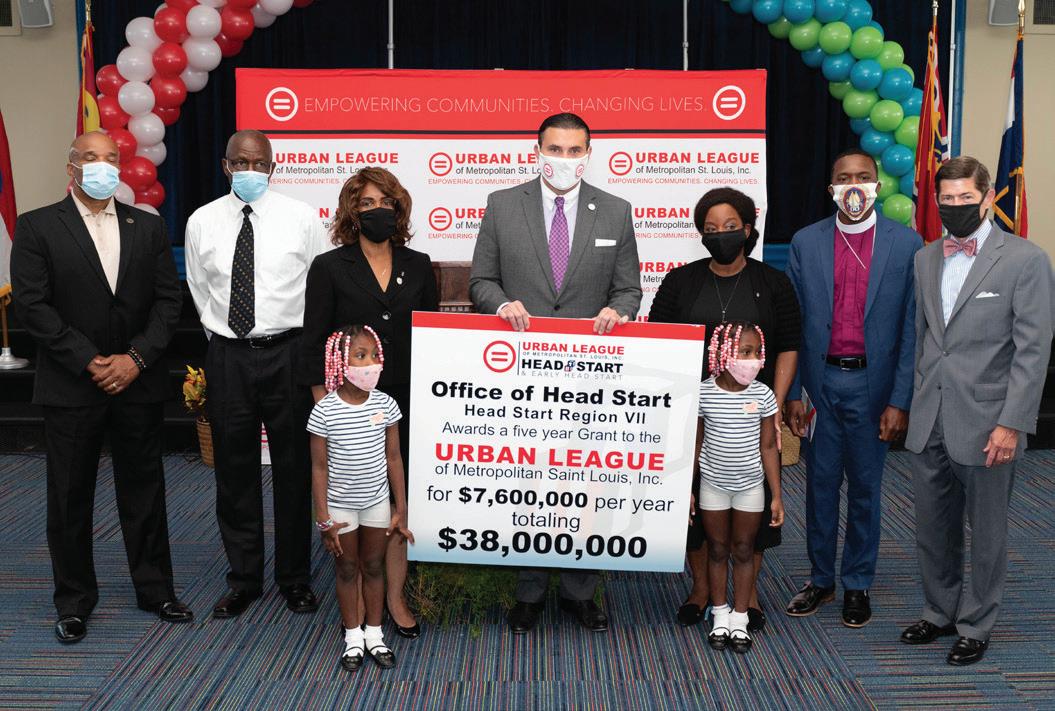
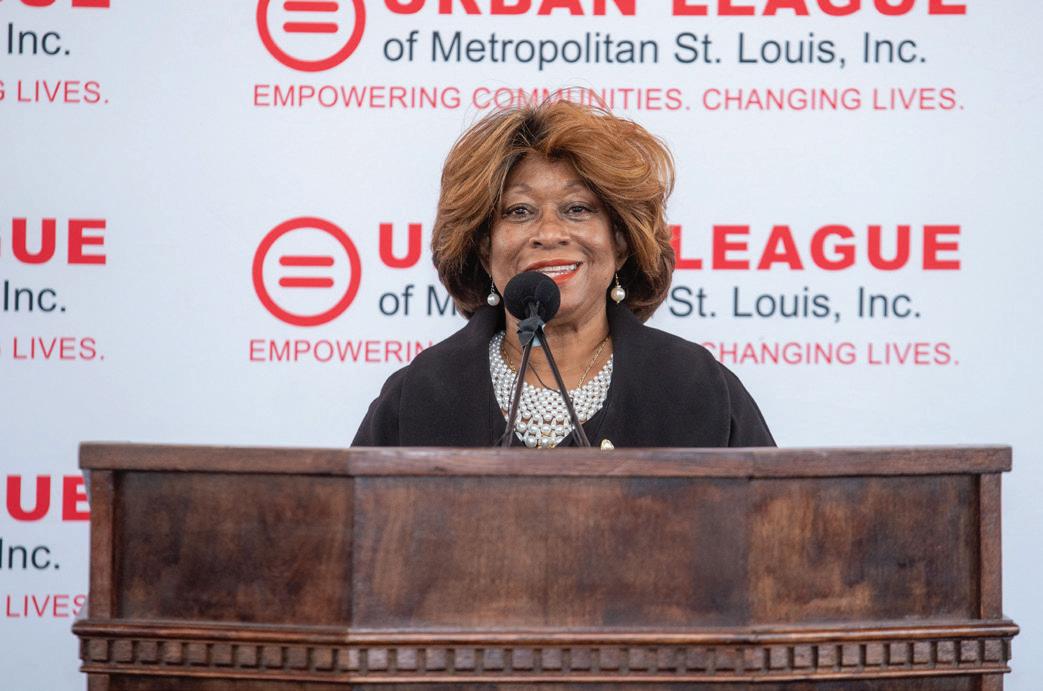
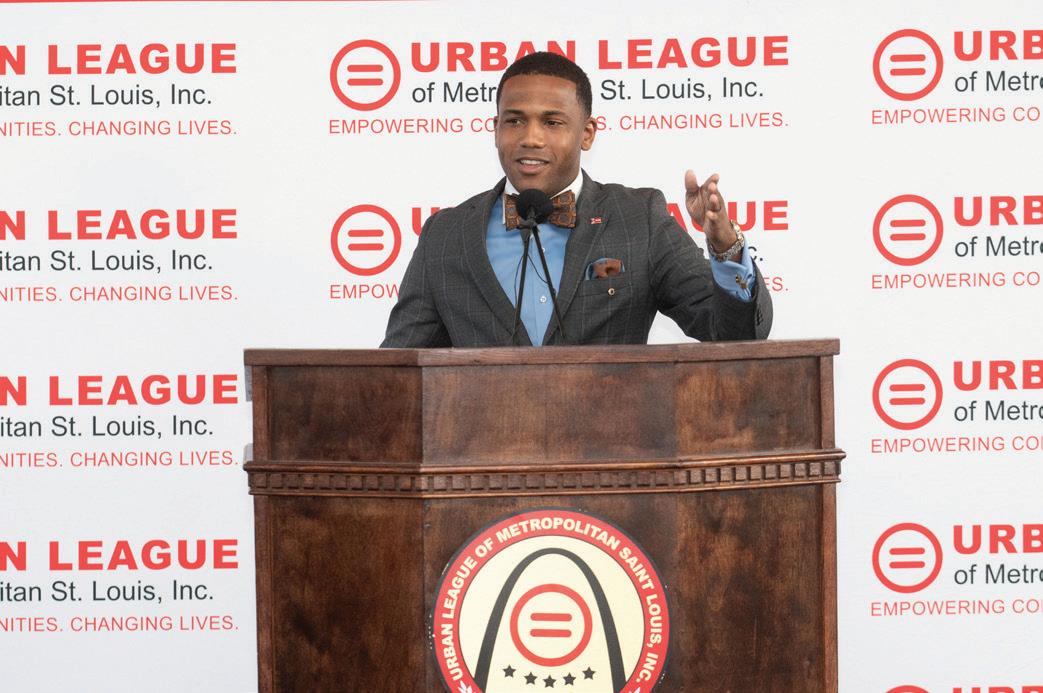
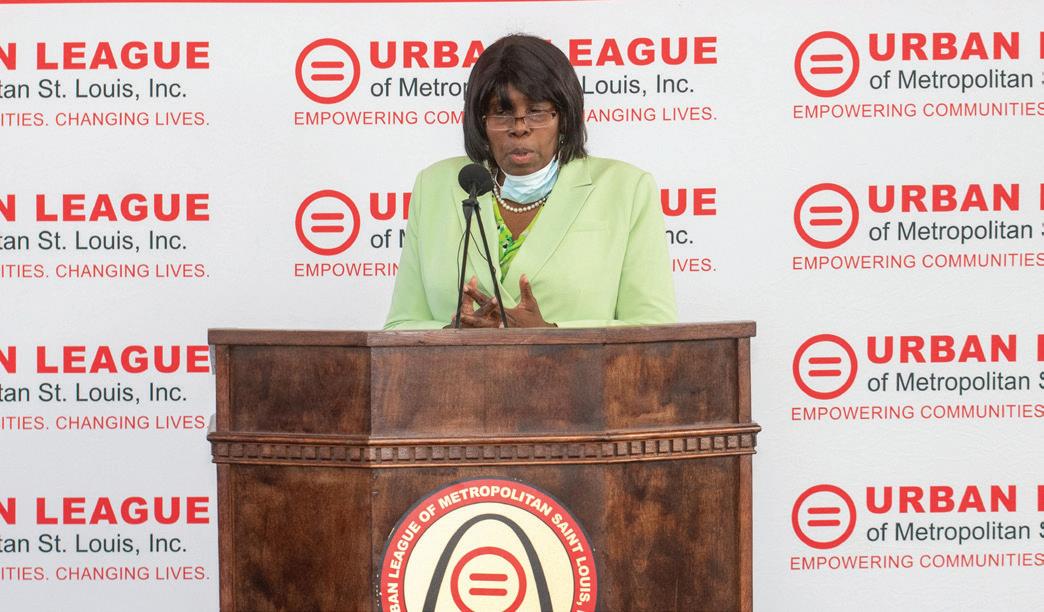

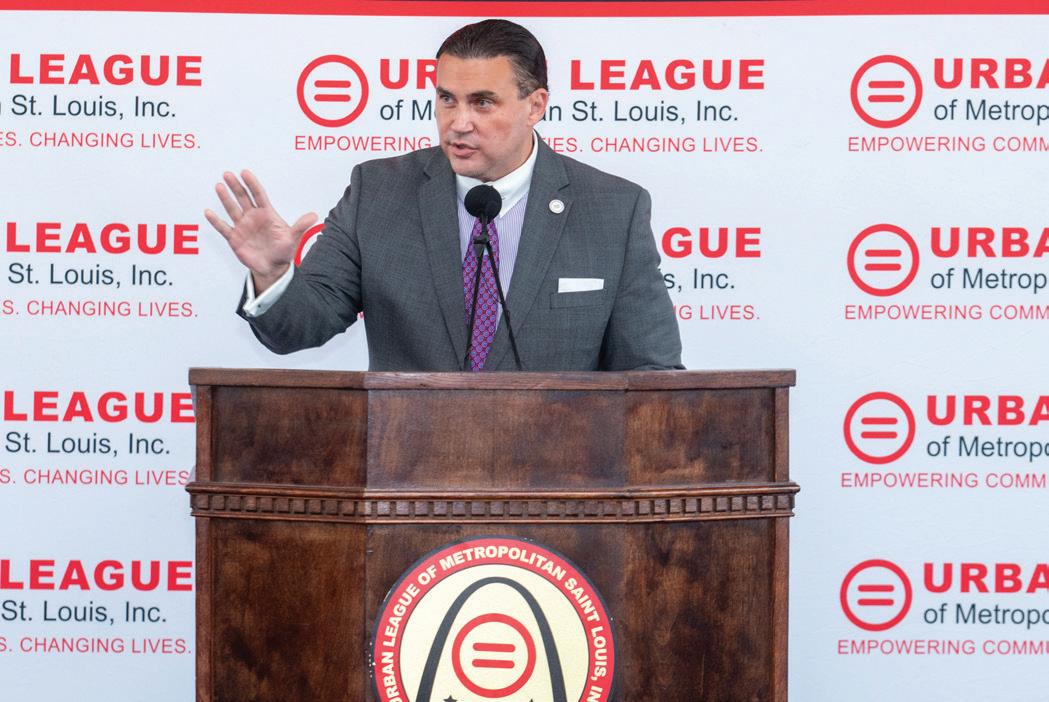
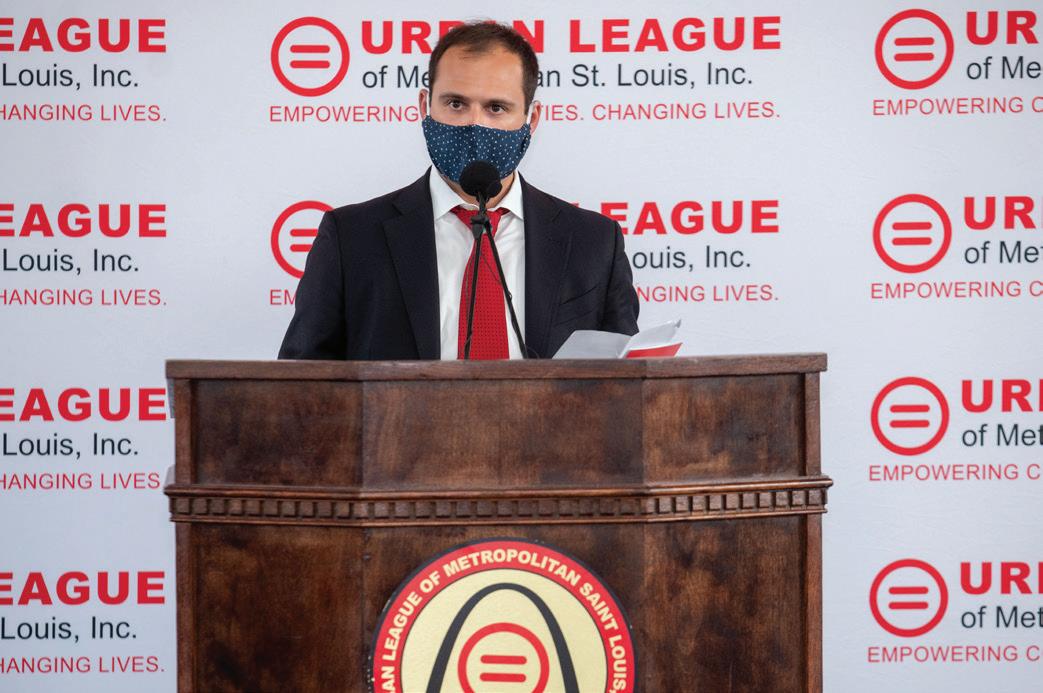
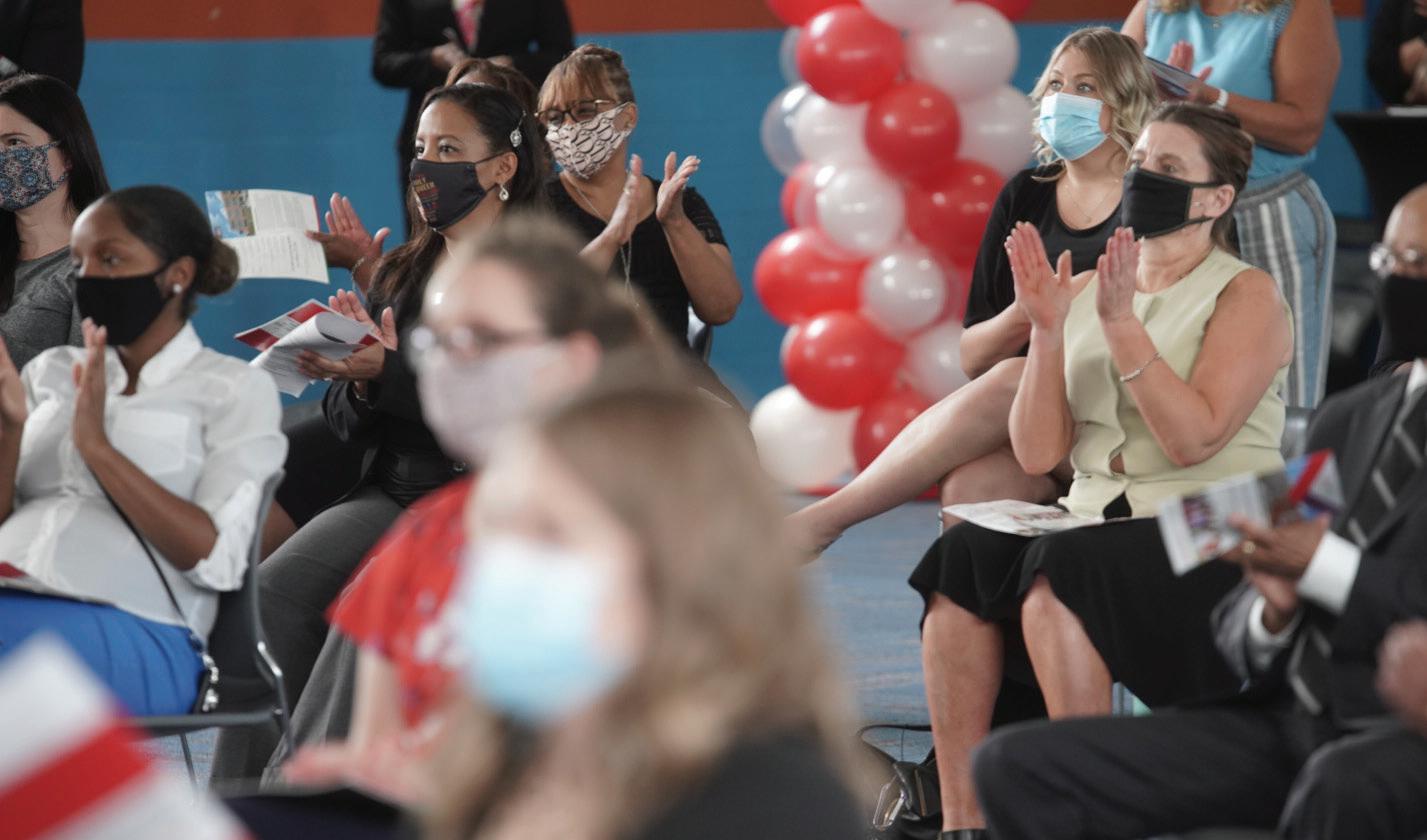

By American Staff
When most people hear the words “stand up” used in connection with Cedric The Entertainer, their brains most likely associate them with his “King of Comedy” status.
But starting this month, fans will see him “Stand Up” to encourage others to advocate for their health during a crucial and vulnerable time.
The veteran comedian, television star and St. Louis native is no stranger to lending his celebrity to advocate for community health.
For years, he worked alongside his mother Rosetta Boyce Kyles– and later in her memory – to create a resource for women’s healthcare in his hometown. And through a new public service announcement, Cedric will serve as the latest face in an initiative of Stand Up To Cancer. The PSAs are designed to educate and encourage cancer patients to explore treatment options available through clinical trials. They are the third in a series of PSAs supporting Stand Up To Cancer’s Health Equity Initiative, which is aimed at increasing diversity in cancer clinical trials.
Cedric’s PSA follows campaigns by actors Sonequa Martin-Green and Jaime Camil, and features a personal call to action from him to learn more about cancer clinical trials. Cedric, who currently stars in the CBS Network primetime sitcom “The
See Cedric, C2
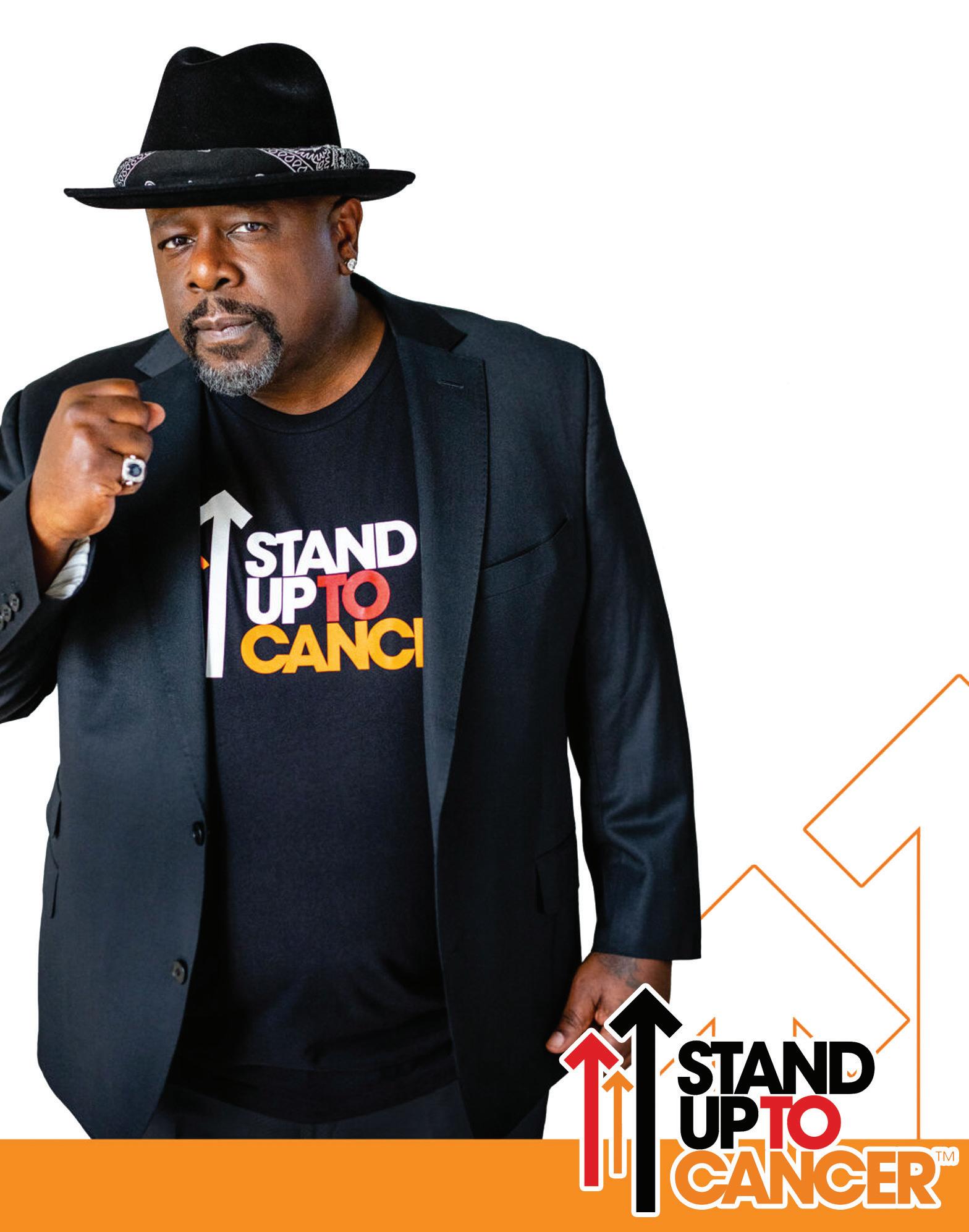
‘We are celebrating a part of history’
‘Country Grammar’ virtual concert a satisfying stroll down STL rap memory lane
By Kenya Vaughn Of The St. Louis American
“It’s been an amazing ride,” STL rap star Nelly said while looking directly into the camera to audiences tuning into the MelodyVR App Saturday night. He was two songs into the latest commemoration of the 20th anniversary of his debut album “Country Grammar.” The concert on the app that delivers live performances to cell phones and mobile devices was just the latest celebratory gesture for the record that changed the game for St. Louis. The anniversary party has been ongoing since the album’s official anniversary on June 27, 2020. The concert came a day after Nelly released a deluxe edition of “Country Grammar” to mark the milestone. Before Nelly and the St. Lunatics, plenty of rappers kept their dreams of breaking into the mainstream to themselves – because it seemed too farfetched. Halfway through the first year of the new millennium, “Country Grammar”
changed the game in St. Louis – and everywhere else.
“My whole drive was to do what hadn’t been done,” Nelly said in between the tracks during the hour-long performance that was backed by a live band.
He told viewers he felt the same energy as when he first stepped up to the mic representing St. Louis for the whole world to hear.
“The Midwest was the last place in hip-hop to get our just due,” Nelly said, calling the region
“the middle child of hip-hop.” “Our sound is basically a cluster of what’s around,” Nelly said. The melting pot of styles still applies to St. Louis’ variety in the game. A generation later it’s illustrated in a laundry list of artists who represent the city – from conscious lyrical rappers to the creators of trap and club bangers.
“Country Grammar” was a sampler pack of what St. Louis had to offer. The concert was a reminder of how the city’s rich musical history can be found within the beats and bars of Nelly’s breakthrough album – which hit like a
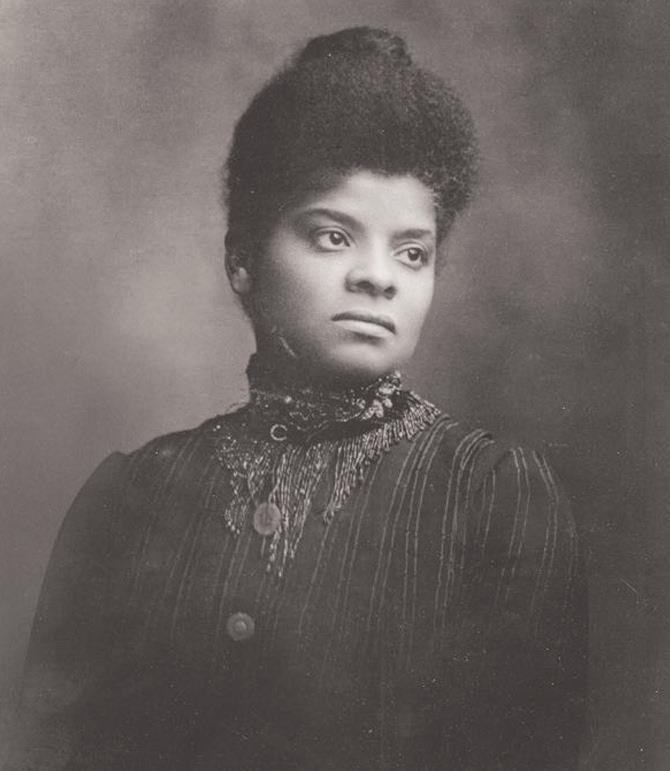
Ida B.
By Kenya Vaughn Of The St. Louis American
“Doing whatever it takes to tell our own story from our own perspective does our community a service,” said Michelle Duster, author, speaker, professor and champion of racial and gender equity. Her words align with the mission of the St. Louis American and so many other outlets, reporters and citizen journalists.
“When black people tell our own stories, we counter the stereotypes and the false information that tends to be the dominant common theme in the mainstream media,” Duster said.
She learned this lesson from her paternal great-grandmother, pioneering investigative journalist, newspaper publisher and anti-lynching crusader Ida B. Wells-Barnett.
She will share her perspective and context from her great-grandmother’s life and legacy during her talk, A Conversation with Michelle Duster: Ida B. Wells and Today’s Street Journalism at 6:30 p.m. on Tuesday, August 4. The presentation is the latest in the Missouri

sledgehammer and became a mic drop moment for St. Louis within the genre, and quickly bled into pop music.
“To be celebration the 20th anniversary of
Rap star and St. Louis native Nelly continued his commemoration activities for the 20th anniversary of his diamond-selling debut album “Country Grammar” with a virtual concert that was streamed on the MelodyVR App on Saturday, July 25.
one of the few diamond-selling albums in all of hip-hop is crazy, because the game has changed so
Historical Society’s series How Did We Get Here? Conversations about Race, Anti-Blackness, and Identity. The series is part of the organization’s African American History Initiative (AAHI).
Nearly 30 years before women had the right to vote and 30 years after African Americans lived in bondage and were declared as property, Ida B. Wells was using skills she developed as a journalist and researcher as a tool to declare the humanity of those so inhumanely terrorized through lynching.
“I don’t think she made a plan for her life to become a Civil Rights activist and anti-lynching crusader or a speaker who traveled internationally,” Duster said. “I don’t think she ever could have planned that. I think what happened is that one thing led to another and it was sparked by her friends. It was a personal thing with her friends when they were lynched that propelled her to speak out in a way that was very bold. It was because it was personal – and she knew for a fact that they were innocent.”
In the late 19th century, speaking out publicly against lynching could easily make one susceptible to becoming the next victim. But Wells put her livelihood and life on the line.
“Today in 2020, she is being lauded and awarded and people are celebrating her in all kinds of ways and appreciating all that she did,” Duster said. “But during her lifetime, she was on the receiving end of a lot of criticism and was ostracized. If you read her writings at that time, she made it clear that she felt frustrated and lonely.”
Earlier this year Wells was given a posthumous Pulitzer Prize for her investigative journalism. When she was writing the stories that ultimately earned her what is considered by many to be journalism’s top prize, she had her printing press destroyed and endured constant threats on her life.
“In her day, there weren’t other people working in tandem with her or backing her up,” Duster said. “When I think about her life, I think, wow, not only was she brave to do what she did, but she was willing to do it by herself. And in being willing to take that road alone, It’s not easy – and she made it clear that it wasn’t easy for her.”
Duster has made a name for herself as an author, working at a relentless pace to ensure proper representation within the African American community and among women. In the last dozen years, she has written, edited, or contributed to eleven books. She co-wrote the popular children’s history book, Tate and His Historic Dream; co-edited Shifts and Michelle Obama’s Impact on African American Women and Girls. She also edited two books that include the writings of great-grandmother.
“People say ‘Oh, your great grandmother was courageous or brave,’” Duster said. “The word that they often use is ‘fearless’,” Duster said. “Based on what I read and what I understand, I don’t think she was fearless. I think that she had fear but she was willing to push it aside and do what she felt like she had to do.”
She sees her great-grandmother’s influences, particularly in the viral footage of George Floyd’s fatal arrest in Minneapolis.
“Imagine if Darnella had not captured video of George Floyd’s death,” Duster said.
“Then the story would have been that he was resisting arrest – much different than what we actually saw. We have those examples of the reality being captured by street journalists or passers-by that is different that the mainstream tends to tell about us.”
But beyond capturing the moment – Which Wells took to the next level by researching and investigating other cases to establish a pattern of lynching –the biggest lesson Duster hopes people who learn about Wells’ life take away is the power of ownership.
Wells was the editor and the co-owner of the “Memphis Free Speech,” so she didn’t have to go through editorial boards and editors and managers in order to get things greenlighted or approved.
“She was the one who made the decisions and that is super important,” Duster said. “And when it comes to being a woman, that was extremely unusual. I think for people to understand the level of power she gave herself – especially at that time – makes her story even more impressive.”
Duster was personally empowered by Wells being bold enough and confident enough in herself to believe that she could do what she did at the time that she did it.
“Even by today’s standards some people might not feel ready or they might not feel qualified. She was like, ‘I can do this’,” Duster said. “I want to help people understand that there is power in ownership. There’s nothing like having control over your own story.”
A Conversation with Michelle Duster: Ida B. Wells and Today’s Street Journalism will take place at 6:30 p.m. on Tuesday, August 4. For more information visit www.mohistory.org.
much,” Nelly said. “We gonna run this [expletive] from top to bottom.”
And that’s exactly what he did – in the very order that each track appeared on the album. Some were excerpts, but many got the full song treatment with updated arrangements that augmented the already strong collection.
He kicked things off with the first track on the album, “St. Louie,” which introduced the city to the hip-hop community at large. He then jumped into “Greed Hate Envy.” Third on the setlist was the song that made Nelly a superstar.
“We goin’ down, down baby, yo’ street in a Range Rover,” Nelly sang from the title track of “Country Grammar.” The musical backdrop included a funked out, bass driven rearrangement. If that version were released in 2020, it would have caught on with the same fever-pitch as the original did 20 years before.
Nelly performed “Steal The Show,” which is essentially the St. Lunatics crew giving themselves props in advance for what they figured would be their impact on the rap game. At the time of the album’s release, the song was a bold and unlikely prediction. When Nelly sang it 20 years later, the song felt more like a prophecy.
“Lunatic, five strong, king kongs are writin’ songs,” the song says. “Cats be getting’ gone thinkin’ they got it goin’ on. Call the cops, I see a robbery in progress. Lunatics about to steal the show.
(Where you from?) From the S-T-L, M-O, 3-1-4.”
Fellow St. Lunatic City Spud then joined Nelly for a performance of “Ride Wit Me.” It was back to a solo show for “E.I.” and the duration of

the performance.
Of the 16 tracks, “Country Grammar,” “Ride Me” and “Batter Up” were among the highlights. The arrangement of “Batter Up” leaned more heavily on guitar than “Country Grammar” did on the bass.
As he sang a lyric borrowed from the theme song of “The Jeffersons,” Nelly felt as much like a rock star as he did a rap star. It served as a reminder that along with fellow Midwest rap representatives Bone Thugs and Harmony (straight out of Cleveland), Nelly was a pioneer of the melodic flow.
“You look at music as it is right now and you know your influence,” Nelly said. “That was something I feel like we brought to the game.”
He took fans down memory lane talking about the making of the videos for “Country Grammar.”
“Back then, the budgets were astronomical,” Nelly said.
clinical trials is extremely low in the Black community, and I am proud to work with Stand Up To Cancer and take action to address this important issue.”
The PSA will run in print, digital and out-of-home outlets.
Neighborhood,” has been supporting Stand Up To Cancer since 2018. He was inspired by his mother’s 2009 uterine cancer diagnosis to become an advocate for the cause.
“My mother’s cancer journey taught me about the value of advocating for yourself and knowing your options,” Cedric said. “Participation in cancer
“Watching my mother go through her cancer diagnosis taught me the importance of clinical trials,” the PSA reads. “Knowledge is power. Understanding what clinical trial options are available to you and your family can make all the difference”
Stand Up To Cancer (SU2C)

He shouted out Marc Klasfeld, who directed “Country Grammar,” “Batter Up” and “Ride Wit Me” from the album – as well as the St. Lunatics single “Midwest Swing.”
Most of his shout outs were reserved for the fans who have been riding with Nelly from the get for two decades – name dropping regions within the city and county that had his back on the home front before became a global sensation.
St. Louis, East St. Louis, North City, North County, U. City, the Westside and the Southside all received a nod.
“Tonight we are celebrating a part of history – and I want to show love to all of those who helped me make history,” Nelly said. ‘We were all a part of something so special that I don’t think we will ever forget. I know I won’t forget. It was both a pleasure and an honor to have y’all celebrate with me.”
raises funds to accelerate the pace of research to get new therapies to patients quickly and save lives now. SU2C, a division of the Entertainment Industry Foundation, a 501(c) (3) charitable organization. It was established in 2008 by media and entertainment leaders who utilize these communities’ resources to engage the public in supporting a new, collaborative model of cancer research, to increase awareness about cancer prevention, and to highlight progress being made in the fight against the disease. As of January 2020, more than 1,600 scientists representing more than 180 institutions are involved in SU2C-funded research projects. SU2C’s Health Equity Initiative, announced in January 2020, aims to increase diversity in cancer clinical trials to ensure patients of all racial and ethnic backgrounds benefit equally from the potential of cancer treatments, and that research addresses differences in genetics, metabolism and physiology. Currently, data from the FDA shows only 4 percent of total cancer clinical trial participants are Black, and 5 percent are Hispanic, even though people of color have the highest mortality rates and shortest overall survival rates for most cancers. Stand Up To Cancer has implemented new procurement requirements for all future research grant proposals to determine whether the research area of focus impacts a specific minority population. These procurement requirements will necessitate that all proposals provide plans for patient recruitment and retention of historically underrepresented populations.
“We’re honored Cedric the Entertainer has joined us to raise awareness about the importance and benefits of cancer clinical trials,” said Stand Up To Cancer CEO Sung Poblete, PhD, RN. “The incredible altruism of the entertainment community has helped us advance our goal of delivering more cuttingedge research and resources for cancer patients in diverse communities, who need our support now more than ever.” Visit StandUpToCancer.org/ ClinicalTrials to learn more about cancer clinical trials.
By Kennard Classical Junior Academy parents
For The St. Louis American
Recent events across the United States suggest that, although many Americans are becoming more aware of the inequities that plague our nation, there is still much that needs to be done to reckon with the legacy of systemic racism. As parents affiliated with Kennard Classical Junior Academy (KCJA), we recognize there is an immediate opportunity in our own community to right a longstanding wrong.
To that end, we are calling on Superintendent Kelvin Adams and the Board of Education of the City of St. Louis to change the school’s namesake from Samuel Kennard to an individual who better represents the values we hope to instill in our children and promote in our society.
Kennard (1842-1916) was a Confederate lieutenant who supported the establishment and preservation of Confederate organizations throughout his life. He was also the first president of the Veiled Prophet Organization, an elite and secretive society that excluded Black members until the late 1970s. Kennard’s actions are at odds with the values we aspire to pass along to our children. Changing the name is a chance to align those values with a more appropriate role model; it is also an opportunity to rename KCJA to celebrate Black history and leadership.

This call for a name change is not a new demand. After learning of Kennard’s past, parents raised concerns regarding the name and its origins as early as 2014. Led by the PTO’s Equity and Inclusion Committee, the school community elevated those concerns in 2018, carrying out extensive education, dialogue, and selfreflection on the issue guided by best-practice recommendations. The PTO hosted presentations by national experts, held writing and art contests, and engaged the school community in discussions surrounding the




possible change. In 2019, a school-wide survey indicated that 70% of respondents favored changing the name of the school; these results, including information on possible options for the new namesake, were submitted to Adams and the Board of Education.
There are multiple strong candidates for the new name-
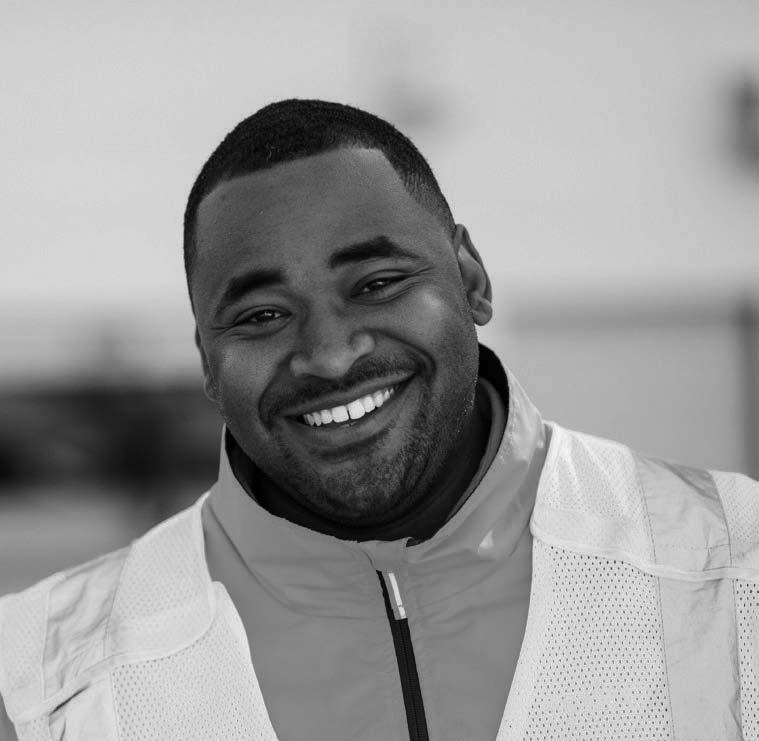
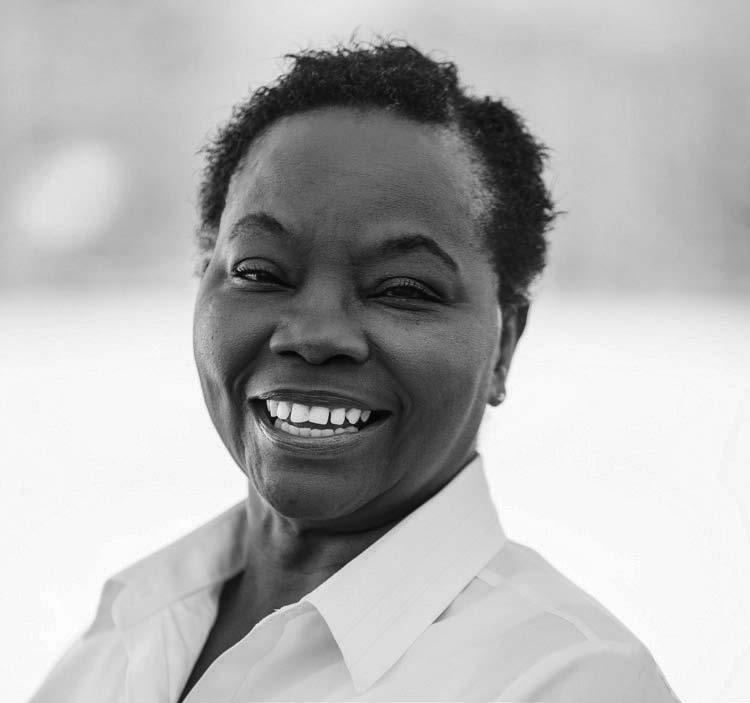


sake. While Black students comprise 80% of the St. Louis Public School (SLPS) student population, a review of school names in the district reveals that only a handful of schools have been named after Black Americans, and even fewer schools have been named after women. We encourage Dr. Adams and the board to take both of these factors into con-
sideration when making their decision.
We recognize that there are more significant issues at KCJA and throughout SLPS. KCJA, a gifted magnet school, is one of the best resourced schools in SLPS; yet over the last 10 years, the enrollment of Black students at KCJA has fallen dramatically from nearly 40 percent to 25 percent.
District-wide, only 3% of Black students participate in giftededucation programs, compared with one-third of white students. These disparities speak to inequities in district policy, as well as inequities in our society at large.
The policies that perpetuate these systems deserve our attention. Over the past few years, we helped form a district-wide parent organization, Equity Bridge, and have been advocating for changes that we hope will begin to address some of these inequities. But if we are unable to achieve a simple symbolic name change, how can we ever hope to achieve more substantive change?
We invite others to join us in rejecting the legacy of Samuel Kennard, as our city strives to create a more inclusive, equitable future for all children in SLPS. The responsibility for renaming KCJA lies with Adams and the Board of Education. In 2015 parents informed SLPS of Kennard’s history; we made a formal request for a name change in May 2019 and have continued to press the issue through letters to and meetings with Adams and the board since. It’s time for the district to act. We encourage you to reach out to them at slpsinfo@slps. org before the next schoolboard meeting on Tuesday, July 14, and demand that KCJA be renamed to celebrate a person whose life better reflects the values of our community.
Submitted by Katy Arbuthnot, Erin Bihr, Jennifer Boudreau, Maggi Carfield, Jocelyn Hawthorne, Amanda Kracen, Aaron Michels, Ilya Monosov, Jessica Schunke, Tracy Fantini Spies, and Elizabeth Webber.
By Ashley Jones
For The St. Louis American
On July 5, LIVE FREE East
St. Louis hosted a Community
Prayer in memory of 14-yearold Kyeiontae Stidimire who was killed by gunfire near his home at the John DeShields Housing Projects. The prayer action was led by Pastor Larita Rice-Barnes.
“I just want to say that as a clergy person and as a pastor that our hearts have been with John De Shields for quite some time, and we have been walking and working to help reduce violence here in John De Shields,” RiceBarnes said.
Clergy and Community leaders were asked to join. Stidimire’s mother and two daughters were present and directly prayed over.
n “When I lost my daughter, Kyeiontae was one of the first kids that met me and told me he know I believe in God, so I got to know that she lives forever.”
help deter violence and we can advocate for resources,” RiceBarnes said. Pastor Luke Jenkins of Love Fellowship, DeShields Robinson Community Center Site Director Yolanda Moody, and Alexandra Graham with the Griffin Center afterschool program were guest speakers and prayed over the community as well. Pastor Jenkins prayed for God’s presence to sweep through the neighborhood and mend the hearts of families and individuals throughout the community.
Out of the 300 kids that Graham worked with, she said she remembered Stidimire.
– Alexandra Graham
“One of our missions specifically with LIVE FREE is to make our presence known in the community, to stand in solidarity with the residents and to be a presence so that we can
“When I lost my daughter, and I came back to work after about two months, Kyeiontae was one of the first kids that met me and told me he know I believe in God, so I got to know that she lives forever,” Graham said.
A youth group was present wearing shirts that had “Can I Live?” written on them with a symbol of a gun cancelled out
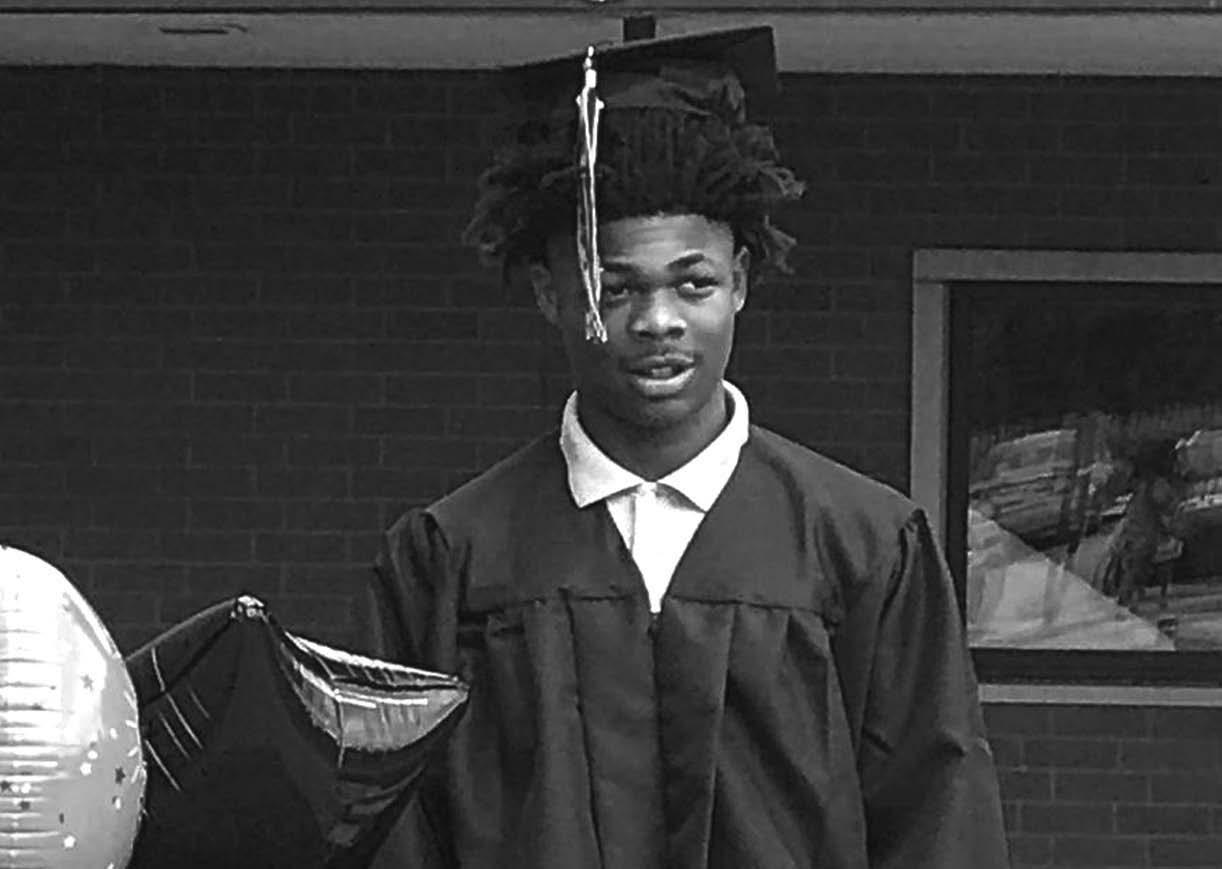
our legal clinics to providing a SLU undergraduate education on the inside of the state prison at Bonne Terre, different faculty and staff have organically stepped up in so many ways to serve people in this situation for years.”
SLU’s prison-specific initiatives and programs collaborate with a number of community and governmental partners including the Center for Women in Transition (CWT).
The Transformative Justice Initiative is an interprofessional, collaborative program that employs community-based participatory research to guide evidenceinformed transformative justice solutions.
SLU’s Prison Program is a Jesuit-inspired initiative that provides access to high-quality liberal arts education for people who are incarcerated and prison staff. More than 4,500 people have participated in the program since 2008.
by a red symbol. The proceedings ended in a mass prayer led by Elder Suzy Douglas.
“We are advocating and standing for hope,” Rice-Barnes said. “We are advocating and standing for justice.”
The Belleville NewsDemocrat reviewed that there were 82 homicides committed in or within a block of one of East St. Louis’ public housing complexes, including DeShields, from 2000 to 2018.

SLU, Collins honored for work with ex-offenders
The Center for Women in Transition, a St. Louis organization dedicated to supporting women ex-offenders postincarceration, have honored Saint Louis University and Christopher Collins, S.J., assistant to the president for mission and identity, for SLU’s work helping people build new lives post-incarceration
through SLU’s Restorative Justice Initiative.
“This award really goes the varied faculty from different colleges and schools within the university who work so intently with those who have been incarcerated,” Collins said. “From doing occupational therapy for people in the city jails in order to strengthen life skills for thriving upon release to finding employment for folks post inception, to treating people medically in the county jail to assistance in court through
Researchers like the late Norm White, Ph.D., have spearheaded efforts to break the school-to-prison pipeline, work continued by students through groups like the Overground Railroad to Literacy.
University faculty, departments, schools and colleges have also partnered with local governments including the City of St. Louis to help people leaving prison re-enter society successfully by allowing them to access SLU expertise and resources. The university and its Chaifetz Arena, together with partners, have also hosted career fairs helping ex-offenders network with future employers.

As other American professional sports leagues are learning a painful lesson, the NBA will re-start its 2020 season this weekend with COVID-19 cases down to zero.
I’m writing this late Tuesday, so that could certainly change by this column’s publication. But the league that was rightfully quick to shut down its season, the league that came up with the first plan to resume play in a “bubble” and the league that immediately stood with its players in demanding an end to racism and equality in America following the George Floyd killing is also at the forefront of diversity among its peers.
Is that really a surprise?
The annual report card on racial and gender hiring issued by the Institute for Diversity and Ethics in Sport (TIDES) at Central Florida found the NBA has more people of color serving as head coaches and general managers than any other league in the U.S. It also found that more women are filling team management roles than the NBA’s counterparts.
ership.”
Lapchick, lead author of the report, applauded the NBA for receiving A-plus grades in racial hiring for its headquarters, players, head coaches, assistant coaches, team management and team professional staff. It earned an A-minus for team general managers and B-plus for team vice presidents.
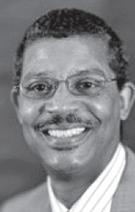
The NBA earned an A-minus overall. The grades include an A-plus for racial hiring and a B for gender hiring. The report, which was updated this month, found that people of color represented 28 percent of general managers – a 24-year high at the start of the season in October 2019 – then reached 40 percent with the July update. Women filled 33 percent of team management positions, the highest mark in 20 years. Importantly, the NBA snapped a two year drop in this category.
“The NBA has been and continues to be the highest scoring men’s league when you’re combining race and gender hiring practices,” said TIDES director Richard Lapchick.
“They have the most proactive diversity-inclusion office in professional sports. And of course, they’re the same team that also leads the WNBA’s efforts in that area. They really take things to heart. … But they want to keep pushing themselves. It’s one of the things I admire about the NBA’s lead-
Unfortunately, women hold just 26.6 percent of vice president or higher positions at the team level. The D-Plus grade helped lower the overall A-plus grade on the report card. Women do hold 40.3 percent of professional positions at the league headquarters and 39 percent of those roles at the team level. this earned the NBA B-plus grades. Nine women are now assistant coaches, which is six more than at the start of the 2019-20 season. Two of these coaches recently took over major college programs: Memphis’ Niele Ivey, a St. Louis native, became head coach at her alma mater Notre Dame in April and Boston’s Kara Lawson became Duke’s head coach on July 11. Additionally, nine NBA teams had a person of color or a woman as majority team owner, with no other men’s league “even close” to that total, according to the study.
Lapchick said the NBA lost some grading stature because a new category which counts team chief executive officers or presidents in its report card. Only 10.9 percent of these offices are held by people of color or women. With more than 75 percent of the NBA’s players being men of color, this earned Fs for the NBA in both racial and gender hiring.
Two giant voices for BLM
San Francisco Giants manager Gabe Kapler took a knee with his players on opening day last week – and he’s taking threats and insults on social media. “Many (fans) were supportive. Many others used bigoted language, racist, sexist or homophobic insults or resorted to graphic threats,” he said. He added in a lengthy social media post that BLM “should be a
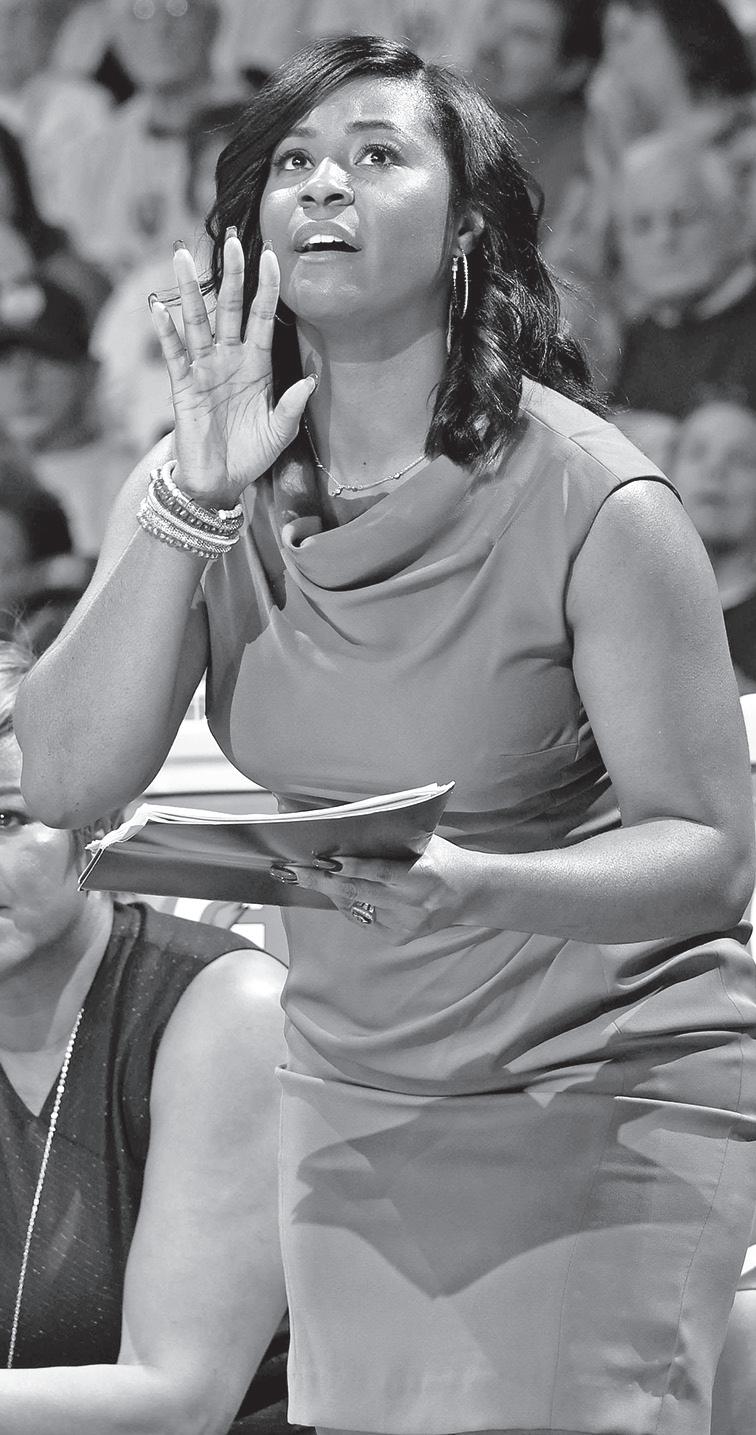
unifying belief.”
“Kneeling is and has always been a gesture of respect and one of mourning. I respect our flag, our principles and our country, but I am also embarrassed, sad and angry that we do not provide for and protect everyone equally,” he wrote.
“So I kneel to encourage this conversation. I kneel to demonstrate my support and to lend my voice. This movement won’t be silenced.”
Speaking of taking some heat, St. Louis Cardinals pitcher Jack Flaherty pitched well and earned a victory in
his team’s opening day victory Friday night over the Pittsburgh Pirates. This came after GM John Mozeliak publicly supported his young ace and acknowledged that some Cardinal fans are not happy with his support of Black Lives Matter and battle against racism.
The Cardinals wore Black Lives Matter t-shirts before the first game of the season and MLB had those words on the pitcher’s mound in every stadium. The next afternoon, Flaherty wore an “I Can’t Breathe” t-shirt during the
With Earl Austin Jr.
national anthem and raised his arms in triumph at its conclusion.
I do have a question: Would the Cardinals have worn those shirts if there were fans in the Busch Stadium seats?
The L.A. Dodgers also knelt before the game with the Giants.
Alas, the lone player who did not kneel with his fellow Giants was pitcher Sam Coonrod.
Saying, “I only kneel before God,” Coonrod added that his Christian beliefs stood in the way of his taking part in the moving moment. Coonrod was born in St. Louis and grew up in Carrolton, Illinois.
The Reid Roundup
After calling out the abundance of Confederate Flags at NASCAR events (NASCAR banned them) and supporting Black Lives Matter, Bubba Wallace told Rolling Stone magazine, “I still don’t see it as being political I just see it as basically right versus wrong.”… Kevin Garnett is part of a group that is hoping to buy the Minnesota Timberwolves franchise from Glen Taylor, who has owned it since 1994. Taylor said he “will entertain opportunities” on the ownership structure of the Timberwolves and Lynx, Minnesota’s WNBA team... Scottie Pippen, who was called selfish by Michael Jordan in “The Last Dance,” said he “wasn’t bothered at all,” by the documentary.
“Why should I be upset about something that happened 30 years ago?” That has been my thought about the program since it was first announced. Who cares???... NFL Hall of Famer and former Chicago Bears head coach Mike Ditka said players who kneel during the national anthem “get the hell out of the country,” I wonder what the late Walter Payton must be thinking... As if he were not loved enough in Kansas City already, Chiefs quarterback Patrick Mahomes is now a member of the Kansas City Royals new ownership group... For the first time in NFL history, more than half of the players selected in the first round of the 2020 draft have black agents representing them.
Of the 32 selections, 17 have black agents, according to a report in the Washington Post More Than A Vote, which was founded by LeBron James and other black athletes and coaches, announced it will donate $100,000 to help pay the outstanding debts of people who have already served time for their felony convictions, but are still unable to vote in Florida. Nearly 800,000 people in the state with former felony convictions are still ineligible to vote because they owe court debts and fees... The annual Bayou Classic between Grambling and Southern will not be played in November. But the two HBCU schools are planning for the game sometime in spring 2021. The Celebration Bowl in Atlanta, which crowns the HBCU football champion, has also been called off... The NFL Players Association announced Tuesday that there have been 21 positive COVID-19 tests in the testing conducted as part of the training camp reporting process… After 17 Miami Marlins players tested positive with COVID-19, Los Angeles Dodgers pitcher David Price, who opted out of the 2020 season, put Commissioner Robert Manfred on front street via Twitter. “Now we REALLY get to see if MLB is going to put players health first. Remember when Manfred said players health was PARAMOUNT?! Part of the reason I’m at home right now is because players health wasn’t being put first. I can see that hasn’t changed.”… As of Tuesday, six New England Patriots players had opted out of the 2020 season, the most of any club. This list includes All-Pro linebacker Dont’a Hightower and defensive back Patrick Chung
Alvin A. Reid was honored as the 2017 “Best Sports Columnist – Weeklies” in the Missouri Press Association’s Better Newspaper Contest and is a New York Times contributor. He is a panelist on the Nine Network program, Donnybrook, a weekly contributor to “The Charlie Tuna Show” on KFNS and appears monthly on “The Dave Glover Show” on 97.1 Talk.” His Twitter handle is @aareid1.
Congratulations to former Vashon High basketball star Jimmy McKinney, who was introduced as the new boys’ basketball coach at Kirkwood High last week. McKinney was an AllStar player at Vashon, who led the Wolverines to state championships in 2000, 2001 and 2002. He was the Gatorade Player of the Year and Mr. Show-Me Basketball in Missouri after his senior year in 2002.He went on to have a very successful college career at the University of Missouri from 2004-07. McKinney played professional basketball in Germany for a decade before returning home to St. Louis, where he entered the coaching ranks at his high school alma mater.
He has been an assistant coach at Vashon on the staff
with head coach Tony Irons, helping the Wolverines to numerous state championships.
IWA standout gets new scholarship offers
Class of 2022 girls’ basketball standout Saniah Tyler of Incarnate Word Academy has seen her recruiting interest increase after a very successful month of July with the Lady Brad Beal Elite 2021 team. The 5’7” point guard earned scholarship offers from Big Ten schools Iowa and Michigan. Tyler is currently the No. 1 player in the Prep Girls Hoops Missouri Class of 2022 rankings.
Local boys basketball teams win championships
A group of talented boys’
basketball teams from the St. Louis metro area have showed well in recent grassroots tournaments. The Gateway Basketball Club 15U team won championships in successive weekends. They won the championship at the Prep Hoops Havoc in the Heartland in Indianapolis, then they followed up with a title at the Gateway AllAmerican Showcase in St. Charles.
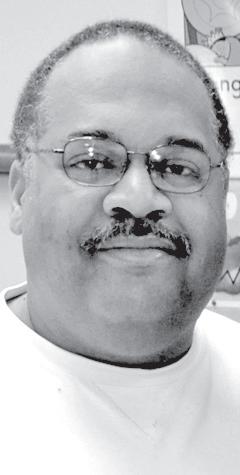
The Gateway 15U team consists of many talented sophomores in the area. The members of the team include Nathan Bobikiewicz (Wentzville Liberty), Justin Duff (DeSmet), Marcus Coleman (Lutheran St. Charles), Cameron Lee (Duchesne),
Earl Austin Jr.
Nick Lewis (Whitfield), Zach Ortwerth (SLUH), Bryce Spiller (Chaminade), Jack Steinbach (Ladue), Mason Williams (Park Hills Central), Kobi Williams (Westminster). The Southwest Illinois Jets Orange won championships at the Gateway AllAmerican Tournament in the 15U and 16U age division. The members of the Jets 16U team are; Dawson Algee (O’Fallon), NJ Benson (Mt. Vernon), Caleb Burton (O’Fallon), Camren Edwards (Alton), Tevin Gowins (Hazelwood Central), Brylan Phillips (Decatur MacArthur), Mekhi Phillips (Lanphier), Lemond Shaw (DuBourg), Jamauri Winfrey
(Peoria Richwoods). The members of the Jets 15U Orange team include: Kemonte Rivers (Alton), Donovan Howard (Hazelwood Central), Kellen Scott (Pickneyville), Kirk Howard (Alton), Jordan Lumpkins (Trinity Catholic), Kendall Lavender (Alton Marquette), Dwayne Chatman Jr. (O’Fallon), Bryant Moore (Confluence Academy).
Keontez Lewis commits to UCLA; Lovett to announce soon
East St. Louis Senior High football standout Keontez Lewis recently gave a verbal commitment to UCLA. The 6’2” 185-pound Lewis is a three-star recruit who is one of the top wide receiver prospects in the state of Illinois.
As a junior, he caught 39 passes for 826 yards and 10 touchdowns as part of a powerful Flyers offensive unit that raced to the Illinois Class 6A state championship last fall. Lewis’ teammate at East St. Louis, All-State wide receiver Dominic Lovett, announced that he plans on announcing his college decision on September 11. Lewis is a four-star prospect who is ranked among the top five prospects in the state of Illinois. He has a whole host of collegiate suitors, which include Missouri, Illinois, Alabama, Georgia, LSU, Oregon and many others. He had 1,536 yards receiving for 17 touchdowns as a junior last season.
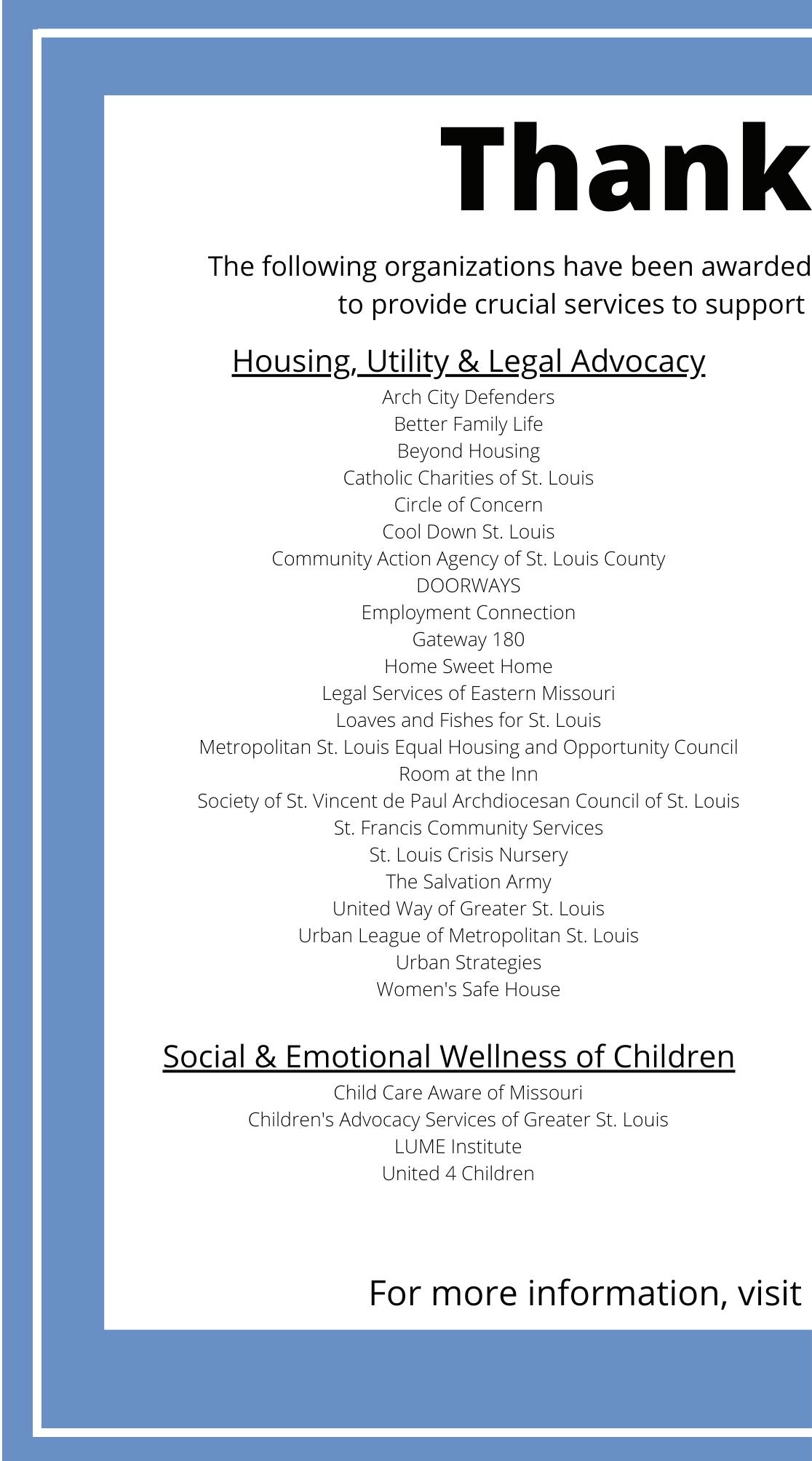


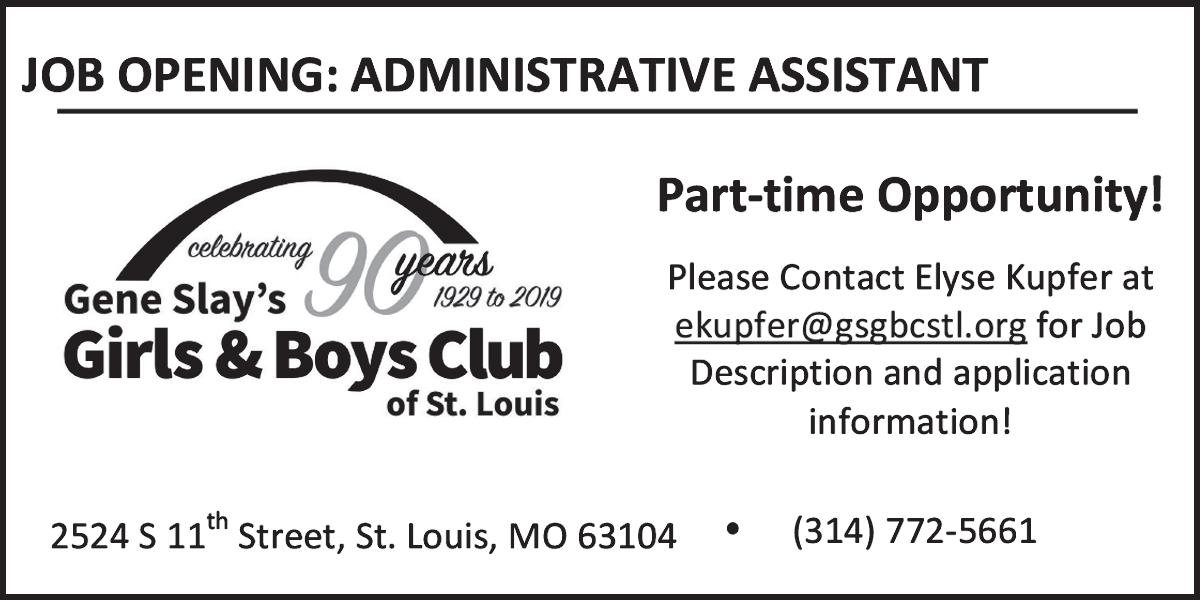
East-West Gateway Council of Governments has an opening for a Staff Accountant position. EWG also has an opening for a Senior Accountant position. Please follow the link to view posts at http://www.ewgateway.org/ careers/. An Equal Opportunity Employer
VOYCE seeks a Development Director responsible for raising funds to support long-term care ombudsman and information and referral services.
https://www.voycestl.org/about/ work-voyce
The City of Richmond Heights is accepting applications for our Parks and Recreation Director. To apply go to https://richmondheights. applicantpro.com/jobs/1459352.html Applications will be accepted from July 16, 2020 through August 10, 2020.

Don C. Musick Construction Co. is seeking proposals for the following project: NAF Cannabis Interior Finish Package: The project includes work for the following trades: Final cleaning, Carpentry labor, millwork, doors / frames / hardware, overhead doors, interior glass, drywall / metal studs, acoustical ceilings, fluid applied flooring, resilient base, painting, toilet accessories, fire extinguishers, lockers, window treatments.
Musick Construction encourages all qualified MBE and WBE firms to consider bidding on this project.
Although M/WBE participation is not a requirement, M/WBE inclusion will be evaluated during the subcontractor selection process.
Bids for this project are due on August 7 at 11:00 a.m. For any questions please contact Robert Brooke, robertb@musickconstruction.com.
All bids should be submitted to Musick via e-mail (estimating@musickconstruction. com) or fax (314-781-4830).
POSITION 18- 20 hours a week Experience required Contact: 314.383.0114


an extensive background and criminal record check. To apply, visit the following website and complete an online application. https://www.governmentjobs. com/careers/stlouis EOE. Please contact the Human Resources Department at 615-2901 (voice) or RelayMo 711 or 800-735-2966 if you need any accommodations in the application process, or if you would like this posting in an alternative form.

The City of St. Louis requests proposals from qualified consultants for the completion of an Environmental Review Policies and Procedures Manual. The manual is needed for daily activities and procedures that are funded by the Department of Housing and Urban Development (HUD), and administered by the Community Development Administration (CDA). The manual should cover day-to-day, activities, processes and address all HUD compliance issues. The selected consultant must be conversant with and knowledgeable of federal regulations governing the environmental review process for HUD-funded activities.
The RFP in its entirety can be found on the Community Development Administration (CDA) website: https://www.stlouis-mo.gov/cda/. Proposals must be submitted no later than 4:00 p.m. on August 28, 2020 to Bill Rataj, Community Development Administration, 1520 Market St – Suite 2000, St. Louis, MO 63103. Questions concerning the RFP may be directed to RatajB@stlouis-mo.gov.
CDA does not discriminate on the basis of race, color, national origin, religion, sex, disability, familial status or sexual orientation in the administration of the program.
CDA is an Equal Opportunity Agency Minority Participation is Encouraged
The City of St. Louis requests proposals from qualified consultants for the completion of an Asset Management Policies and Procedures Manual. The manual is needed for daily activities and procedures that are funded by the Department of Housing and Urban Development (HUD), and administered by the Community Development Administration (CDA). The manual should cover day-to-day, activities, processes and address all HUD compliance issues. The selected consultant must be conversant with and knowledgeable of federal regulations related to Asset Management for projects funded with CDBG, HOME and/or NSP funds.
The RFP in its entirety can be found on the Community Development Administration (CDA) website: https://www.stlouis-mo.gov/cda/. Proposals must be submitted no later than 4:00 p.m. on August 28, 2020 to Bill Rataj, Community Development Administration, 1520 Market St – Suite 2000, St. Louis, MO 63103. Questions concerning the RFP may be directed to RatajB@stlouis-mo.gov.
CDA does not discriminate on the basis of race, color, national origin, religion, sex, disability, familial status or sexual orientation in the administration of the program.
CDA is an Equal Opportunity Agency Minority Participation is Encouraged
The City of St. Louis requests proposals from qualified consultants for the provision of a cloud-based program that will aid the Housing Production Program with regulatory compliance and the tracking of affordable housing production. The program is needed for daily activities and procedures that are funded by the Department of Housing and Urban Development (HUD), and administered by the Community Development Administration (CDA). The selected consultant must be conversant with and knowledgeable of federal regulations governing housing production activities including CDBG, HOME, NSP and others.
The RFP in its entirety can be found on the Community Development Administration (CDA) website: https://www.stlouis-mo.gov/cda/. Proposals must be submitted no later than 4:00 p.m. on August 14, 2020 to Bill Rataj, Community Development Administration, 1520 Market St – Suite 2000, St. Louis, MO 63103. Questions concerning the RFP may be directed to RatajB@stlouis-mo.gov.
CDA does not discriminate on the basis of race, color, national origin, religion, sex, disability, familial status or sexual orientation in the administration of the program.
CDA is an Equal Opportunity Agency
Minority Participation is Encouraged
City of St. Louis
CDA Administration Division and Operating Agency Fiscal Procedures Manual
The City of St. Louis requests proposals from qualified consultants for the completion of a CDA Administration Division and Operating Agency Fiscal Procedures Manual. The manuals are needed for daily activities and procedures that are funded by the Department of Housing and Urban Development (HUD), and administered by the Community Development Administration (CDA). The manual should cover day-to-day, activities, processes and address all HUD compliance issues for CDA’s Administration Division as well as updating the current Fiscal Procedures Manual. The selected consultant must be conversant with and knowledgeable of Community Development Block Grant and other applicable federal regulations.
The RFP in its entirety can be found on the Community Development Administration (CDA) website: https://www.stlouis-mo.gov/cda/. Proposals must be submitted no later than 4:00 p.m. on August 28, 2020 to Bill Rataj, Community Development Administration, 1520 Market St – Suite 2000, St. Louis, MO 63103. Questions concerning the RFP may be directed to RatajB@stlouis-mo.gov.
CDA does not discriminate on the basis of race, color, national origin, religion, sex, disability, familial status or sexual orientation in the administration of the program.
CDA is an Equal Opportunity Agency
Minority Participation is Encouraged
Advertised herein is subject to the Federal Fair Housing Act, which makes it illegal to advertise any preference, imitation, or discrimination because of race, color, religion, sex, handicap, familial\status, or national origin, or intention to make any such preference, limitation, or discrimination.“We will not knowingly accept any advertising for real estate which is in violation of the law. All persons are hereby informed that all dwellings advertised are available on an equal opportunity basis.” Call Angelita Houston at 314-289-5430 or email ahouston@stlamerican.com



TUESDAY, AUGUST 4, 2020
NOTICE IS HEREBY GIVEN that a Primary Election will be held at the designated polling place for each precinct in the City of St. Louis, State of Missouri, on Tuesday, August 4, 2020. The polls will be open between the hours of 6:00 A.M. and 7:00 P.M. for the purpose of nominating candidates for Governor, Lieutenant Governor, Secretary of State, State Treasurer, Attorney General, United States Representative District 1, State Senate District 5, State Representative Districts 66, 76-84, 91 and 93, Circuit Attorney, Sheriff, Treasurer, Committeemen in Wards 1-28 and Committeewomen in Wards 1-28.
The last day the Board of Election Commissioners could accept an application to vote an absentee or mail-in ballot by mail in the August 4, 2020 Primary Election was 5:00 P.M. on Wednesday, July 22, 2020. Absentee voting in person will conclude at 5:00 P.M. on Monday, August 3, 2020. The Board of Elections office will be open on Saturday, August 1, 2020, from 9:00 A.M. until 1:00 P.M.
THE OFFICIAL BALLOT WILL BE SUBSTANTIALLY IN THE FOLLOWING FORM:
INSTRUCTIONS TO VOTERS; In today’s election, you have your choice of using either an electronic, touch-screen voting machine or an optical scan voting machine to cast your ballot.
IF YOU USE THE OPTICAL SCAN VOTING MACHINE to cast your ballot, you must completely darken the oval to the left of the name of the candidate of your choice. To vote on a proposition, if you are in favor of the proposition completely darken the oval to the left of the word “YES.” If you are against the proposition, completely darken the oval to the left of the word “NO.” Do not try to punch through the ballot. Use only the marking device provided to you. If you tear, deface or make a mistake and incorrectly mark the ballot, return it to the Election Judges and obtain a new ballot.
IF YOU USE THE ELECTRONIC, TOUCH-SCREEN VOTING MACHINE, follow the directions on the screen to cast your ballot. For each candidate, touch the box on the screen to the left of the name of the candidate of your choice. To vote on a proposition, if you are in favor of the proposition touch the box on the screen to the left of the word “YES.” If you are against the proposition, touch the box on the screen to the left of the word “NO.” If you need assistance in using the machine, please ask the Election Judges to help you.
IF YOU USE THE ELECTRONIC TOUCH SCREEN VOTING MACHINE to cast your ballot, follow the directions on the screen. To vote for the candidate of your choice, touch the box on the screen to the left of the candidate’s name. If you need assistance in using the machine, please ask the Election Judges to help you.
REPUBLICAN PARTY CANDIDATES
FOR GOVERNOR (Vote for One)
Raleigh Ritter
Mike Parson
James W. (Jim) Neely
Saundra McDowell
FOR LIEUTENANT GOVERNOR (Vote for One)
Arnie C. AC Dienoff
Mike Kehoe
Aaron T. Wisdom
Mike Carter
FOR SECRETARY OF STATE (Vote for One)
John R. (Jay) Ashcroft
FOR STATE TREASURER (Vote for One)
Scott Fitzpatrick
FOR ATTORNEY GENERAL (Vote for One)
Eric Schmitt
FOR UNITED STATES REPRESENTATIVE DISTRICT 1 (Vote for One)
Winnie Heartstrong
Anthony Rogers
FOR STATE SENATOR DISTRICT 5 (Vote for One)
Michael Hebron
FOR STATE REPRESENTATIVE DISTRICT 78 (Vote for One)
Timothy Gartin
FOR STATE REPRESENTATIVE DISTRICT 82 (Vote for One)
Robert J. Crump
FOR STATE REPRESENTATIVE DISTRICT 93 (Vote for One)
Gabriel Jones
FOR CIRCUIT ATTORNEY (Vote for One)
Daniel Zdrodowski FOR SHERIFF (Vote for One)
John N. Castellano, III
Lester (Corkey) Stewart FOR TREASURER (Vote for One)
Robert Vroman
FOR COMMITTEEMAN WARD 6 (Vote for One)
Michael J. Hebron
Write-In _______________
FOR COMMITTEEWOMAN WARD 7 (Vote for One)
Nana Agyeman-Graham
Write-In _______________
FOR COMMITTEEMAN WARD 8 (Vote for One)
Byron Keelin
Write-In _______________
FOR COMMITTEEMAN WARD 10 (Vote for One)
Reid M. Cranmer
Write-In _______________
FOR COMMITTEEWOMAN WARD 12 (Vote for One)
Mary Theresa McLean
Write-In _______________
FOR COMMITTEEWOMAN WARD 14 (Vote for One)
Julia F. McQueen
Write-In _______________
FOR COMMITEEMAN WARD 16 (Vote for One)
Joe Hodes
Write-In _______________
FOR COMMITEEWOMAN WARD 16 (Vote for One)
Lynn M. Muench
Write-In _______________
FOR COMMITTEEMAN WARD 17 (Vote for One)
Dan Scott
Write-In _______________
FOR COMMITTEEMAN WARD 20 (Vote for One)
Mark Comfort
Write-In _______________
FOR COMMITTEEMAN WARD 22 (Vote for One)
Robert Vroman
Write-In _______________
FOR COMMITTEEMAN WARD 23 (Vote for One)
Robert J. Crump
Write-In _______________
FOR COMMITTEEWOMAN WARD 23 (Vote for One)
Cynthia Mueller Rice Write-In _______________
FOR COMMITTEEWOMAN WARD 28 (Vote for One)
Taunia Allen Mason Write-In _______________
DEMOCRATIC PARTY CANDIDATES FOR GOVERNOR (Vote for One)
Nicole Galloway
Jimmie Matthews
Antoin Johnson Eric Morrison
Robin John Daniel Van Quaethem FOR LIEUTENANT GOVERNOR (Vote for One)
Gregory A. Upchurch
Alissia Canady FOR SECRETARY OF STATE (Vote for One)
Yinka Faleti FOR STATE TREASURER (Vote for One)
Vicki Lorenz Englund
FOR ATORNEY GENERAL (Vote for One)
Rich Finnfran
Elad Gross FOR U.S. REPRESENTATIVE
DISTRICT 1 (Vote for One)
Cori Bush
Lacy Clay
Katherine (Kat) Bruckner
FOR STATE SENATOR
DISTRICT 5 (Vote for One)
William C. (Bill) Haas
Megan Ellyia Green
Jeremiah Church
Michelle Sherod
Steve Roberts
McFarlane E. Duncan
FOR STATE REPRESENTATIVE
DISTRICT 66 (Vote for One)
Marlene Terry
Troy A. Jefferson
Thomas (Tommie) Gary Bradley FOR STATE REPRESENTATIVE
DISTRICT 76 (Vote for One)
Chris Carter
Marlon Anderson FOR STATE REPRESENTATIVE
DISTRICT 77 (Vote for One)
Darryl Gray
Kimberly-Ann Collins
FOR STATE REPRESENTATIVE
DISTRICT 78 (Vote for One)
Rasheen Aldridge, Jr.
FOR STATE REPRESENTATIVE
DISTRICT 79 (Vote for One)
LaKeySha Bosley
FOR STATE REPRESENTATIVE
DISTRICT 80 (Vote for One)
Peter Merideth
FOR STATE REPRESENTATIVE
DISTRICT 81 (Vote for One)
Steve Butz
FOR STATE REPRESENTATIVE
DISTRICT 82 (Vote for One)
Donna M.C. Baringer
FOR STATE REPRESENTATIVE
DISTRICT 83 (Vote for One)
Tyler Merkel
Jo Doll
FOR STATE REPRESENTATIVE
DISTRICT 84 (Vote for One)
Wiley (Chip) Price IV
FOR STATE REPRESENTATIVE
DISTRICT 91 (Vote for One)
Sarah Unsicker
FOR STATE REPRESENTATIVE
DISRICT 93 (Vote for One)
Bridget Walsh Moore
FOR CIRCUIT ATTORNEY (Vote for One)
Kimberly M. Gardner
Mary Pat Carl
FOR SHERIFF (Vote for One)
Vernon Betts
Alfred Montgomery David (DA) Mosley
FOR TREASURER (Vote for One)
Tishaura O. Jones
Jeffrey L. Boyd
FOR COMMITTEEMAN WARD 1 (Vote for One)
Sterling Samuel Miller Write-In _______________
FOR COMMITTEEWOMAN WARD 1 (Vote for One)
Yolanda (Glass) Brown Raquel Gant Write-In _______________
FOR COMMITTEEMAN WARD 2 (Vote for One)
Larry Middlebrook David (DA) Mosley Write-In _______________
FOR COMMITTEEWOMAN WARD 2 (Vote for One)
Joyce M. Hall Erma Jefferson Write-In _______________
FOR COMMITTEEMAN WARD 3 (Vote for One)
Desheon McNarry Anthony Bell Michael Conners Write-In _______________
FOR COMMITTEEWOMAN WARD 3 (Vote for One)
Lucinda Frazier Kathelena (K-D.) Belcher Write-In _______________
FOR COMMITTEEMAN WARD 4 (Vote for One)
Jacoby Combs Jamar Mullins Edward McFowland Write-In _______________
FOR COMMITTEEWOMAN WARD 4 (Vote for One)
Caroline Moore Gwenn Washington Write-In _______________
FOR COMMITTEEMAN WARD 5 (Vote for One) Vernon Betts Rasheen Aldridge, Jr. Write-In _______________
FOR COMMITTEEWOMAN WARD 5 (Vote for One) Penny V. Hubbard Write-In _______________
FOR COMMITTEEMAN WARD 6 (Vote for One)
William Suggs Write-In _______________
FOR COMMITTEEWOMAN WARD 6 (Vote for One) Vanessa Carroll Mary Entrup Write-In _______________
FOR COMMITTEEMAN WARD 7 (Vote for One) Marty Joe Murray, Jr. Write-In _______________
FOR COMMITTEEWOMAN WARD 7 (Vote for One) Danielle Mangogna Amber Benge Write-In _______________
FOR COMMITTEEMAN WARD 8 (Vote for One)
Paul Fehler Write-In _______________
FOR COMMITTEEWOMAN WARD 8 (Vote for One) Joanne (Josie) Grillas Jacqueline A. Gonzales
Write-In _______________
FOR COMMITTEEMAN WARD 9 (Vote for One)
Bryan Walsh
Write-In _______________
FOR COMMITTEEWOMAN WARD 9 (Vote for One)
Sara Johnson
Write-In _______________
FOR COMMITTEEMAN WARD 10 (Vote for One)
Rob Stelzer
Write-In _______________
FOR COMMITEEWOMAN WARD 10 (Vote for One)
Amie Jade Maxwell
Debbie Bianchi Hilderbrand
Write-In _______________
FOR COMMITTEEMAN WARD 11 (Vote for One)
Jacob W. Hummel
Write-In _______________
FOR COMMITEEWOMAN WARD 11 (Vote for One)
Kathy Gamache
Write-In _______________
FOR COMMITTEEMAN WARD 12 (Vote for One)
Gregory F.X. Daly
Write-In _______________
FOR COMMITTEEWOMAN
FOR COMMITTEEWOMAN WARD 17 (Vote for One)
Amy Hilgemann
Write-In _______________
FOR COMMITTEEMAN WARD 18 (Vote for One)
John Watson, Jr.
Write-In _______________
FOR COMMITTEEWOMAN WARD 18 (Vote for One)
Judith R. Arnold
Yolanda (Yogi) Yancie
Pamela M. McLucas
Write-In _______________
FOR COMMITTEEMAN WARD 19 (Vote for One)
Cleo Willis, Sr.
Shawn Baker
Write-In _______________
FOR COMMITTEEWOMAN WARD 19 (Vote for One)
Queen Byrd
Write-In _______________
FOR COMMITTEEMAN WARD 20 (Vote for One)
Mark Davis
Write-In _______________
FOR COMMITTEEWOMAN WARD 20 (Vote for One)
Kirsten Petty
Write-In _______________
FOR COMMITTEEMAN WARD 21 (Vote for One)
Tim Anderson-El
James A. Keys
Write-In _______________
FOR COMMITTEEWOMAN WARD 21 (Vote for One)
Rebecca McCloud
Laura M. Keys
Write-In _______________
FOR COMMITTEEMAN WARD 22 (Vote for One)
Andre Williams
Write-In _______________
FOR COMMITTEEWOMAN WARD 22 (Vote for One)
Norma J. Walker
Tonya Finley-McCaw
Write-In _______________
John
Carolyn
Karla
FOR COMMITTEEMAN WARD 28 (Vote for One)
Michael J. Gras
William (Bill) Haas
Write-In _______________
FOR COMMITTEEWOMAN WARD 28 (Vote for One)
Gail Farwell
LIBERTARIAN PARTY CANDIDATES
FOR GOVERNOR (Vote for One)
Rik Combs
FOR LIEUTENANT GOVERNOR (Vote for One)
Bill Slantz
FOR SECRETARY OF STATE (Vote for One)
Carl Herman Freese
FOR STATE TREASURER (Vote for One)
Nicholas (Nick) Kasoff
FOR ATTORNEY GENERAL (Vote for One)
Kevin C. Babcock
FOR U.S. REPRESENTATIVE
DISTRICT 1 (Vote for One) Alex Furman FOR STATE REPRESENTATIVE
DISTRICT 83 (Vote for One) Andrew Bolin
GREEN PARTY CANDIDATES FOR GOVERNOR (Vote for One)
Jerome Howard Bauer
FOR LIEUTENANT GOVERNOR (Vote for One)
Kelley Dragoo
FOR SECRETARY OF STATE (Vote for One)
Paul Lehmann
FOR STATE TREASURER (Vote for One)
Joseph Civettini
FOR TREASURER (Vote for One) Don De Vivo
FOR COMMITTEEMAN WARD 8 (Vote for One)
Joseph Civettini Write-In _______________
FOR COMMITTEEMAN WARD 17 (Vote for One) Don De Vivo Write-In _______________
CONSTITUTION PARTY CANDIDATES
FOR SECRETARY OF STATE (Vote for One) Paul Venable
Bids for Construct Expansion and Replace SeamStanding Roof at Festus Readiness Center, Project No. T1932-01 will be received byStateFMDC, of MO, UNTIL 1:30 PM, 8/20/2020 via MissouriBUYS. Bidders must be registered to bid. For specific project information and ordering plans, go to: http://oa.mo. gov/facilities
BidstoReplace RooftopHVAC &Refurbish Emergency Generator, MissouriLottery Headquarters, JeffersonCity, MO,ProjectNo. N2001-01, willbe receivedby FMDC, StateofMO, UNTIL1:30PM, August27,2020, via MissouriBUYS. Biddersmustbe registeredtobid. For specific project information and ordering plans, go to: http:// oa.mo.gov/ facilities
The St. Louis Economic Development Partnership requests proposals from qualified and experienced firms to assess and evaluate the current space needs within the Helix Center, a bio-technology business incubator located at 1100 Corporate Square Drive, Creve Coeur, Missouri 63132, to ensure optimal service. A copy of the complete RFP is available at https://stlpartnership.com/rfp-rfq/.
To be considered, proposals must be received no later than 3PM CST on Thursday, August 20, 2020.
You are invited to submit a bid proposal for design/ build HVAC, Plumbing, Electrical, and Fire Protection for the Washington University School of Medicine New Research Building Parking Garage located at 310 S. Newstead Avenue. Remaining bid packages will be issued for bid in December, 2020.
Subbids are due at 1 p.m. on August 20, 2020. These may be submitted through WUSM’s Scout Bid Solicit System. Instruction for bid submission will be issued via addendum. Any questions, please contact Kevin Oakley at KROakley@tarltoncorp.com or 314.633.3351 or Brooke Pruitt at BRPruett@tarltoncorp.com or 314.633.3488.
It is our desire to provide meaningful opportunities for minority-owned (MBE) and women-owned (WBE) businesses to participate in the construction projects we complete for our clients. Firms that do not have MBE/WBE status are strongly encouraged to include MBE/WBE firms in their contracting and purchasing plans.
To view this invitation: https://app.buildingconnected.com/projects/ 5f172a7a532a64004e08b195/info Tarlton is an equal opportunity employer.
OFFICIAL BALLOT STATE OF MISSOURI – SPECIAL ELECTION
CONSTITUTIONAL AMENDMENT 2
Proposed by Initiative Petition
Do you want to amend the Missouri Constitution to:
• adopt Medicaid Expansion for persons 19 to 64 years old with an income level at or below 133% of the federal poverty level, as set forth in the Affordable Care Act;
• prohibit placing greater or additional burdens on eligibility or enrollment standards, methodologies or practices on persons covered under Medicaid Expansion than on any other population eligible for Medicaid; and
• require state agencies to take all actions necessary to maximize federal financial participation in funding medical assistance under Medicaid Expansion?
State government entities are estimated to have one-time costs of approximately $6.4 million and an unknown annual net fiscal impact by 2026 ranging from increased costs of at least $200 million to savings of $1 billion. Local governments expect costs to decrease by an unknown amount.
Yes – For the Amendment No -- Against the Amendment
YOU HAVE NOW COMPLETED VOTING.
We, the Board of Election Commissioners within and for the City of St. Louis, State of Missouri, do hereby certify that the above and foregoing is a true and correct list as certified to us by the Honorable John R. (Jay) Ashcroft, Secretary of State of the State of Missouri, of the candidates entitled to be voted for at the Primary Election to be held August 4, 2020.
IN TESTIMONY WHEREOF, we have hereunto set our hands and affixed our seal at the office of the Board of Election Commissioners in St. Louis, Missouri, this 29th day of June, 2020.
BOARD OF ELECTION
COMMISSIONERS FOR THE CITY OF ST. LOUIS
JERRY M. HUNTER Chairman/Member
GERALDINE M. KRAEMER Member
GENE R. TODD Member
(Seal) Attest: JOSEPH A. BARBAGLIA Secretary/Member
Responses for St. Louis Community College on B0003977 for Virtual Clinical Simulation Solution will be received until 3:00 P.M. (local time) on Thursday, August 7, 2020 at the Dept. of Purchasing, 3221 McKelvey Road; Bridgeton, MO 63044, and immediately thereafter opened and read. Bid documents can be accessed on our website at www.stlcc.edu/purchasing
Public Notice of Single Source Procurement
Notice is hereby given that the Metropolitan St. Louis Sewer District is proposing to procure: FLOW MONITORING EQUIPMENT TO REPLACE OBSOLETE 3G MODEMS. The District is proposing single source procurement for these parts because TRIMBLE INC/ TRIMBLE WATER is the only known available source for these parts. Any inquiries should be sent to gjamison@stlmsd.com. Metropolitan St. Louis Sewer District is an Equal Opportunity Employer.
REQUEST FOR PROPOSAL FY 2021 SENIOR CITIZEN PROGRAMS
Aging Ahead invites bids from qualified vendors to address the needs of the older adult population for: transportation services in St. Louis and St. Charles counties and Adult Day Care services in St. Louis, St. Charles, Jefferson, and Franklin counties.
Awards to be made are governed by Titles III and V of OAA regulations and specifications of the US Dept. of HHS, Missouri Div. of Senior and Disability Services and Aging Ahead
The contract period will be July 1, 2020 to June 30, 2021. Contracts may be extended up to three fiscal years. Specifications and proposal packets may be obtained at Aging Ahead office beginning noon, August 3, 2020 at www.agingahead.org or 14535 Manchester Road, Manchester, Missouri, 63011, 636-207-0847. Closing date for receipt of proposals is September 4, 2020 at 4:00pm. Agency reserves right to accept or reject any or all proposals.
Great Rivers Greenway is requesting qualifications for Prequalification for Civic/ Community Engagement Services.Go to www.greatriversgreenway. org/jobs-bids/ and submit by August 7, 2020.
METROPOLITAN ST. LOUIS SEWER DISTRICT
Notice is hereby given that the Metropolitan St. Louis Sewer District Requests for Quotes, Bids and Proposals are posted online for public download. Please navigate to www.msdprojectclear.org > Doing Business With Us > View Non-Capital Bids (commodities and services) or >Visit Planroom (capital construction bids)
Metropolitan St. Louis Sewer District is an Equal Opportunity Employer.
Great Rivers Greenway is requesting proposals for PreConstruction and Construction Management Services for the Brickline Greenway. Go to www.greatriversgreenway. org/jobs-bids/ and submit by August 27 , 2020.
City of Crestwood, 1 Detjen Drive, Crestwood, MO 63126 is seeking bids for general works and demolition and abatement works bid packages at the Crestwood City Hall. Bids due 8/13/20 by 3:00 p.m. A pre-bid meeting will be held on 8/3/20 at 10:00 a.m. Project manuals, registration and questions through Katie Aholt (katie@ navigatebuildingsolutions.com or 636-359-8538).
McCarthy Building Companies, Inc. requests bids from qualified and certified MBE and WBE subcontractors and suppliers for the following project:
Washington University School of Medicine 4370 Duncan - Research Building and Garage Bid Package 7 Structural and Miscellaneous Steel
For the following scopes of work: Structural
Bids Due August 20, 2020 by 2:00 PM CST
Contact: Mike Bax at mbax@mccarthy.com or 314-919-2215
Prequalification is required and can also be accessed through the McCarthy website above.
McCarthy Building Companies, Inc. is proud to be an equal opportunity and affirmative action employer.
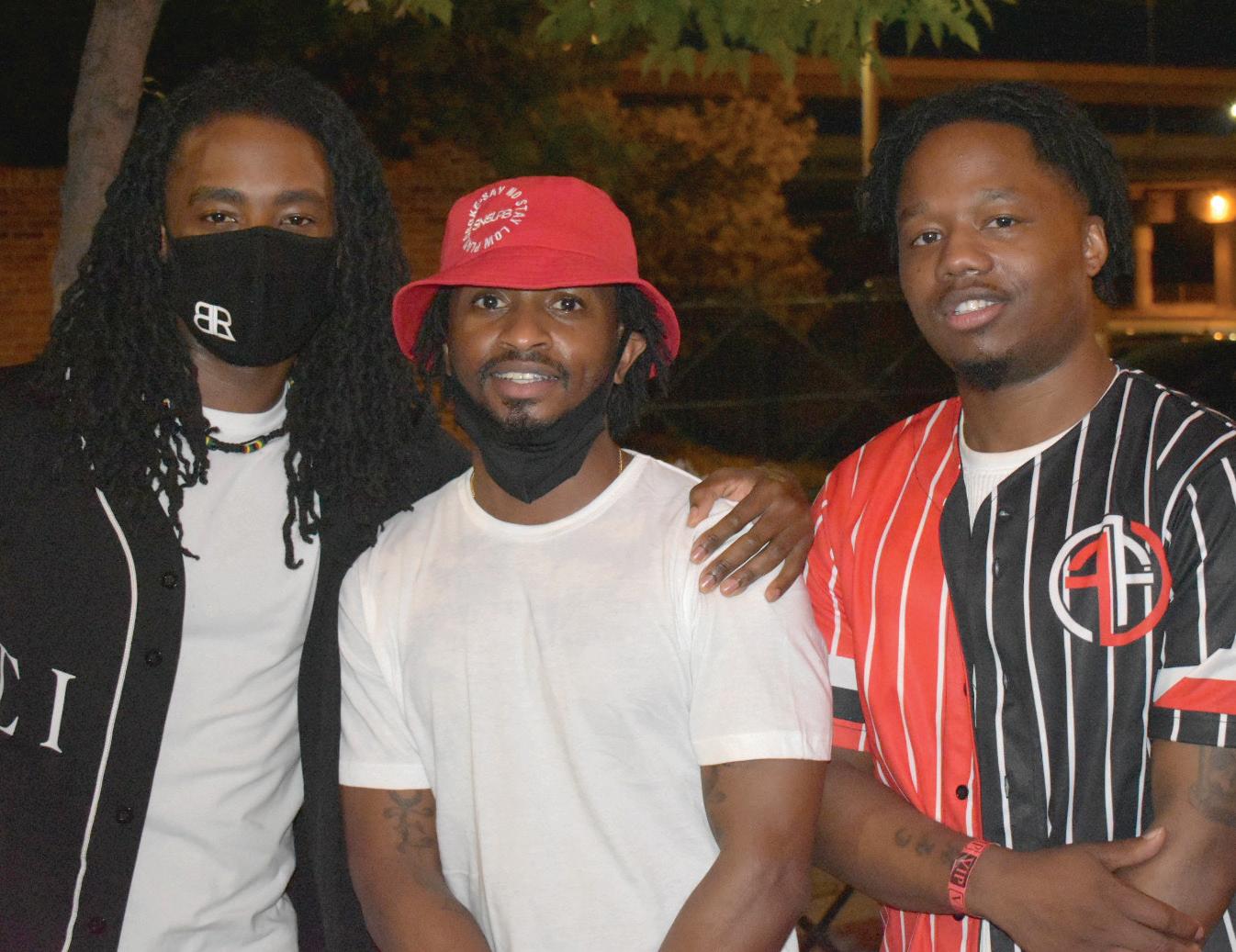


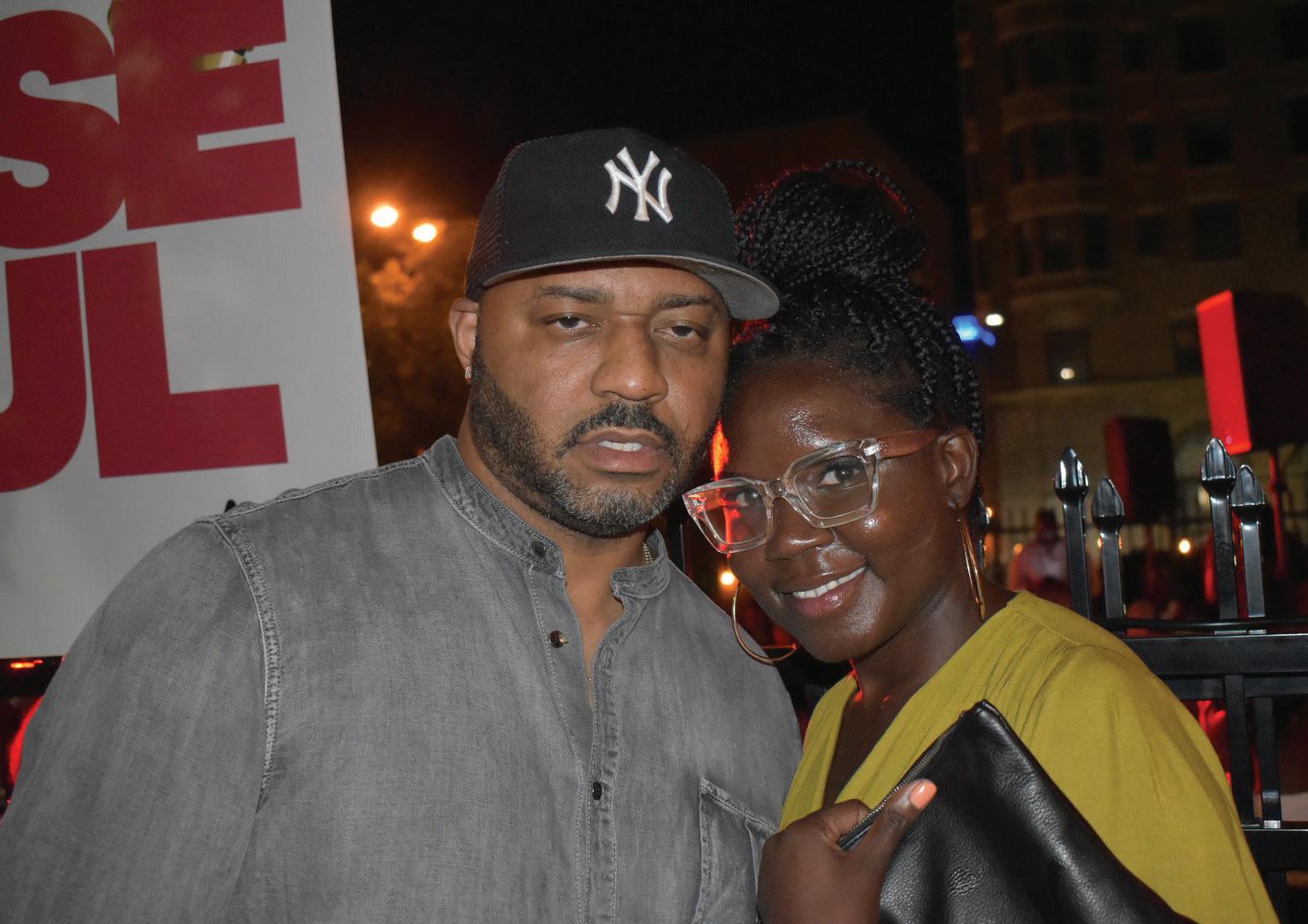
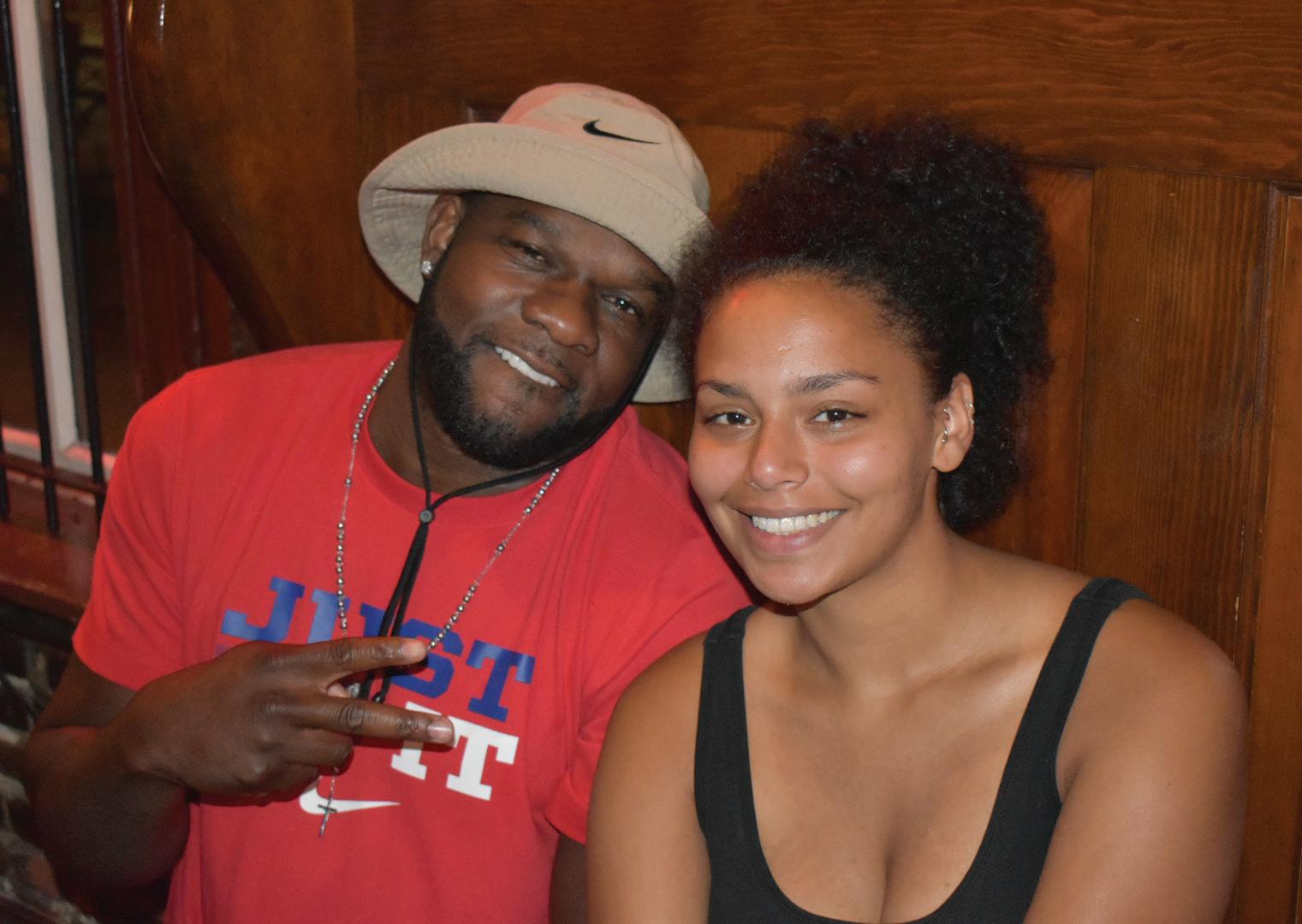



360 degrees of ‘Country Grammar.’ Nelly stretched his 20th anniversary celebration for “Country Grammar” out longer than some of y’all’s cousins and aunties who declare a “birthday month” as opposed to a day like everybody else. While I still have issue with every bit of the extraness served up by my cousin Brenda as she turned 40 for six months, I’m not the least bit mad at MO for rolling out the birthday carpet for his game-changing debut. A day after releasing a deluxe version of the album, he threw all the way down with a virtual concert that I watched on MelodyVR. That 3D feature was everything I could have hoped for. And y’all know what, the show reminded me of what a bop we had in “Country Grammar!” I can’t be the only one who hadn’t listened to it start to finish in a good little minute. And I must say, the live performance reminded me that “Country Grammar” will stand the test of time as a classic. With an assist by City Spud, Nelly put on quite the show! That band was sickeningly good. Who else caught a whole new vibe from their performance of “Country Grammar” that felt like it was touched by the hand of Bootsy Collins? I can’t be the only one.
The battle of all Verzuz Battles. While I’m talking about a virtual bop, please give me a moment to say “I told you so” as far as the epic experience provided by the Snoop Dogg vs. DMX on Verzuz battle last Wednesday. Y’all had a good little time roasting DMX for showing up as a DMXL, but he will be 50 on his birthday. And not everybody has the manic metabolism of Snoop Dogg! Honey those XSL (extra small, long) blue joggers and that smedium shirt were everything I need as far as a dance costume is concerned. Let me just say, that Snoop won the battle, but he was the best for making it a team effort, while proving that whoever said “gangstas don’t dance, we boogie” is a lie and the truth ain’t in them. Listen, he’s the world’s most famous Crip, and those hips didn’t lie as he proceeded to slay us with nonstop swivels, hunches and even a salsa step or two for the girls nonstop for two hours. Timbaland and Swizz Beatz, y’all did that by setting this one up. I know people are gonna argue with me about it, but this was my favorite Verzuz to date. Yes, I enjoyed it more than Jill Scott vs. Erykah Badu. Don’t get me wrong, it was a whole vibe –but you can’t tell me that if you had the choice between the two to watch again that you wouldn’t go with Snoop. He gave us choreography and energy for days! How am I just now finding out that he is a 6’6”, 98-lb. dancing machine? Snoop and DMX are the cool uncles that everybody deserves. I learned Wednesday night that I still know all the words to Snoop’s debut solo album. Yes, I know the name of it too, but those of us who remember the era understand the title is NSFP (not safe for Partyline). That being said, I would like to formally and publicly apologize for nearly all the bad things I’ve said about the lyrics from these mannish Gen Z rappers and singers. Almost is the operative word, but I must admit that as I instinctively sang along, I thought “how did I not get arrested for saying these things out loud?” after the words fell out of my mouth. Big Granny, you were right. All the songs were filthy – and we did need prayers for our purity. However, I had the time of my life all over again reliving the disgraceful West Coast glory days with Snoop the OG on IG.
A songbird at the House of Soul. I made my way back down to the House of Soul Saturday night to hear the angelic voice of Katrina Reese with Darius Savage, violinist Bell Darris and other special guests. Because the police had Washington blocked off, I could have driven to St. Charles and back in the time it took me to find a parking place. Once I did that and made it painfully clear that my form of social distancing includes six feet in every direction and absolutely no physical contact, it was all good. For those who heard somebody yell “don’t touch me” with the same energy as the gentleman in “Malcolm X” that said, “get your hand out my pocket!” I would like to apologize for killing the vibe for that hot second. I forgot what a pretty tone Katrina serves up. Anybody that can do justice to “Soon As I Get Home” has the range. Y’all know I’m funny about people trying to sing Faith Evans, but Katrina’s rendition was solid. Actually the whole set was quite cute. I was pleasantly surprised that she decided to include a cover of Tevin Campbell’s “Can We Talk.” Y’all know that song has a special place in the hearts of Generation X and Generation Y. Back at BBs with Love Jones The Band. Sunday night, I made my first return to BBs since the pandemic popped off and I’m thrilled with their social distancing practices. I felt safe and comfortable as I soaked in the sounds of Love Jones, one of my favorite bands in all of the STL. It was the perfect vibe until somebody came from behind and tapped me on the shoulder. And you already know what happened. But once my anxiety regulated after that close encounter with a personal space invader, I had a blast with some familiar faces and a few new ones as Love Jones The Band gave me a perfectly curated performance of R&B kickback covers. I was also thrilled to run into Reggie Son (aka the artist formerly known as Shorty Da Prince). Dangerous grooves with DJ Reminisce. I still been on Facebook checking for the virtual sets of local and national DJs. And I must give a special shout out to DJ Reminisce and his “Saturday Clean Up” spin session last weekend. I don’t know remember being so bad a multitasking when used to have the jams on in the background as we scrubbed down everything from the windows, to the baseboards and the basement lounge area. Reminisce had a setlist almost identical to my daddy’s. Yet somehow in 2020, I was too caught up in Reminisce’s mix to get any cleaning done. I had to let the groove take over and reschedule my cleaning session for Sunday morning as I listened to my church livestream. Listen, I tried but I ended up dropping my family heirloom avocado green crockpot and shattering it to pieces while trying to hit a two-step to New Edition’s “Candy Girl” as I moved it from the counter to the cabinet. The Shante women have burned chili in that old girl for three generations. I hope you can live with yourself, Reminisce.

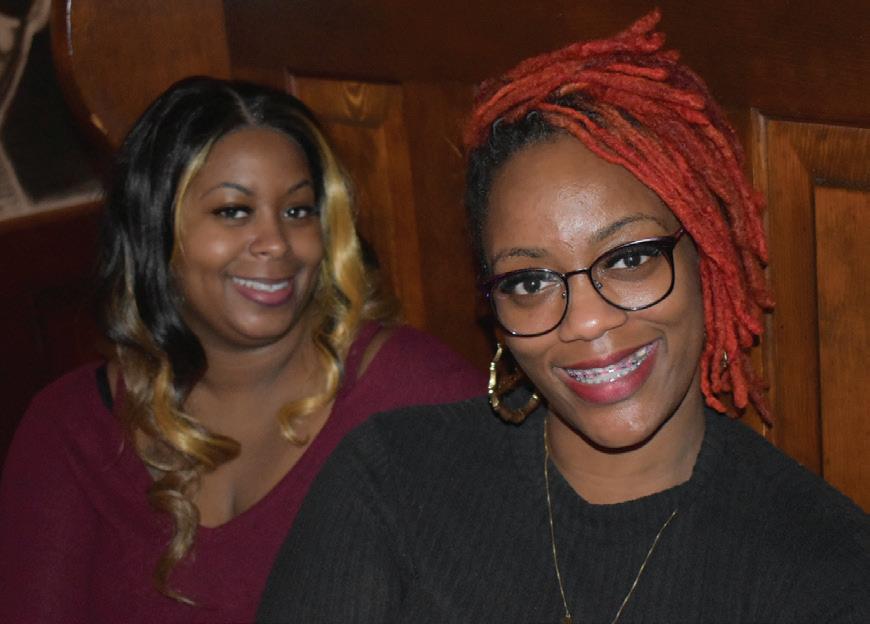
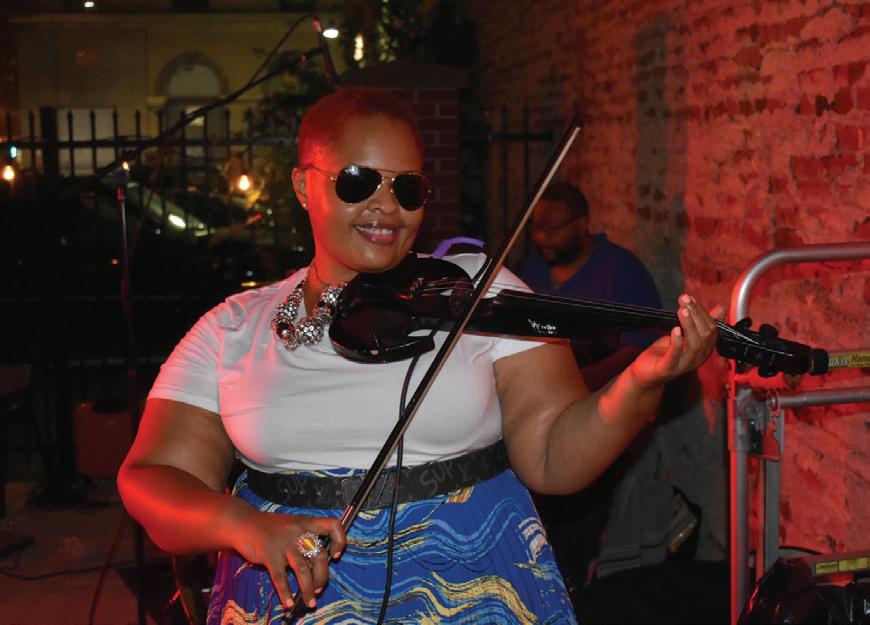




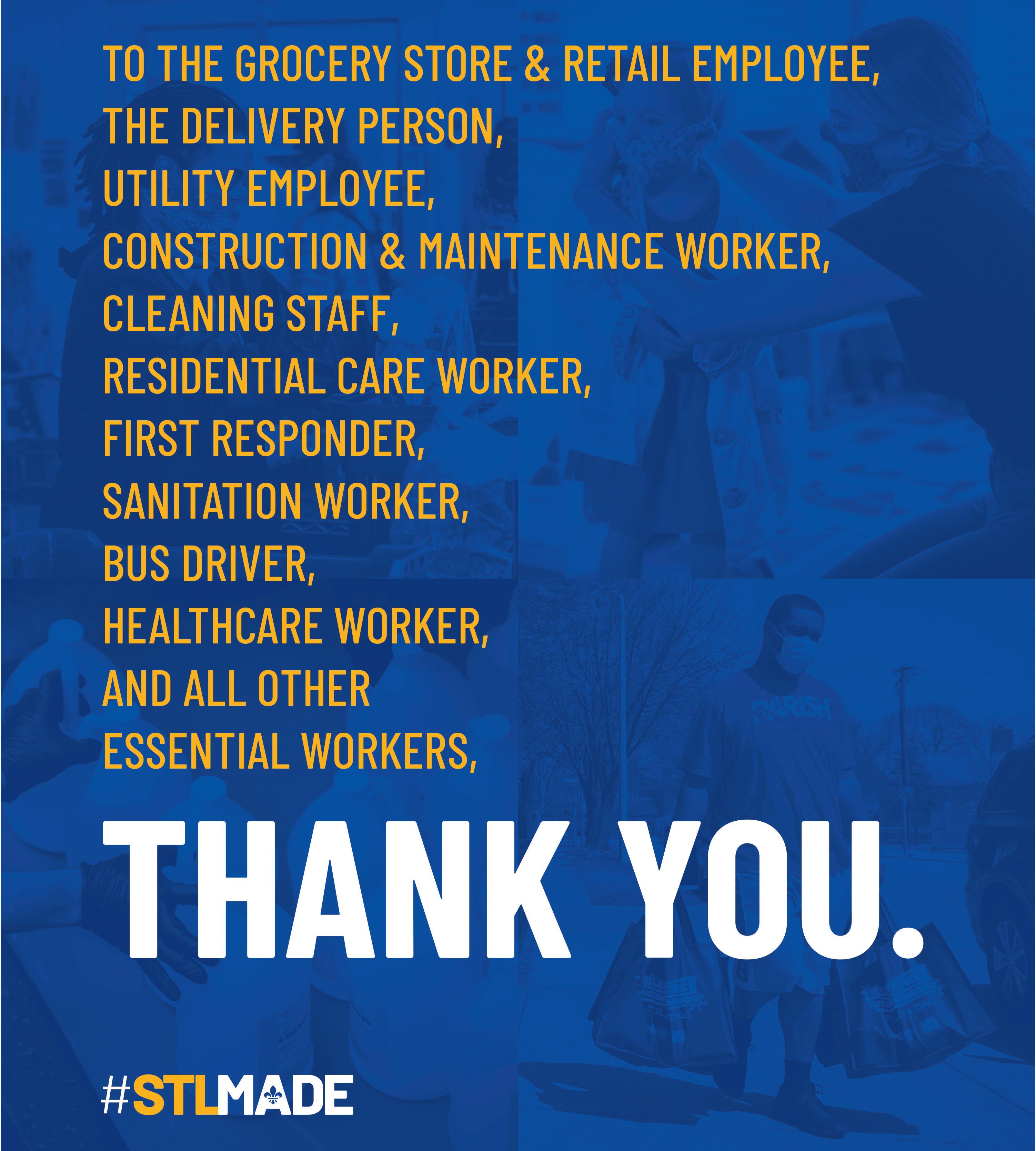
By Sandra Jordan
Church zooms forward in virtual worship after its hotel space turned into a COVID-19 hospital
Of The St. Louis American
Most churches have gone virtual with their worship services and most activities during the coronavirus pandemic or at socially distanced decreased capacity in communities that are reopening. When COVID-19 is no longer a prevalent health threat, they have physical buildings for members and friends to return to fellowship with their church families.
What is ahead for a church when COVID-19 takes over its place of worship? That has been the case for ponderance and prayer for Hands of God Ministries, which, before the pandemic, held service on Sundays at the Quality Inn in Florissant, the hotel the State of Missouri took over and turned into a COVID-19 alternate care hospital site back in early April.
“We had no knowledge that they were changing it into a hospital,” Rev. Hershwanee Lewis, pastor of Hands of God Ministries, said.
It happened so quickly that the church did not have the opportunity to remove its podium and other equipment and supplies from the hotel. Lewis heard about the switch from a member who saw it on the news one night. By the next morning, the hotel and all that was inside it were already turned over to the Missouri National Guard, which was detailed to retrofit it.
The Alternate Care site was set up by the state for COVID-19 patients to complete their recovery there and reserve space for more urgent and critical cases at the regular hospitals. The site was chosen due to the numbers of COVID-19 cases being reported in North St. Louis County.
“The alternate care site served 28 patients total, discharging the last patient May 12,” said Caty Luebbert, public information officer for the state Emergency Management Agency. “The Missouri Disaster Medical Assistance Team (MO DMAT-1) helped provide medical support alongside the Missouri National Guard while it was operational. MO DMAT-1 demobilized on May 18, and the Missouri National Guard left May 31.”
Then the hotel-turned-hospital turned back into a hotel. It has not turned back into a place of worship. Spiking numbers of new COVID-19 cases are breaking
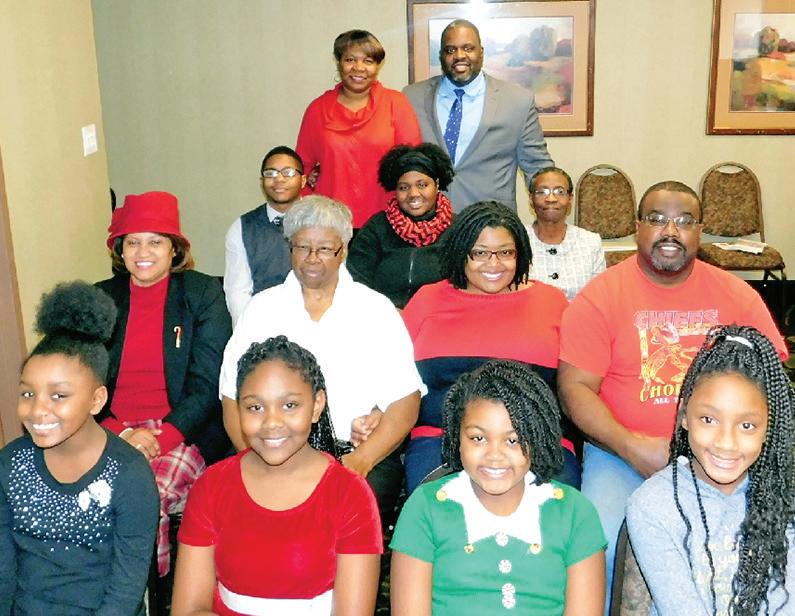
records in the St. Louis area and around the U.S., which is readjusting plans and safety precautions in all areas of life. For Hands of God Ministries, it turns out that attendance, praise and worship have increased in its virtual space – an unexpected blessing bestowed in the midst of a public health storm. First lady Traci Lewis opens Facebook watch parties for the sermons.
“On Thursday in Bible study, we talked about how much we reach people through our Facebook,” Rev. Lewis said.
The church recently received word
from the hotel that it will be back open for business in August. However, the door that abruptly closed in April brought forth a window of opportunity for the ministry.
“We are going to pray about if God wants us to move to a new facility or if we are going to be looking for a co-worship space with some other church,” Lewis said. “We are just keeping our options open right now.”
Lewis said that everyone should embrace the pandemic as an opportunity.
“I just pray that everybody stays safe and uses this time to connect with their
families, to connect more with God,” Lewis said. “This is a perfect opportunity; God is giving us an opportunity to pause in life. When have we had the whole world forced to pause, reflect and reevaluate some things? And I pray that everybody takes this time to do that.”
In addition to Sunday morning services at 10:30 a.m., Hands of God Ministries offers Thursday evening prayer at 7 p.m. via Zoom. For more information, email thehogm@yahoo.com or visit The Hands of God Ministries on Facebook.

Please explain thoroughly what you do at Schnucks Webster Groves.
I oversee the daily operations of Schnucks Webster Groves, managing a team of 115 teammates. Although store manager is a very complex job, my main goal is to nourish people’s lives.
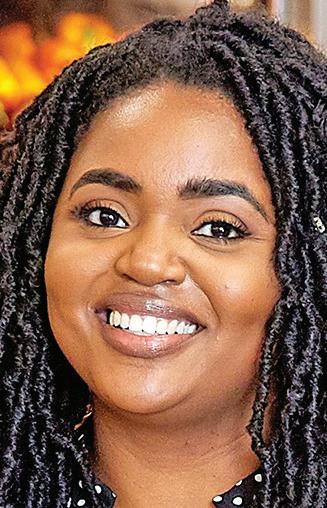
I always put Schnucks customers first by making sure everything runs smoothly for them. It’s important that customers are happy but equally important that my team is happy. I’m the first to give them credit because I could not do my job effectively without them.
I motivate my team to execute in order to be successful. We are focused on achieving sales goals, developing strategies to improve overall customer satisfaction, and optimizing profits. Everyday is different, and presents it’s own sets of challenges, so I have to be flexible while still making sure my team is delivering. I focus on ensuring high levels of customer service and maintaining great store conditions by having products that are fresh, in a store that is neat, clean and organized.
How has your day-to-day role changed since before the pandemic?
I have increased my focus on safety. Safety has certainly become more of a priority for customers and there’s a heightened level of awareness for all of us. Things change fast and often these days and myself and my team are quick to react. One of Schnucks’ core values is “trying new things” and my team is doing just that.
Schnucks stores have a check-in process and all teammates and vendors must wear masks. Schnucks has added plexiglass barriers in checklanes and service departments, and there is a COVID resource line for teammates to call and express their questions and concerns. All of my usual day-to-day tasks are still important but I have raised the bar on cleanliness, safety, and sanitation around the store. It’s important to me that everyone working and shopping at Schnucks Webster feels comfortable and Schnucks has given me and my team the tools we need to be successful in doing so.

What kind of personal satisfaction do you feel is important at work during these trying times?
My pride in my team is off the charts and they amaze me every day! They show up with smiles on their faces and give 110%. I give the credit to my team, they make my job easier during times that are undeniably challenging. As a leader it makes me proud to see the way everybody has come together as one team and embraced this new normal.
I love working in the wonderful community of Webster Groves and the customers are a dream. The way they’ve shown their appreciation has been overwhelming. They brought the Webster Groves Schnucks teammates meals, treats, thank you cards, masks, and kids have made us artwork. It’s a pleasure showing up to work every day when I get to lead an amazing team in a great community. I will be the first to tell you how blessed I am.
How have you gone “above and beyond” during these difficult times?
As the pandemic descended on us, many folks who probably never gave it much thought realized how important local grocery store workers are. I led my team during these hectic times. And I know you can’t lead from the back. I don’t ask anything of my team that I wouldn’t do myself.
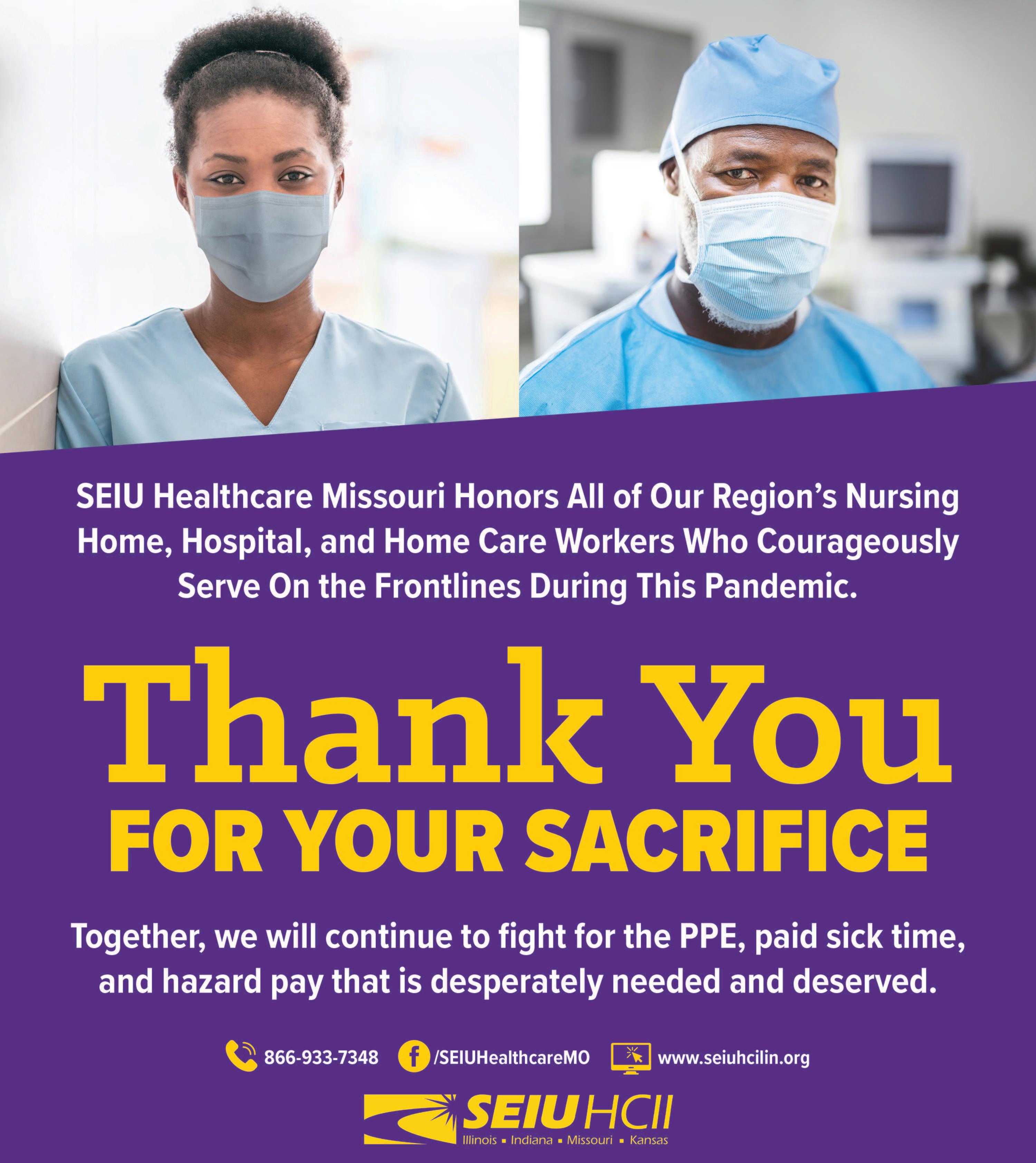
By Holly Sklar
For The St. Louis American
Every day in these hard times, grocery workers and delivery drivers, healthcare aides and cleaning staff, childcare workers and fast food cooks, go to work for $7.25 an hour, the federal minimum wage. It’s been $7.25 since July 24, 2009. That’s 11 years without an increase – the longest period in history without a raise.
Some people say we can’t raise the minimum wage now because times are hard. Well, if we hadn’t raised the minimum wage in hard times, we wouldn’t have a minimum wage to begin with.
The federal minimum wage was enacted in 1938 during the Great Depression to put a floor under wages nationally and boost the economy by increasing consumer purchasing power.
President Franklin Roosevelt called the minimum wage “an essential part of economic recovery.” He said millions
See WORKERS, page 15
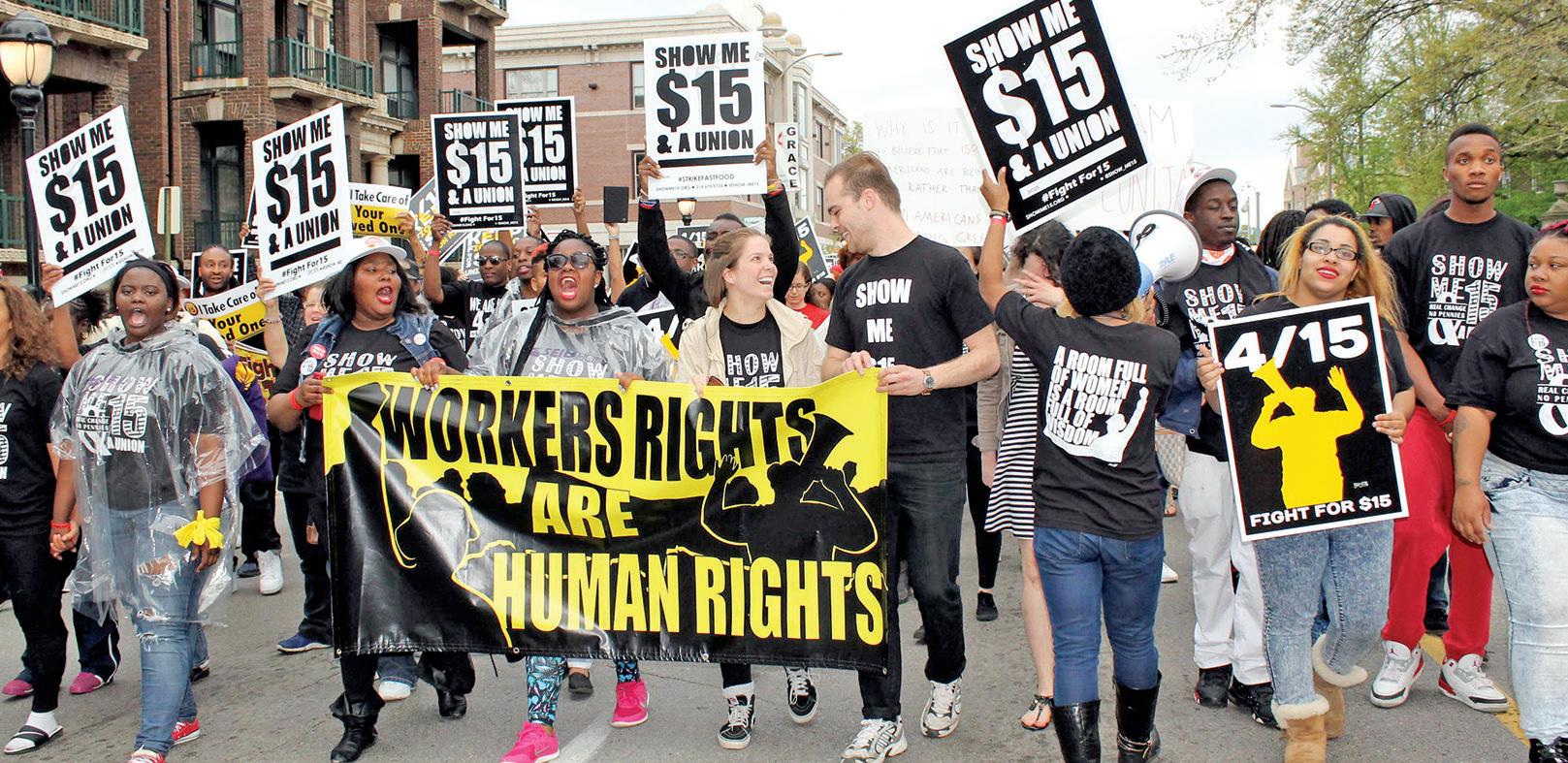


Customer Service Manager DeMorris Taylor at work in Schnucks Cross Keys. Taylor has worked for Schnucks for 24 years.
Please explain thoroughly what you do for Schnucks Markets?
Customer service is my main focus at Schnucks Cross Keys. I coach my teammates to achieve total satisfaction from each and every customer. I teach my teammates how to “WOW” a customer. My goal is that no one leaves my store unsatisfied.
How has this your day-to-day role
changed since before the pandemic?
My role has changed dramatically. While teammate safety is always a priority, it is now a part of everything that I do. I make my teammates aware of their safety by making sure they are wearing their masks the proper way, washing their hands often,
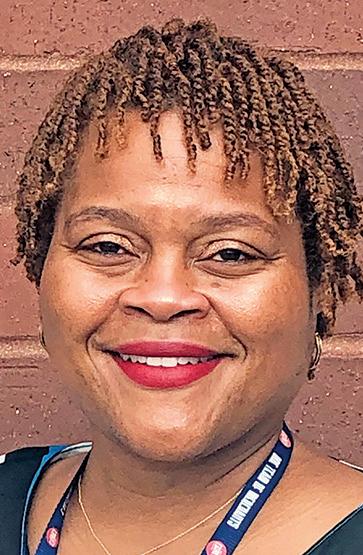
DeMorris Taylor
wearing gloves, and keeping the surroundings sanitized. While doing all of this, I also continue focusing on waiting on our customers in a timely matter so that they are not standing in long lines. I also listen and talk more to customers highlighting the many actions Schnucks is taking to help ensure a safe shopping environment.
What kind of personal satisfaction do you feel at work during these trying times?
I take pride in the fact that I work for a company that is so concerned about the health and wellbeing of my teammates. I am committed to properly training teammates about the proper safety procedures that help keep them safe and well.
Behind the camera, on the frontlines of a pandemic
By Kenya Vaughn Of The St. Louis American
For more than 40 years, Wiley Price has been documenting Black St. Louis history in real time. Experience has given him a keen sense of knowing which frames from his constant companions –a pair of Nikon cameras that typically dangle from each shoulder – will have significance.
He’s seen it all. And has the photos to prove it. But nothing could have prepared him for how the logistics of his life’s work would change due to a global pandemic.
“I knew I would have to be out there,” Price said. “Because the role of The St. Louis American – and what the community has come to expect from us – is to tell our story within the story. In order to tell that story, the stay-at-home orders that we were given couldn’t possibly apply to me.”
In mid-March, he started self-deploying by driving across busy intersections and through historically Black neighborhoods to photograph residents in their environments.
“When you are a photographer, your job is to be on site,” Price said. “You can’t take a picture through a phone. There is no way around it. I’m not a portrait photographer or someone who shoots objects on a table. I shoot people for a living. When is the last time I took a picture and somebody wasn’t in it?”
He wanted to use his photographs to counter the narrative that Black people weren’t taking the pandemic seriously. He anticipated taking pictures of people with masks and gloves on walking down the street, at bus stops and going about their day-to-day routines in full protective gear. Instead, the busy streets usually known for hustle and bustle were like dirt roads in ghost towns.
“That first day when they really asked everybody to stay home, I was driving down Tucker into downtown from the South Side,” Price said. “It felt like it was Sunday morning, and it was a weekday.”
That’s when it hit Price that he was about to document history yet again.
“It was like, ‘This is really happening,’” Price said. “I have never used Grand or Kingshighway as much as since COVID happened, because there had been nobody in the streets. And every day those first few weeks felt like a major holiday on Highway 40.”
Empty streets don’t necessarily make for compelling front-page standalone photos.
Initially, the Black people he saw that were brave enough to come outside were
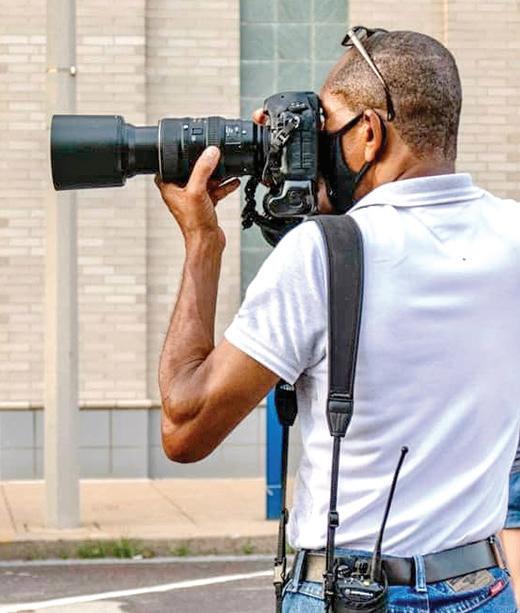
reckless enough to not cover up.
“That first month was a struggle,” Price said, even though he was relentless enough to consistently give people a visual of the new normal in response to COVID-19.
The turning point came one afternoon when he was riding through the Ville. He saw a teenager sitting on a wall with a mask on maneuvering his cell phone with blue surgical gloves.
“It was about the time when older black people started to rumble about younger black people not taking this seriously,” Price said. “I ran across this kid. He might have been 16 years old and went to Sumner. I practically wrecked my car to swing back around a whole city block to find this kid again to get this picture.”
The boy admitted to Price that his classmates and friends had been teasing him about his masks and gloves. “He told me, ‘I really think we need to do this,’”
Price said. “I said, ‘You are right – and you are a special kind of person.’” He submitted the photo in the hopes that other young people would see the teen and follow suit.
“That was my whole point in going out every day early on,” Price said.
He wanted to let people know this is something they need to be taking seriously by showing other people doing what they need to do to protect themselves from the virus as they went about their daily lives.
“I felt like a medical worker in that way,” Price said. “Like my job is to be there with the people – no matter what –and to help build awareness, but through photos.”
He tries to stay as safe as he possibly can while on assignments, but Price knows that there are no guarantees.
“And at 64, I’m not fooling myself,” Price said. “I’m in good physical shape to be 64. But I’ve never said to myself, ‘I don’t think you can catch this.’ This thing really scares me, because this is not about being in shape. You can’t fight off the virus just by being in shape. The virus is what it is – and it will come and get you.”
He took the COVID-19 test back in May; it came back negative. But when it comes to human contact, he operates as if he could be carrying the virus. Price wears two masks, carries hand sanitizer in the gear belt that holds his spare lenses and batteries, and washes his hands incessantly throughout the day.
“I am truly convinced that this virus can reach anyone,” Price said. He has disinfectant spray in his car and every time he gets in, he sprays his hands and wipes them down.
Price will be taking another COVID19 test next week.
Precautions as he continues to go out and shoot have come at a cost to his family life. “I told my sons that I won’t be seeing the grandkids for a while,” Price said. He has only seen his three grandchildren once in nearly five months. He stopped by recently when the family celebrated his youngest grandson’s first birthday with a socially distant party. His 10-year-old grandson came running up to him. When the boy got within an arm’s length, Price stepped back. “Paw-paw, I can’t have a hug?” his grandson asked, according to Price. “I said, ‘I’m sorry, Trent, but I have to be socially distant.’”
It broke his heart to reject the physical affection of his grandson, but even the thought of infecting his grandson felt far worse.
“I would be blaming myself for that,” Price said. “Because I know as much as I am everywhere all the time for work, he would have caught it from me. I take it very seriously.”
Those aware of his service to the Black community through his profession have voiced their concern for him.
“Every day, somebody says to me, ‘Please be careful out there because you are always out,’” Price said. “Even strangers, come up and say, ‘I don’t know you, but I see you all the time. Please be careful.’”
Price feels like this is the community’s way of expressing how much they value his work and The American as a news organization that constantly advocates for them.
“That is uplifting for me,” Price said, “because the people who truly get what I do know that right now I’m walking around in harm’s way.”
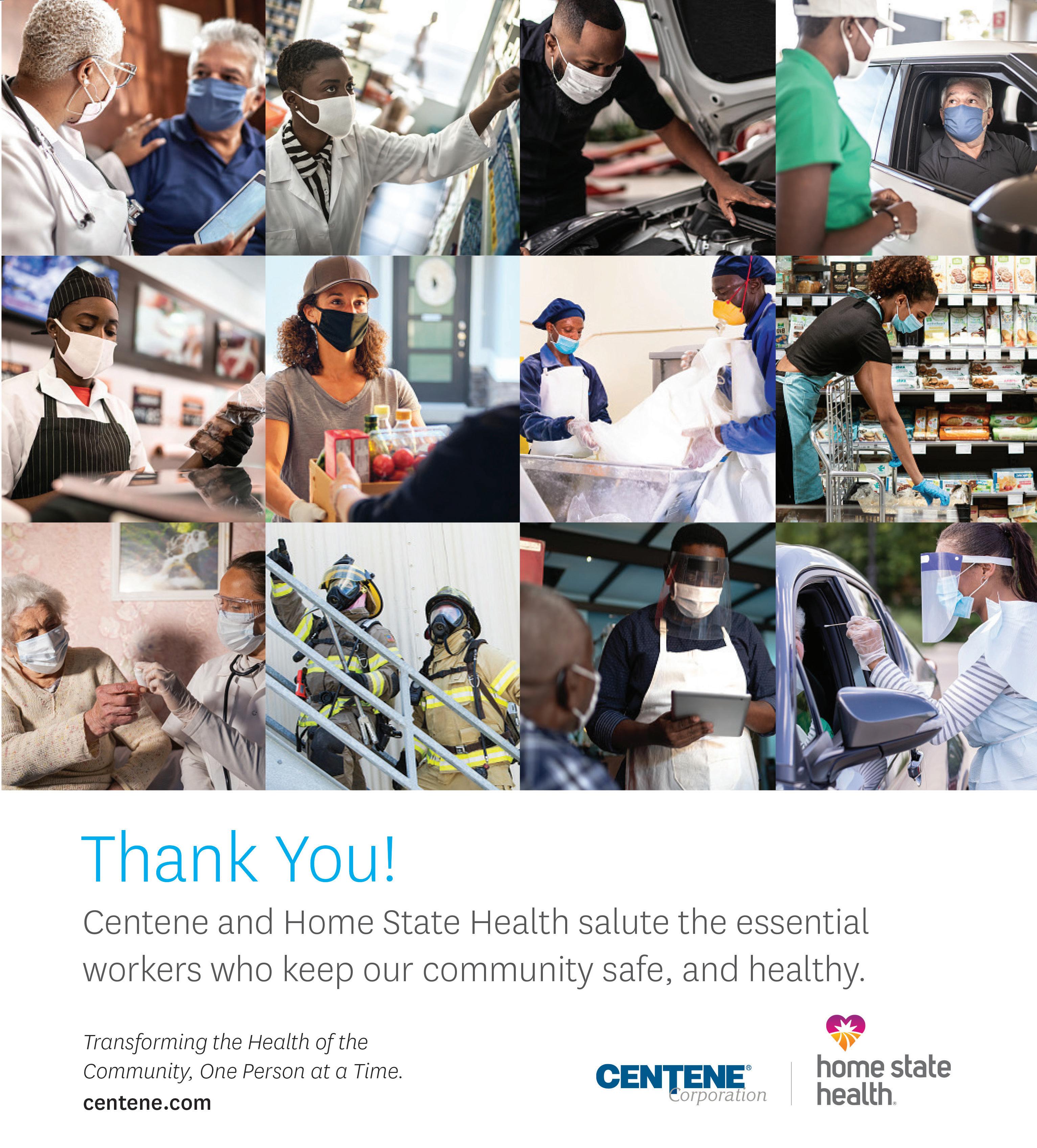
What do you do?
I am a Cook at Crestwood Health Care Center and my role involves preparing meals and desserts for my nursing home residents that cater to their special dietary needs, as well as monitoring food temperature, and assisting with food service. I also serve as our Head Shop Steward through my union, SEIU Healthcare Missouri, which means I work to enforce our union contract and labor law, in addition to fighting for equality on the job for all of my coworkers. Everyone knows when I wear my union bag, I mean business!
How has your day-to-day role changed since before the pandemic?
My day-to-day role has always consisted of sanitation. However, during the pandemic, the need for sanitation has increased rapidly and hand washing and glove use is more important than ever before, especially in meal preparation. It’s critical that I maintain a clean working environment, wear proper PPE, and do my best to stay six feet apart from coworkers even though we work in a small kitchen.
What kind of personal satisfaction do you feel at work during these trying times?
With new policies and procedures that the CDC has put in place, work can feel more demanding than before. Nonetheless, I get personal satisfaction knowing that the hard work from my coworkers and I is not in vain. Our facility has not had one positive COVID-19 case so far and we hope to stay on that path moving forward. I also feel very grateful to have my job during this pandemic so I can continue to cater to my awesome residents, continue to enforce my union contract, and return home to my family each night knowing that I am coming from a COVID-free facility.
How have literally gone “above and beyond” during these difficult times?
During this difficult time, I have continued to faithfully serve my residents and I have continued my activism through my union. I’ve led a campaign at my nursing home for hazard pay and paid sick time in the event that coworkers
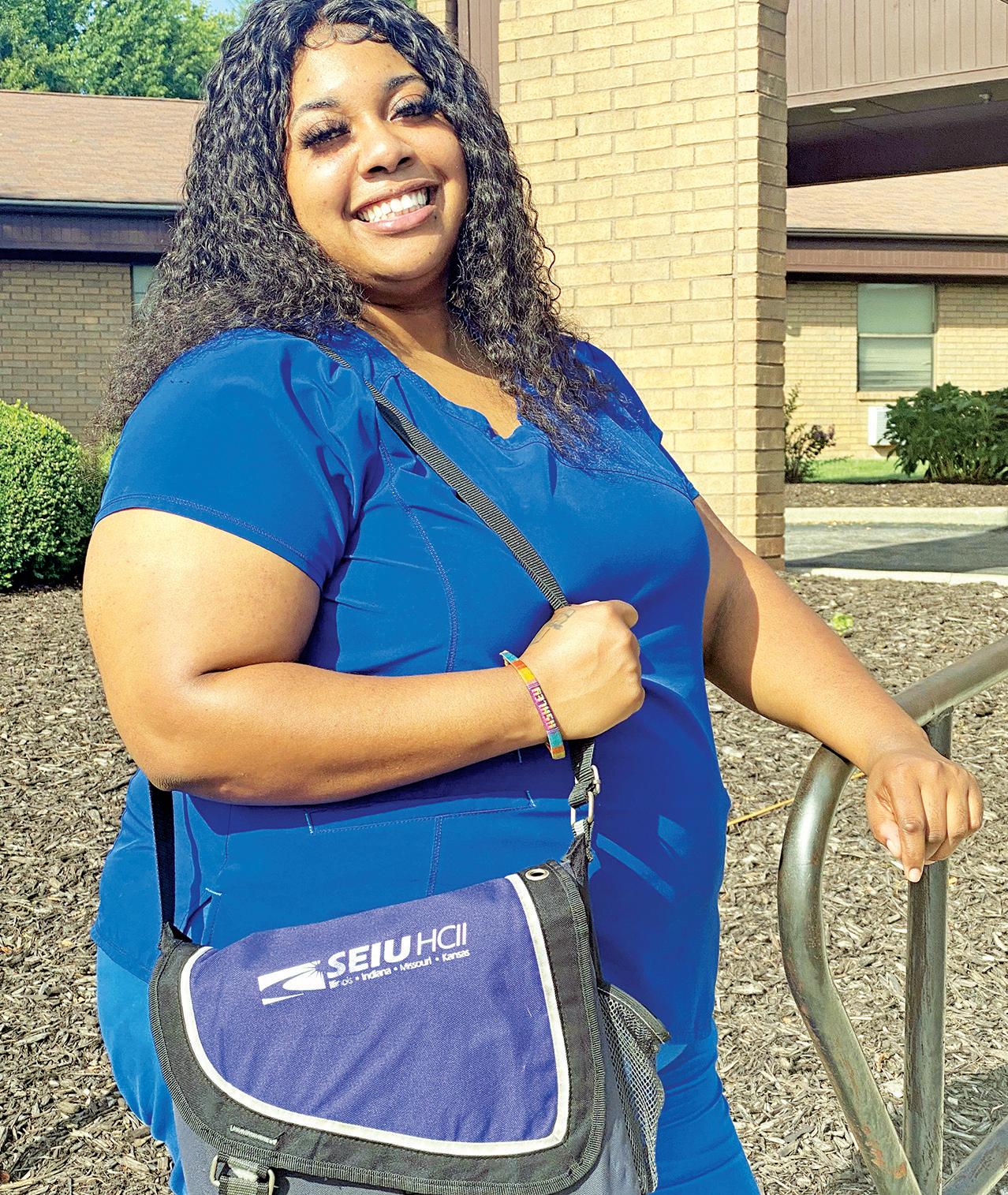
need to quarantine due to exposure to the virus. I’ve also stood in solidarity with the successful Close the Workhouse campaign. In addition, I recently hosted the first-ever voter registration drive at my workplace and helped spread the word about the importance of voting yes on Amendment 2 in the August 4 election to expand Medicaid in Missouri.
It’s time for us to stop waiting for a hero and to save ourselves because those
of us working in healthcare right now are essential superheroes - I truly believe that!
Why was this person nominated/singled out by management/a colleague at your business?
SEIU Healthcare Missouri nominated Ashley Mosley for recognition because she is a tireless advocate on behalf of
her coworkers and residents. She works hard every day to keep those at her nursing home safe and healthy by helping to maintain a COVID free environment, she fights for the rights of her fellow nursing home workers, and she spends her free time advocating for reforms that will improve our wider community. We are so proud that Ashely Mosley is a member and leader in our union and an activist in our city.

By Jackie Tischler Of BJC HealthCare
During the COVID-19 pandemic, doctors, nurses and other frontline practitioners who provide direct care to patients have been recognized and praised as “Hometown Heroes” — and rightfully so. But, in addition to these caregivers — behind the scenes in our local hospitals, nursing homes and health care facilities — are countless employees who are essential to the care and safety of our patients, their families and our community. And although they might not find themselves in the spotlight, their roles are recognized as the backbone of patient care.
Who are these unsung essential health care workers who courageously serve our communities during these uncertain times?
Their contributions include housekeeping, food service, patient care support, security, home health care, administration, and dozens of other essential health care positions. They work alongside doctors and nurses in providing direct and indirect support of those in need of care.
These hardworking unsung heroes keep our health care facilities clean, our patients well fed and cared for, our facilities staffed effectively, and our operations running smoothly and efficiently. They work with pride and dedication, with a smile behind their masks.
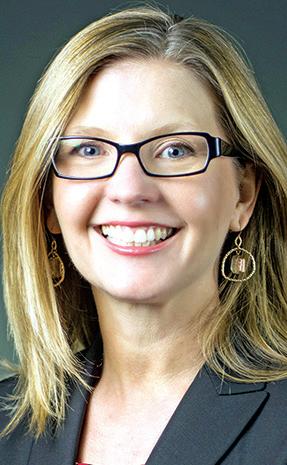
To each and every one of you, we owe a huge THANK YOU! We are proud of your strength and courage. And we real-
ize that during these difficult times, your work has never been more important to health care providers in the St. Louis metropolitan area. While weathering the COVID-19 pandemic, you’ve put the health and safety of patients above all else.
You, too, are our “Hometown Heroes.”
Thank you also to the unsung essential workers in other fields and industries throughout our region. Thank you to those who stock our grocery shelves, pick up our trash and recyclables, transport our goods, deliver our food, and maintain our buildings and roads.
To all of you who put yourselves at
n Their contributions include housekeeping, food service, patient care support, security, home health care, administration, and dozens of other essential health care positions.
risk to provide for the well-being of our community, we extend our deepest gratitude.
Jackie Tischler is senior vice president and chief people officer at BJC HealthCare.

By Sylvester Brown Jr.
For The St. Louis American
This story was produced in partnership with the Pulitzer Center.
The past few months have been challenging for Nabali Khaled Salameh and his business, Mike Salameh Crown Plaza. He had built the business from the ground up about 11 years ago on the corners of Cass Avenue and 13th Street. The plaza’s biggest draw is an ExxonMobil Franchise. Khaled promotes other services in red block letters: CAR WASH, FOOD MART, PKG LIQUOR, SALAMA BEAUTY and CELL PHONES. The only corporate logo affixed to the tan and white building is a “Metro PCS” sign.
Business was good until early March when COVID-19 was declared a pandemic in the United States. Back then, Khaled feared he’d have to shutter the plaza. He even ordered 50 sheets of plywood. This was around the time Gov. Mike Parson issued a statewide stay-at-home order to slow the spread of the virus. Missouri’s order was going last to at least April 24, Parsons said.
Khaled grappled with the decision to close but instead decided to tough it out. Now, four months later, he’s telling his customers that only a limited amount of them are allowed in the stores at one time and all must wear face masks.
Although no one in Khaled’s immediate family had contracted the virus, he takes the threat seriously. The plywood was not only for the businesses in the plaza but also for his other enterprise on St. Louis Avenue and North Kingshighway. Khaled has more than 10 employees at the 13th Street plaza alone. Closing would dramatically affect their livelihoods. But he had to also consider the well-being of his many customers who, he says, “know me more than I know them.”
In the pre-corona days, the plaza, with its all-day, all-night gas and food mart was always popping. The food mart is a place where people without bank accounts can pay utility bills, buy money orders or cash paychecks. The parking lot still serves as a gathering place of sorts for customers of the various businesses. On the weekends, a vendor serves cooked-on-the-spot hot dogs, hamburgers and smoked turkey legs from a smoker. As a frequent customer, I became extra careful – wearing a mask, sanitizing my

hands and keeping space between myself and other customers – when the virus started to spread. It seemed that not everyone visiting the plaza shared my fear of contracting the virus.
Mike Salameh Plaza is in my neighborhood, Old North, located in the 63106 ZIP code. I’m one of the storytellers for Before Ferguson Beyond Ferguson’s “63106 Project.” According to Washington University and Saint Louis University’s “For the Sake of All report,” 63106 ranks at the bottom of all ZIP codes in the region in terms of social and economic factors and health disparities. Of its almost 12,000 residents, 50% live below the poverty line, with 70% of the residents renting property. The area, which also includes the Carr Square, Columbus Square, JeffVanderLou and St. Louis Place neighborhoods is almost entirely (94.8%) Black. The mission for the “63106 Project” is to tell stories of this vulnerable population as they struggle through this pandemic.
For me, the plaza serves as a case study of upended social and business norms in a crippled economy. It also represents the challenges that the pandemic has on a business that is indeed essential to a fragile community.
Before Greenleaf Market opened on North 13th Street last year, the area
had not had a major grocery store since Schnuck Markets closed its 1030 Cass Ave. store 20 years ago. For many, the plaza, with its array of fast food, grocery items, off-the-shelf medicines, lottery tickets and alcoholic beverages, fills a void.
Knowing your customers is key to success, Khaled said, especially in the competitive gas and convenience store market.
“You have to know what people need or they’ll go someplace else,” he said. “If customer service is bad, they’ll go to another place. It’s that’s simple.”
Khaled, 56, lives in Wildwood but has operated or owned businesses in 63106 for 30 years. He said he can relate with the circumstances of many of his low-income customers. He said he was born and raised in a refugee camp in Palestine. Some of his family still live there. Poverty, the lack of job opportunities, health disparities and life in cramped, bland settlement houses are all familiar terrain.
“As a Palestinian, we had a lot of the same problems,” Khaled said. “I share a lot of the values and experiences with the people of this neighborhood.”
Khaled’s uncle on his father’s side, Sam Salameh, migrated to America in the 1970s. Salameh regaled the family back
home with tales of unlimited opportunity in this country. It had a profound impact on Khaled.
“I was about five years old when my uncle came to America, so I grew up hearing about him, how he was living and what he was doing,” he said. “So, after I graduated from high school, I was determined to come to America.”
Khaled and his wife arrived in 1990 and started a family. He immediately went to work with his uncle at his convenience store on 13th Street less than a mile from the old Pruitt-Igoe housing project site. The building is now Salama Motors, a used car place. Under Salameh’s tutelage, he learned how to manage and operate businesses in underserved neighborhoods. It took him about 20 years but, “lots of hard work” and five kids (three boys and two girls) later, Khaled started his own venture. His sons work at the plaza. His eldest daughter is married, and his youngest daughter is a junior at Saint Louis University.
Khaled’s decision to ride out the contagion storm was aided by brochures and other material that ExxonMobil provided franchise owners about operating during a pandemic. He’s relied heavily on corporate support and his faith:
“Muslims believe that if you are thankful for the bounties and good health that God has blessed you with, you will receive more,” Khaled said. “When hardships happen, be patient and thankful and Allah will bless you, too.”
During the pandemic, his business could even be described as robust.
Muhammad Khalid Salameh, at 26 years old Khalid’s youngest son, said that they do their best to protect the health of customers and employees by limiting how many people can come inside the store at one time.
Just when he thought the worst was over, the coronavirus resurged. Because of the resurgence, St. Louis City and County issued new orders requiring people to wear face masks in public.
Khaled said he surrendered to the notion of taking things “day by day, hour by hour.”
This story is part of “The 63106 Project,” which is sharing the stories of people coping with the pandemic in St. Louis’ most vulnerable neighborhoods. An archive of stories in the series is available at beforefergusonbeyondferguson.com.
continued from page 7
of workers “receive pay so low that they have little buying power. Aside from the undoubted fact that they thereby suffer great human hardship, they are unable to buy adequate food and shelter, to maintain health or to buy their share of manufactured goods.”
The minimum wage reached its high point in buying power back in 1968, when it was worth $12.06 in today’s dollars, according to the U.S. Bureau of Labor Statistics Inflation Calculator.
Minimum wage increases have been too little, too late to keep up with the rising cost of living, much less provide workers a fair share of economic growth since the 1960s.
The federal minimum wage amounts to just $15,080 a year for full-time work. Millions of people working for low pay at the minimum wage and above it couldn’t make ends meet even
before the COVID-19 pandemic hit.
Local businesses depend on local customers who make enough to buy what they are selling – from food and clothes to haircuts and car repairs. Raising the minimum wage will give needed raises to workers who will then have more to spend as customers.
Consumer spending makes up about 70% of our economy. Raising pay at the bottom is a very efficient way to lift the economy since it puts money in the pockets of people who most need to spend it.
businesses like mine if they don’t have it, which is why raising the minimum wage is all the more important now,” says Michael O’Connor, a barbershop owner in Pennsylvania, where the minimum wage is still $7.25.
n Every day in these hard times, grocery workers and delivery drivers, healthcare aides and cleaning staff, childcare workers and fast food cooks, go to work for $7.25 an hour.
Many businesses support raising the minimum wage. They have seen the benefits of higher pay in lower worker turnover, reduced hiring and training costs, lower error rates, increased productivity and greater customer satisfaction. They know it will increase consumer spending and help level the playing field.
“People can’t spend money at local
Keeping the minimum wage stuck in the past will not help small businesses compete with big businesses during and after this pandemic. Costco, Amazon and Target already pay a $15 minimum wage throughout the country.
If small businesses are to survive and grow, they will need employees who want to work for them and customers who want to buy from them –whether they are ordering for delivery or coming in the store. Decent wages and good customer service will be even more crucial.
We can’t say we value people’s work and not pay them enough to live on.
The U.S. House of Representatives passed the Raise the Wage Act in 2019,
which would gradually increase the federal minimum wage to $15 by 2025. That gives businesses five years to phase in a wage that Costco, Target, Amazon, Organic Valley, Dr. Bronner’s, Illegal Pete’s restaurants, ECOS, Room & Board, and many other businesses large and small already pay or surpass today.
It’s time for action in the Senate – and for more action in the states.
We’re in a generation-defining crisis. Raising the minimum wage is essential – along with measures such as grants to small businesses to make it through the pandemic and increased government purchasing from small businesses going forward.
Working together we can save lives, save livelihoods and build a shared recovery.
Holly Sklar is the CEO of Business for a Fair Minimum Wage, a national network of business owners and executives who believe a fair minimum wage makes good business sense. www.businessforafairminimumwage.org.

